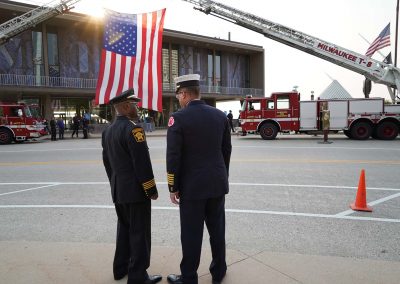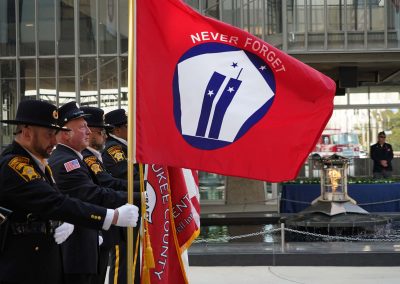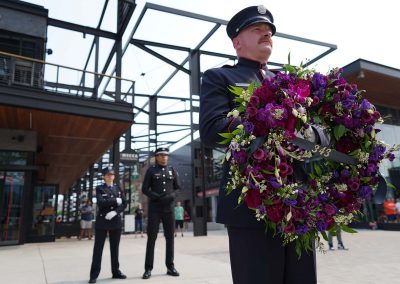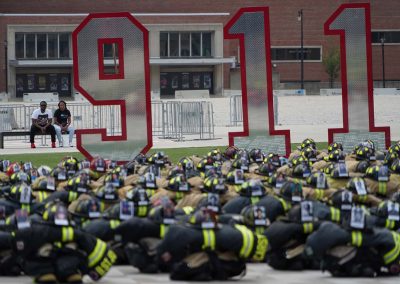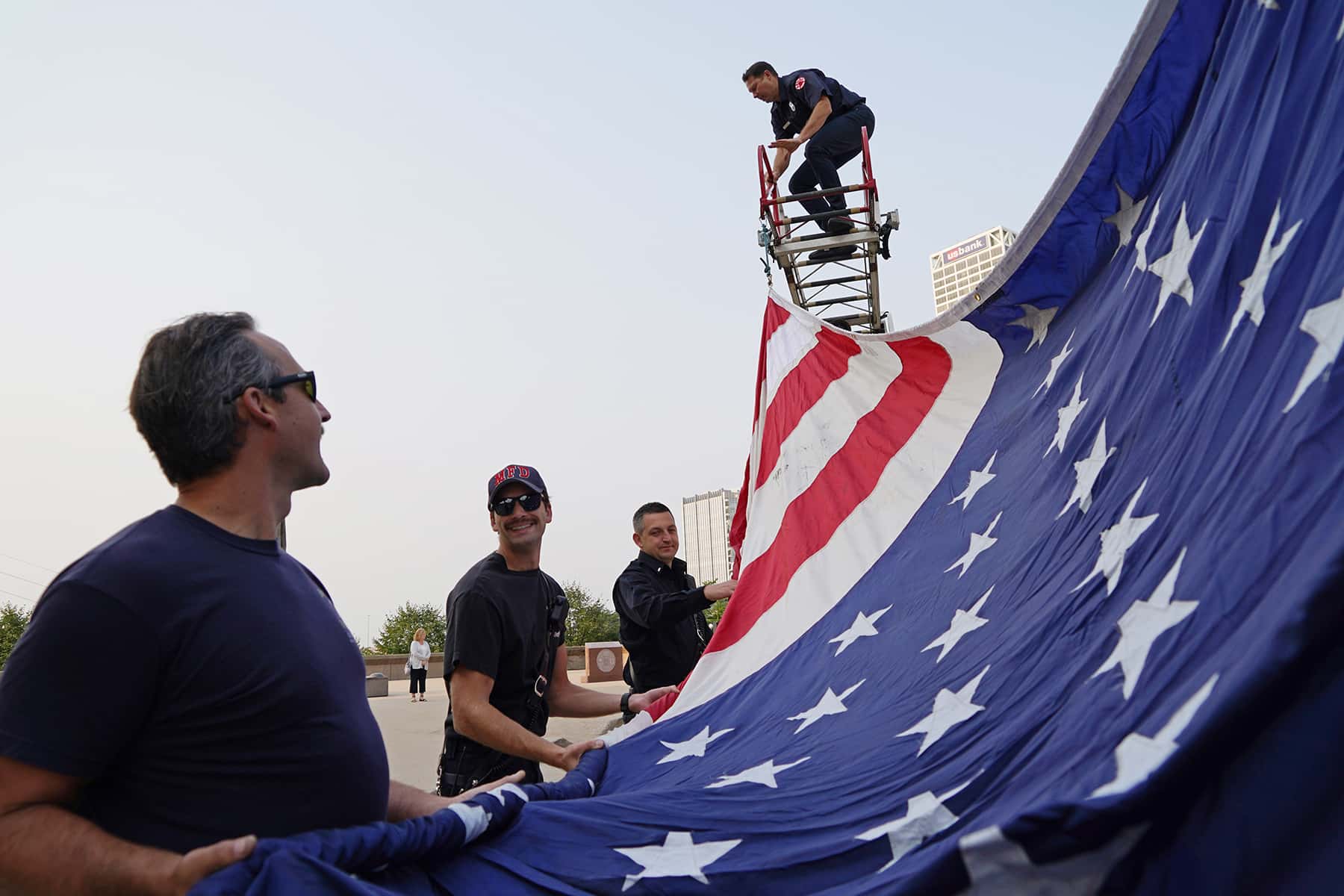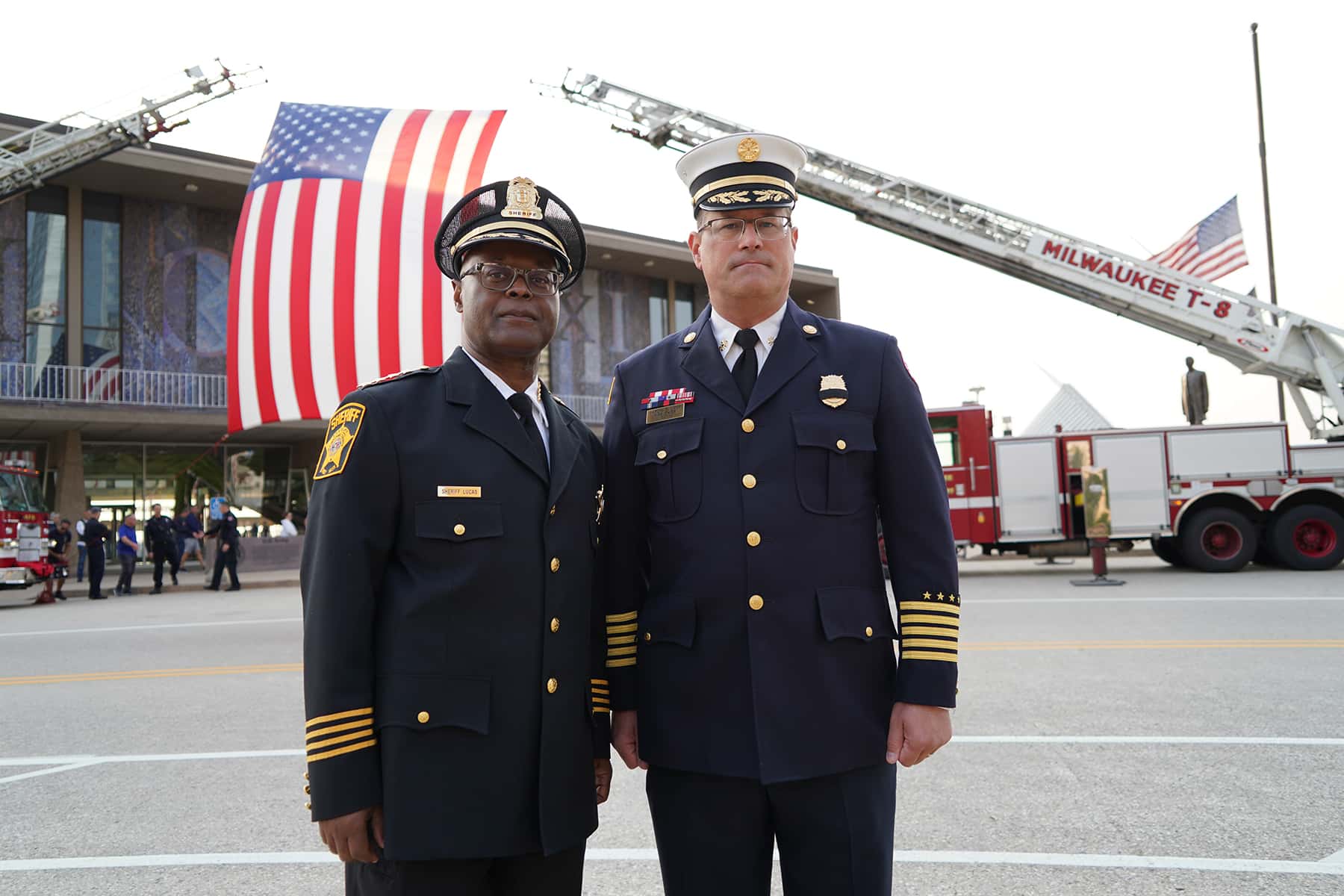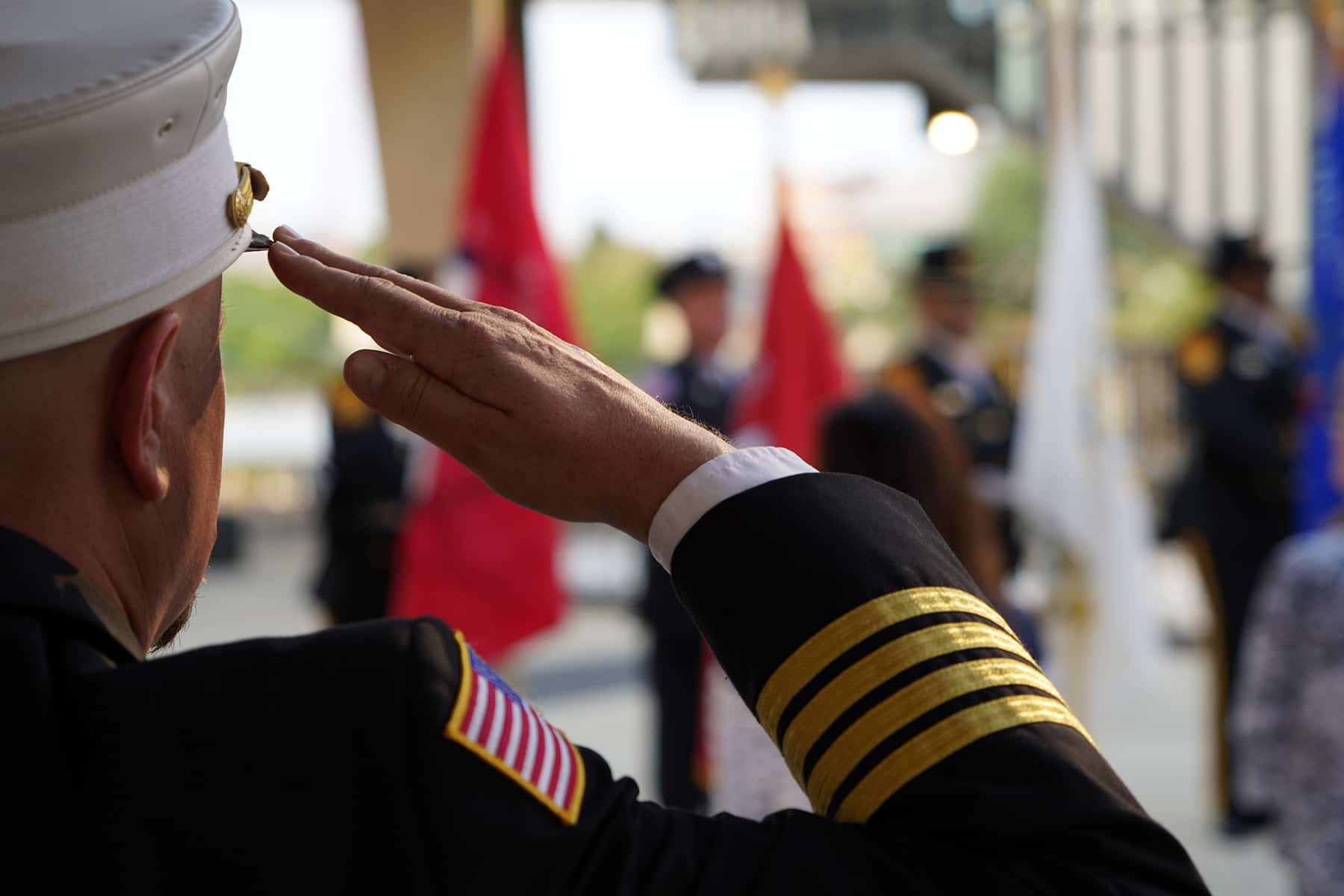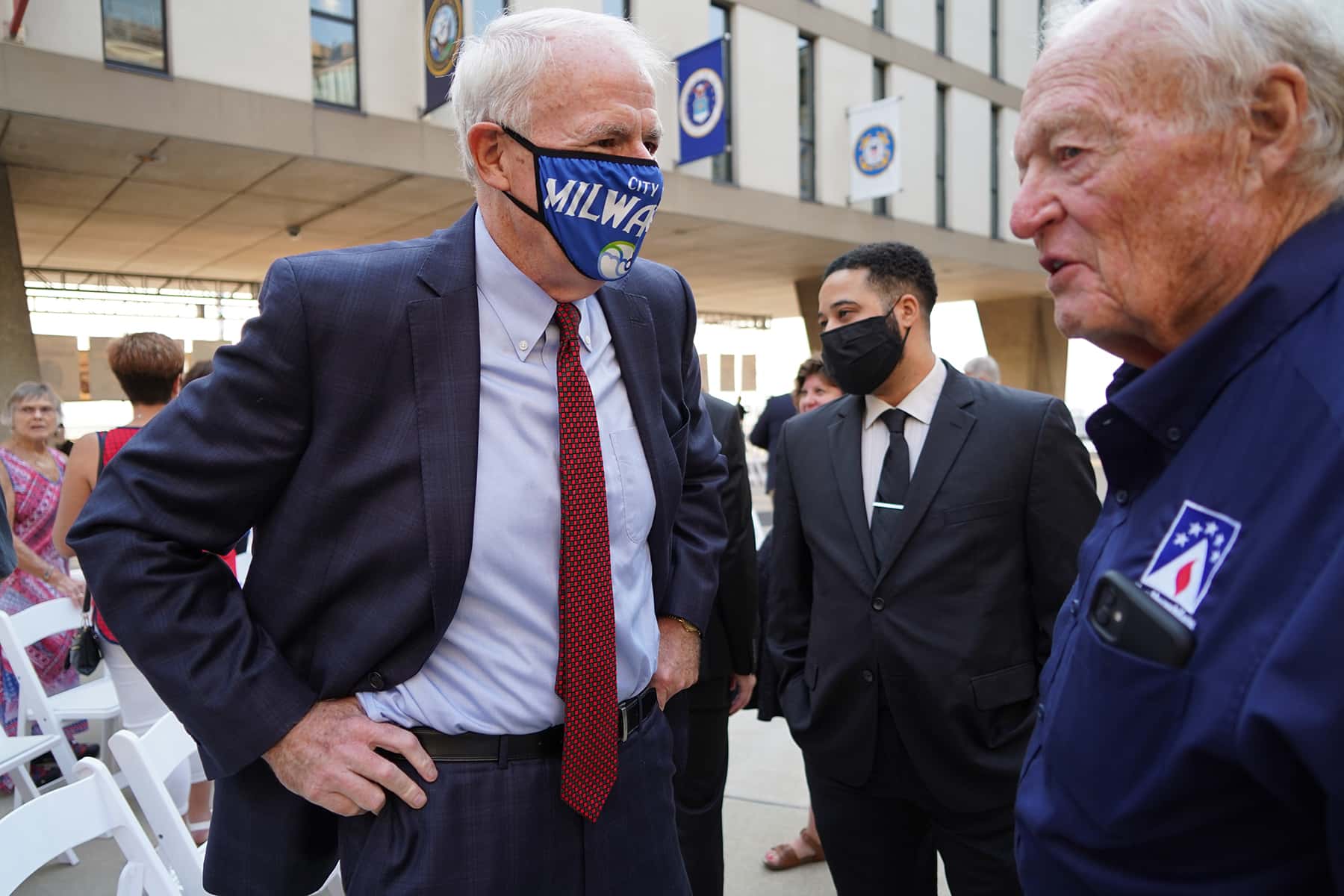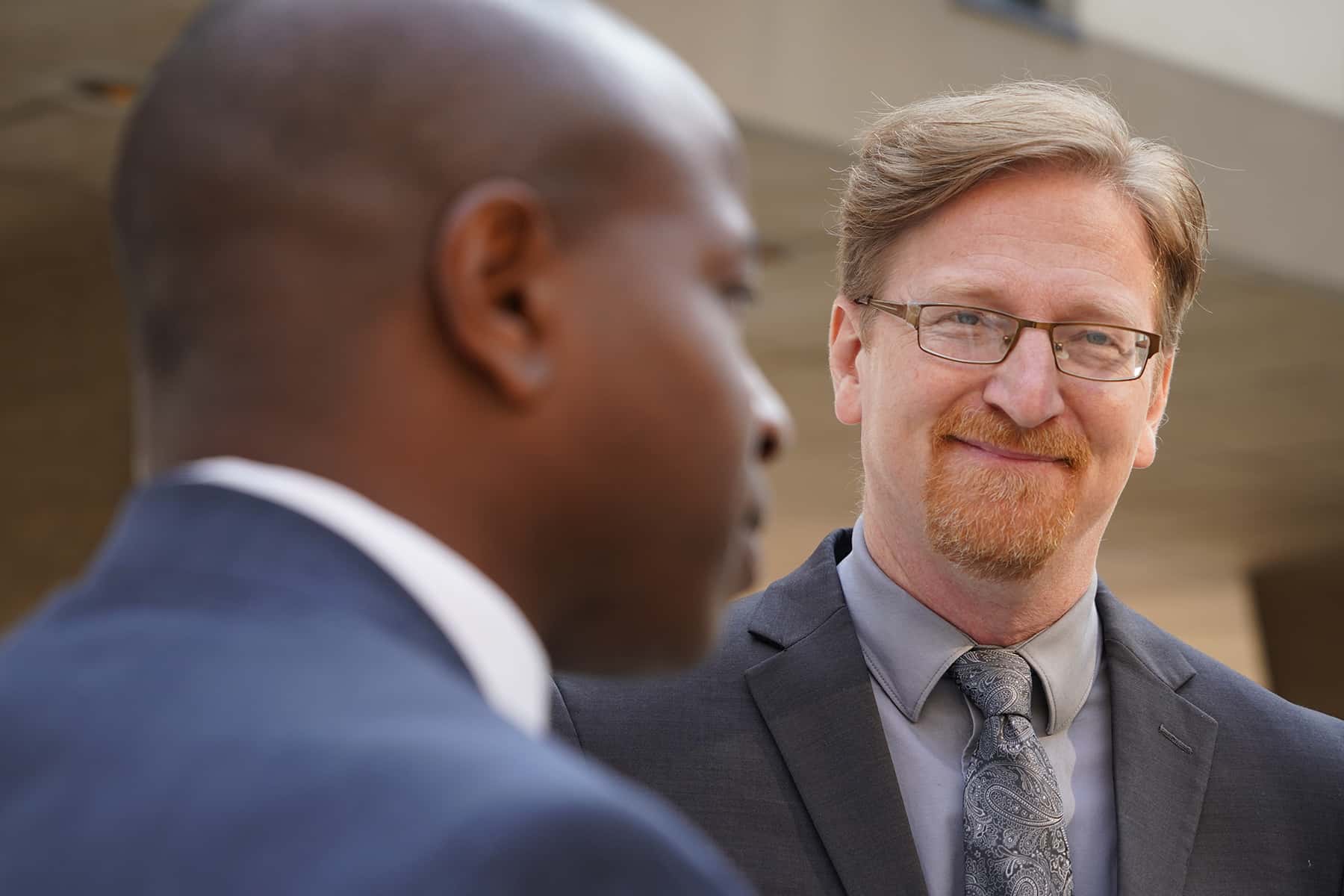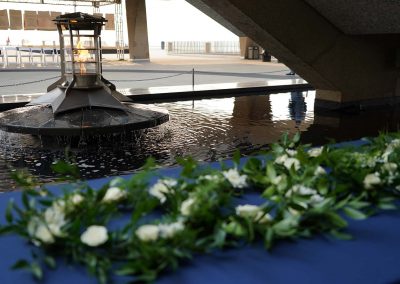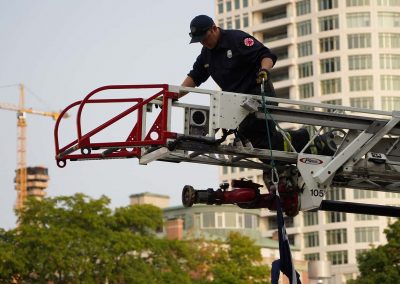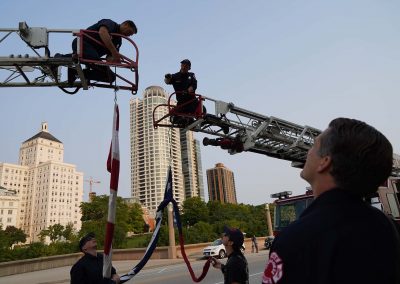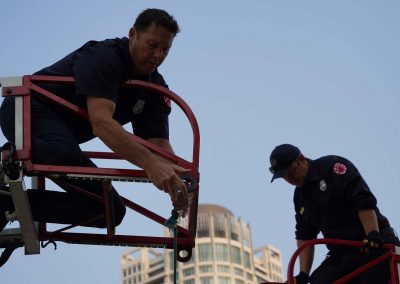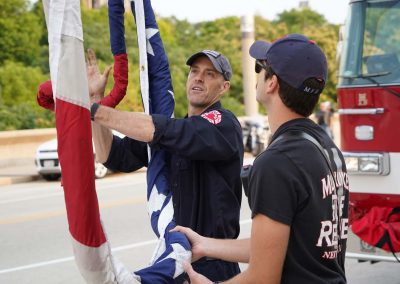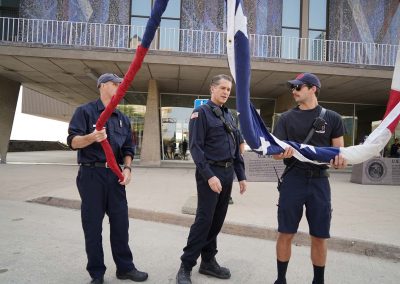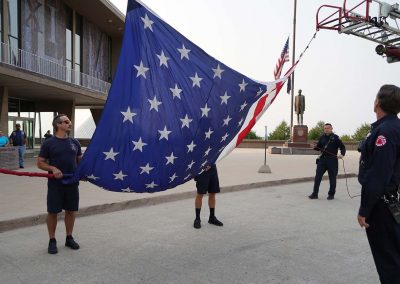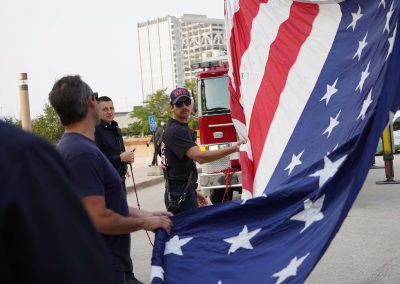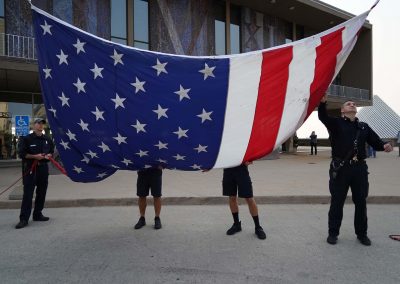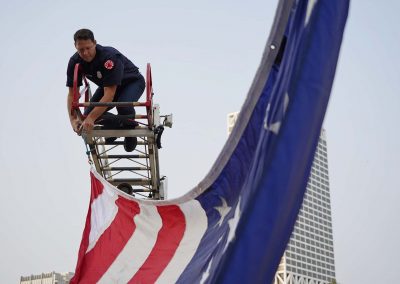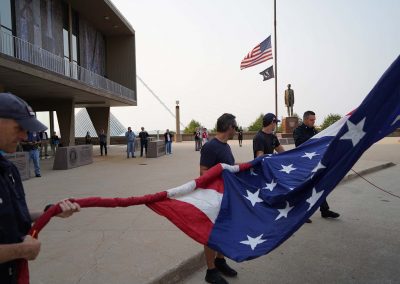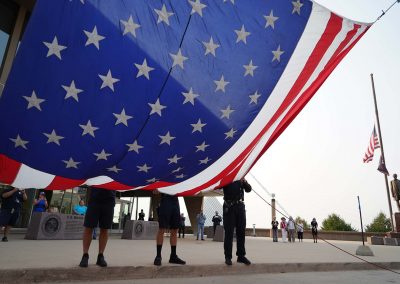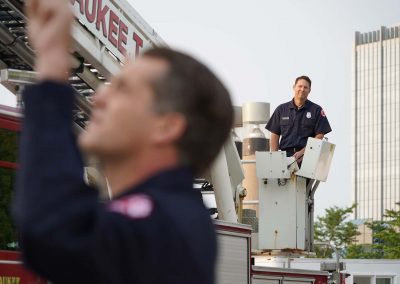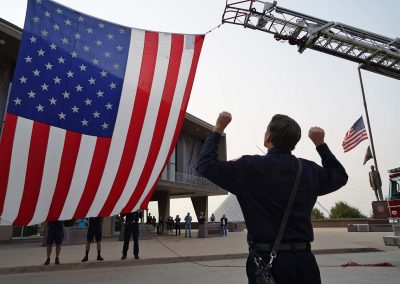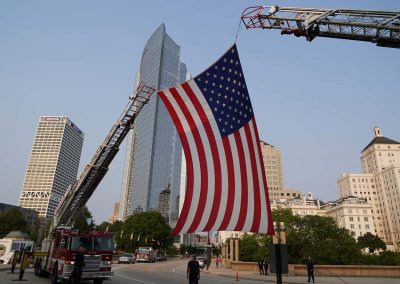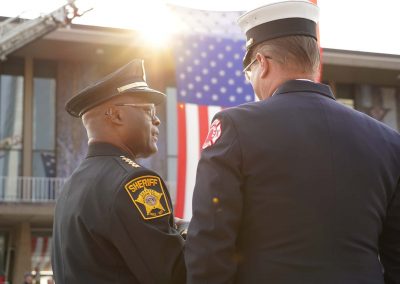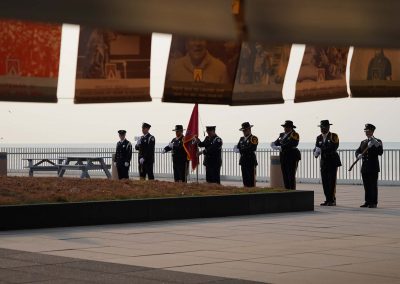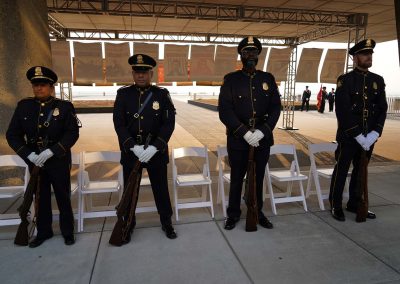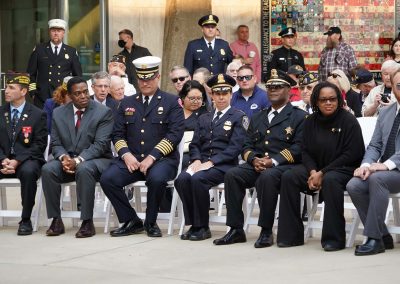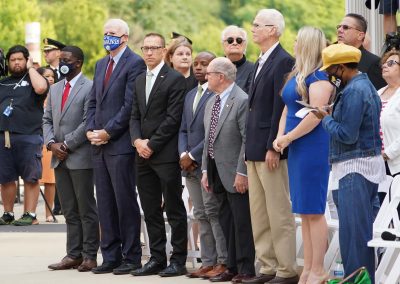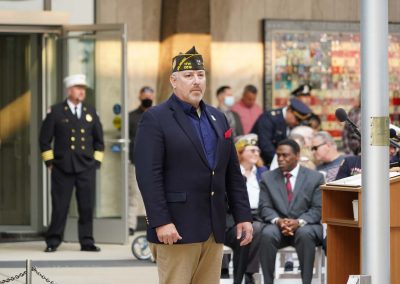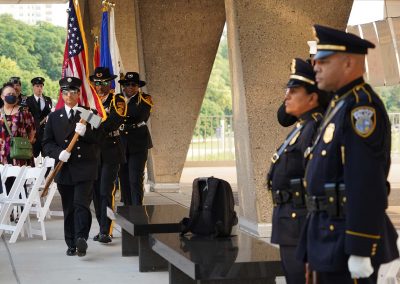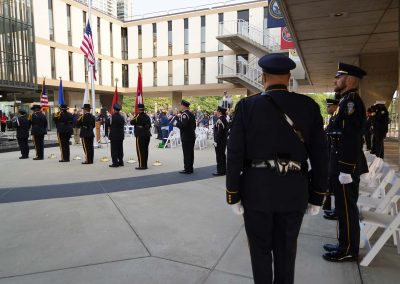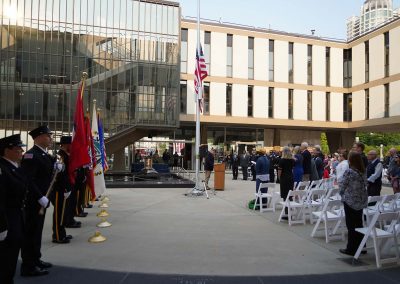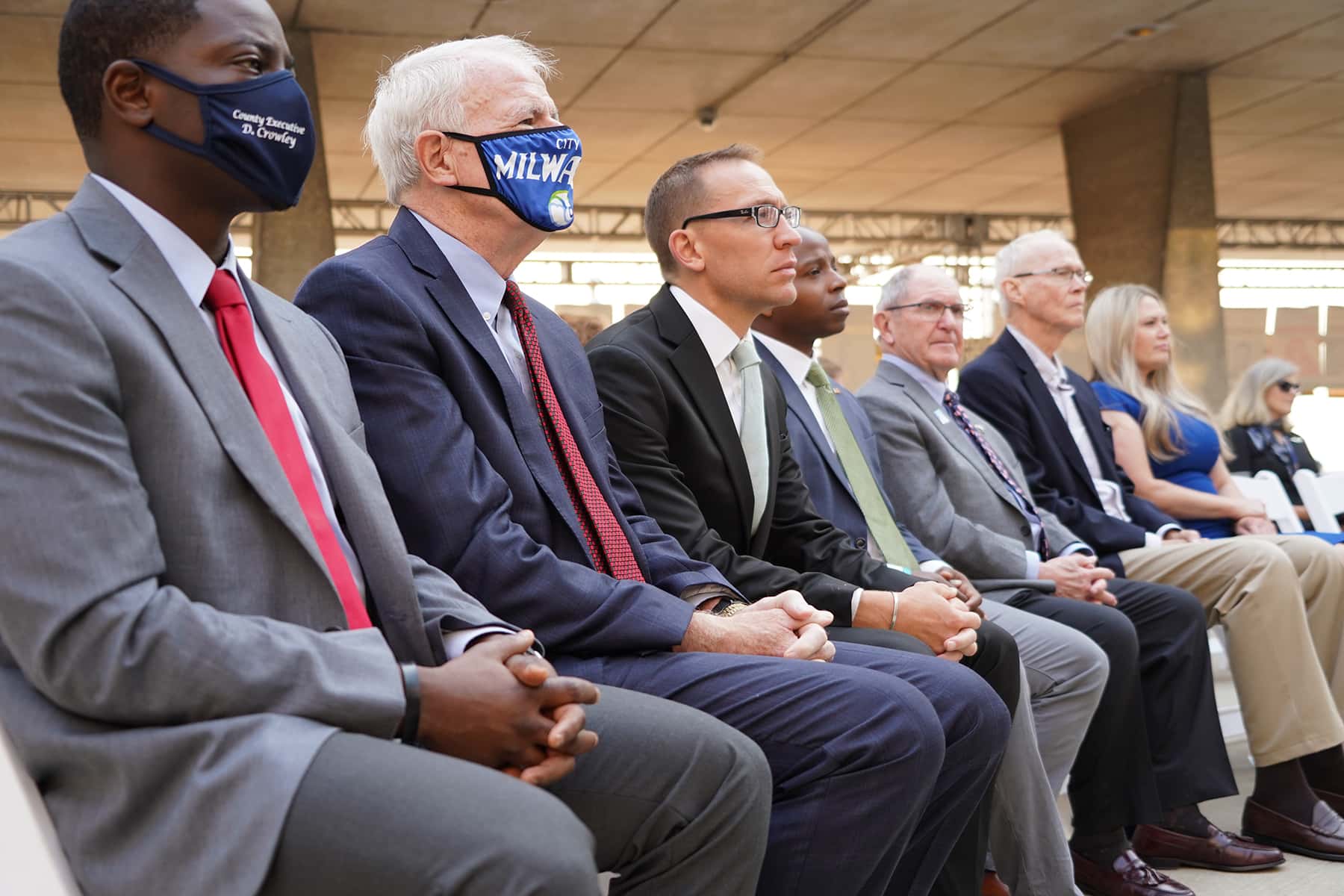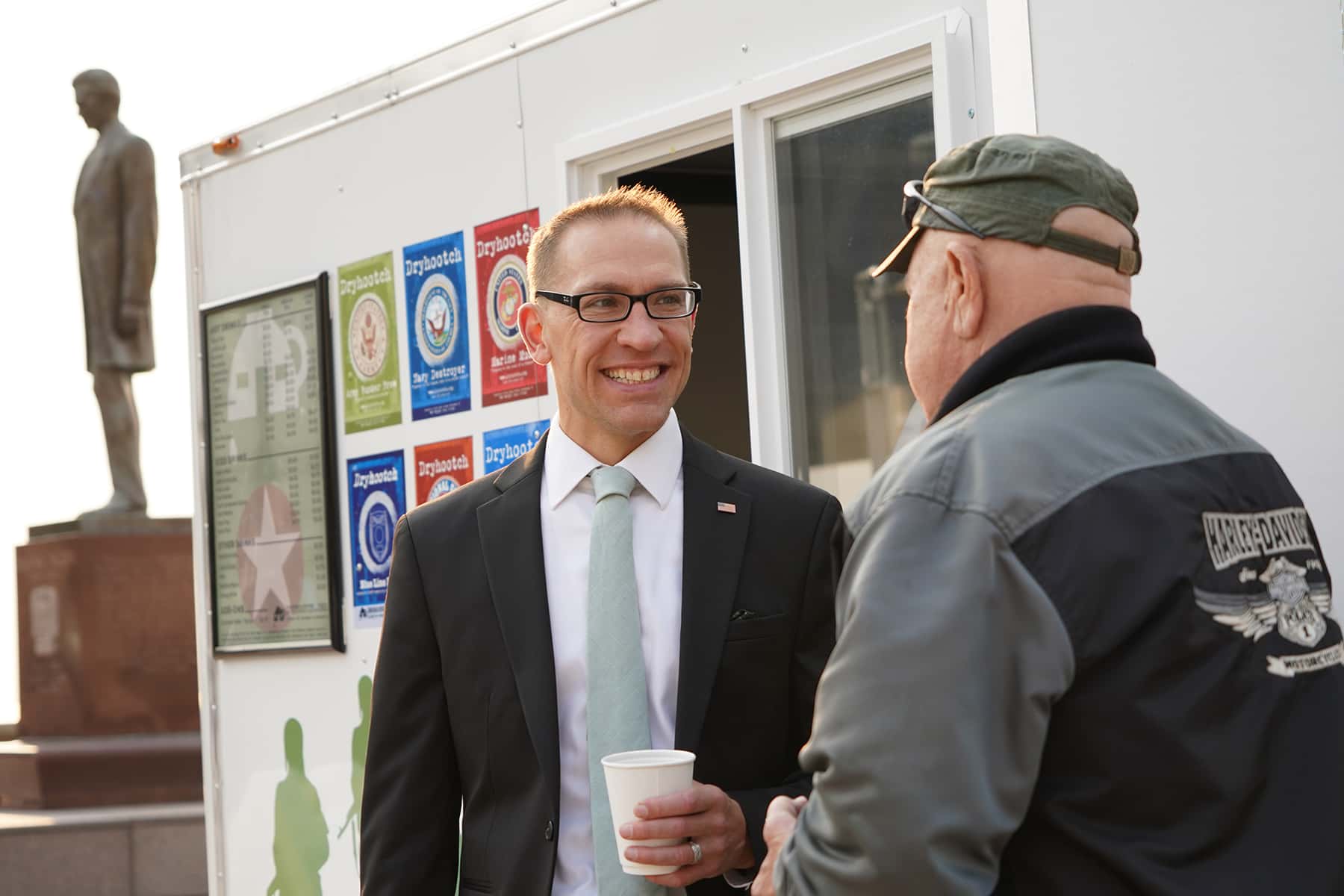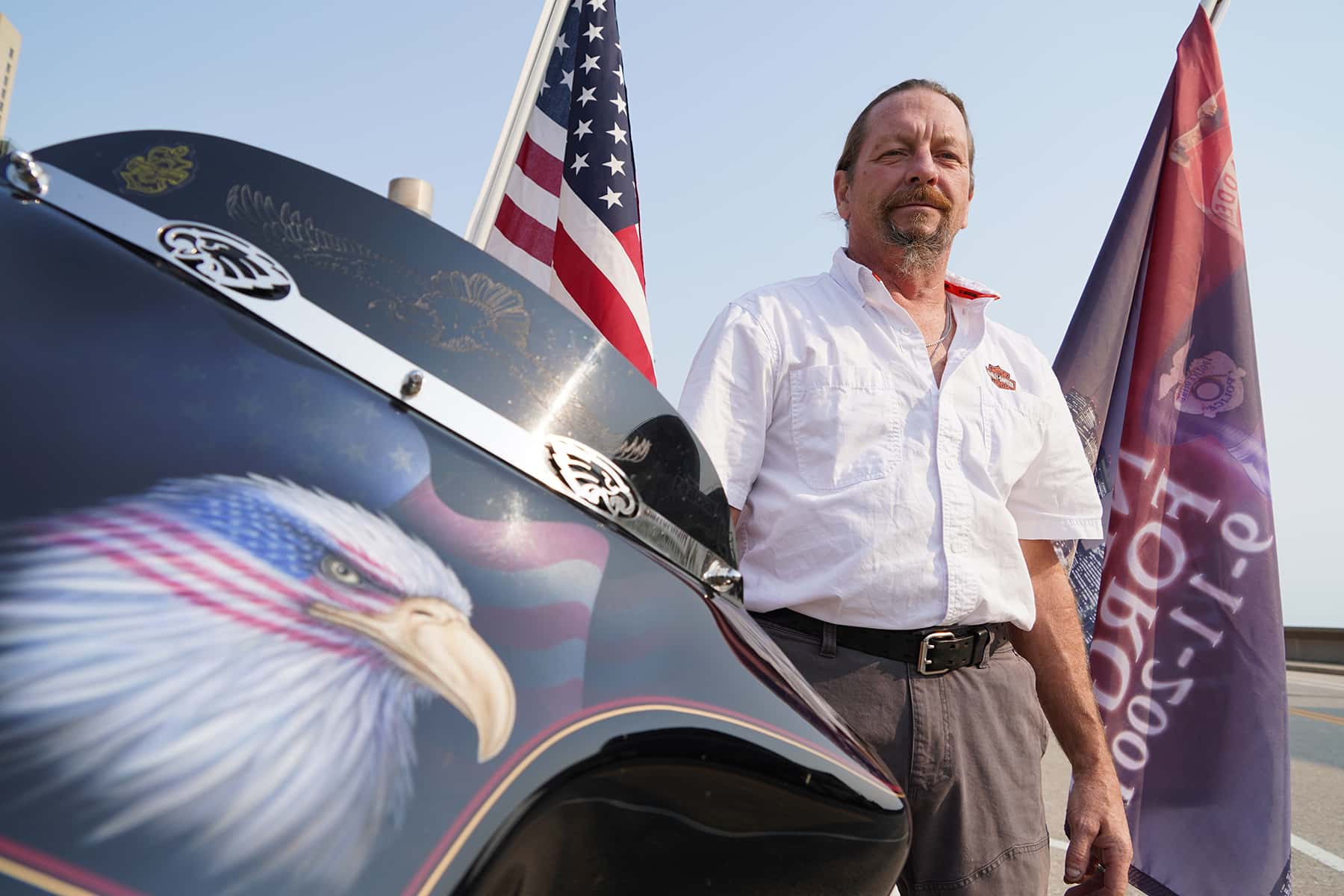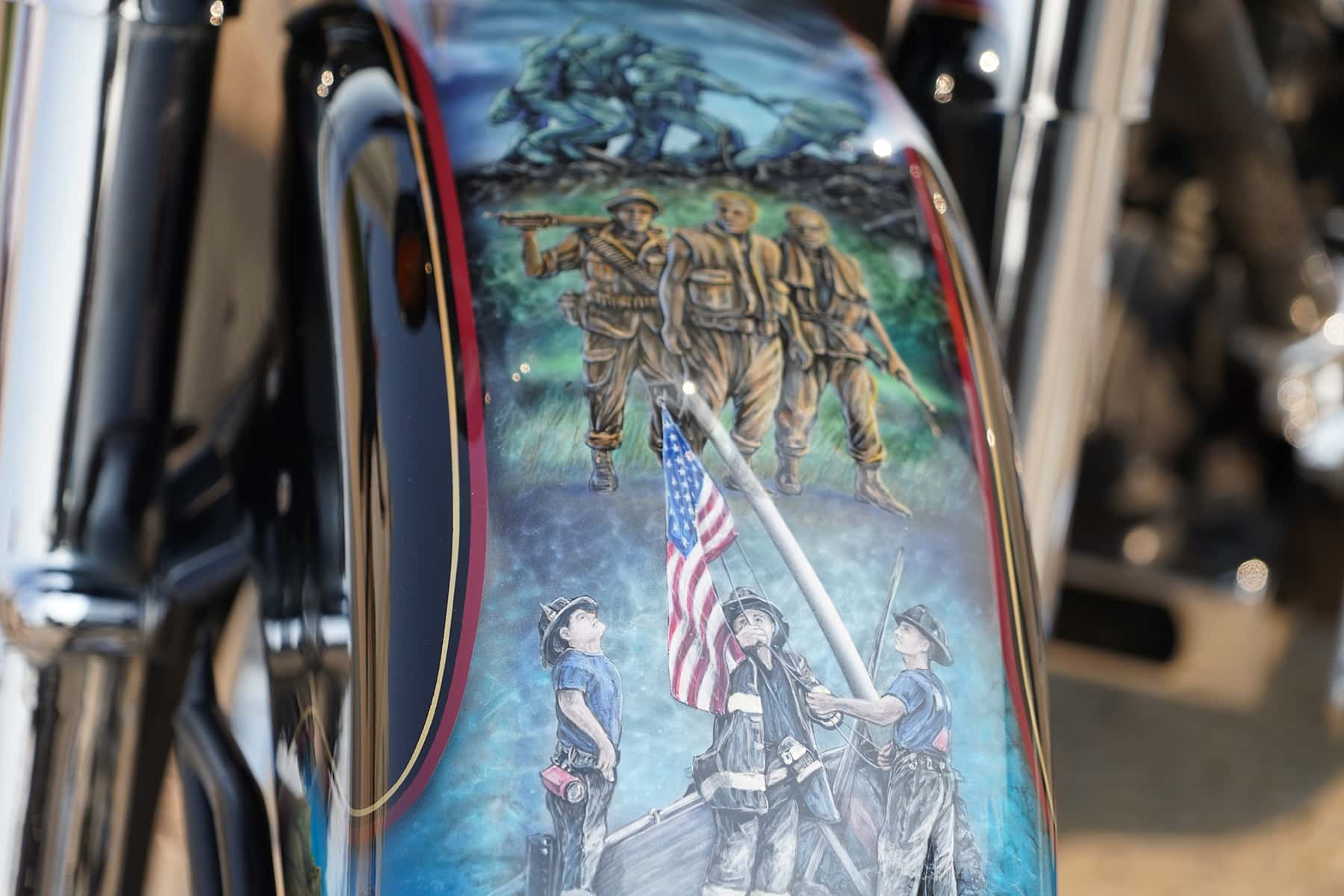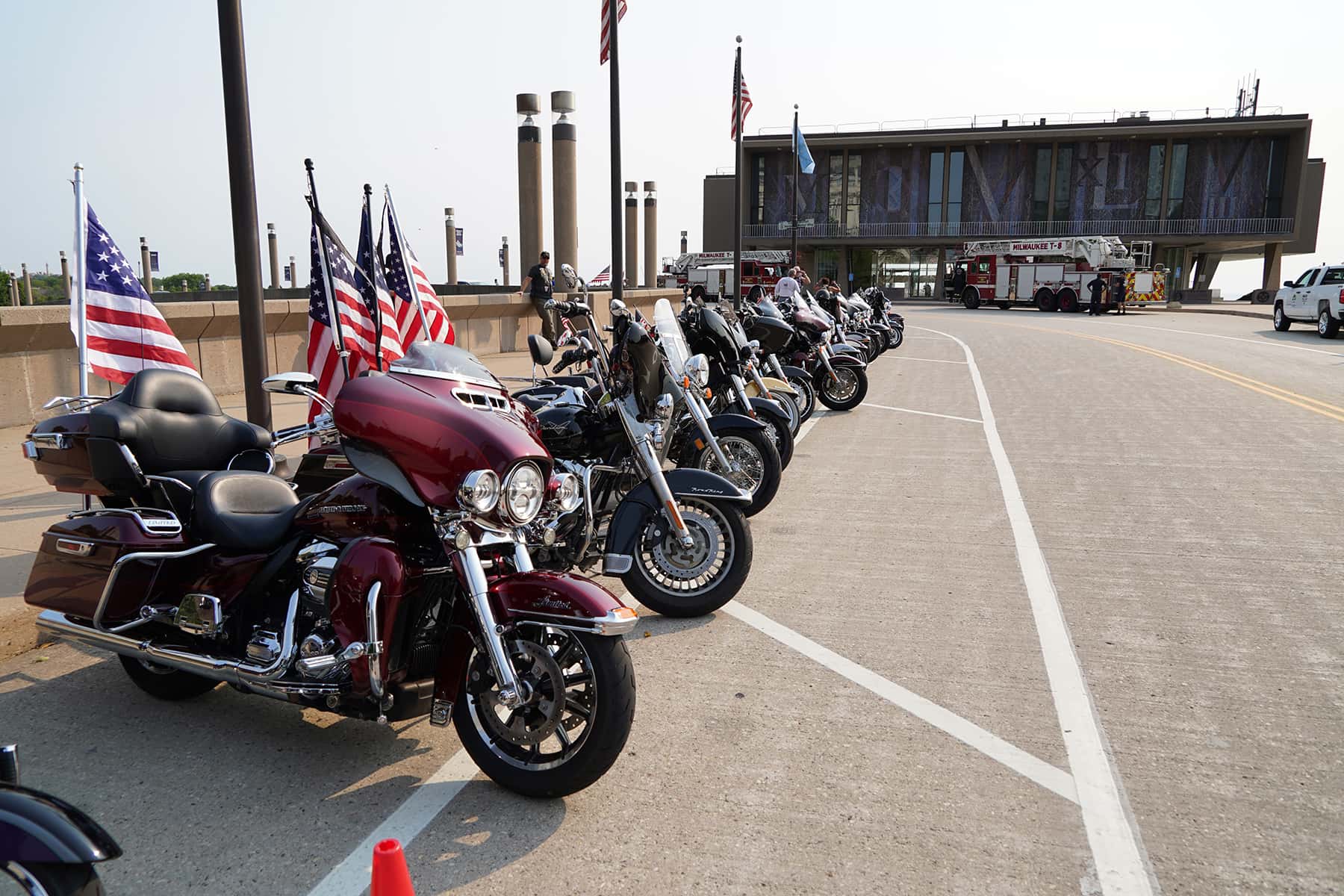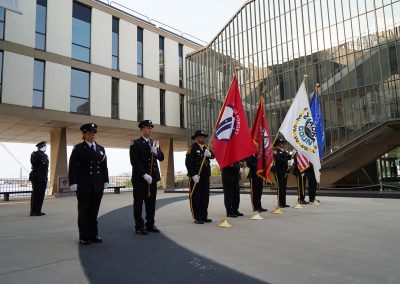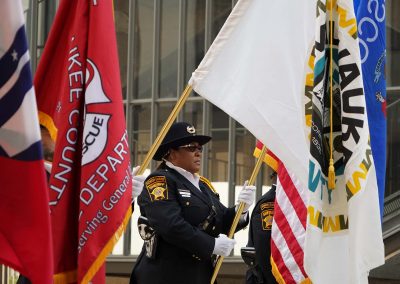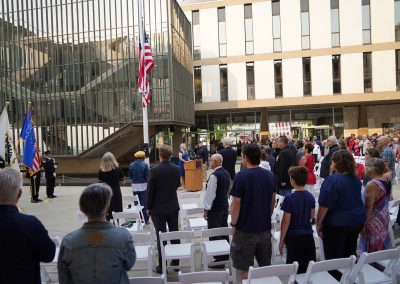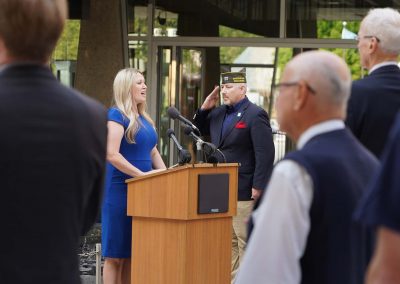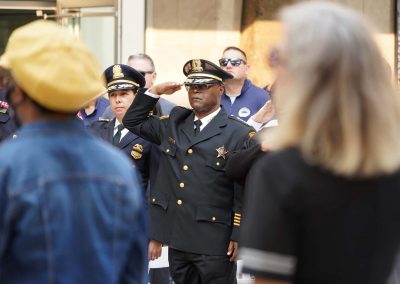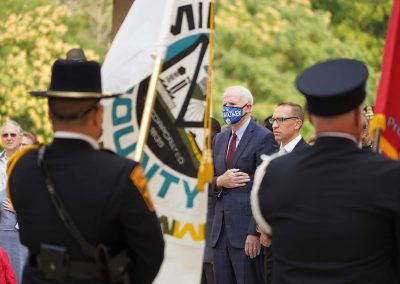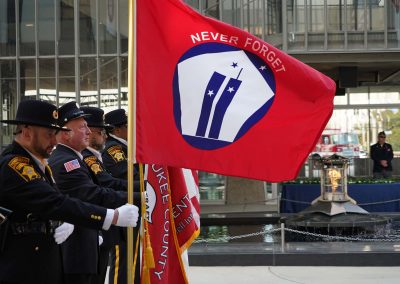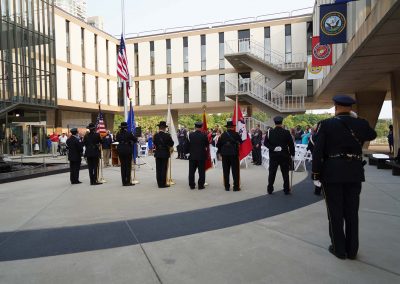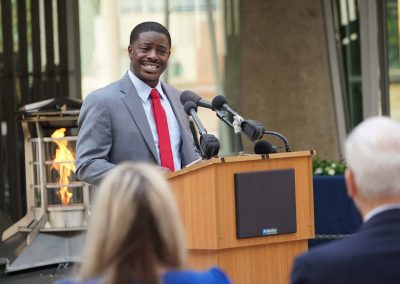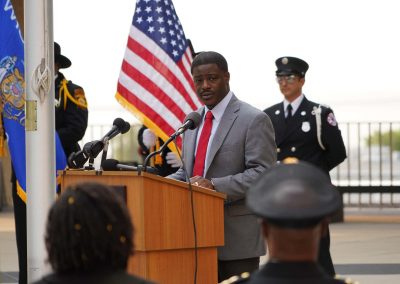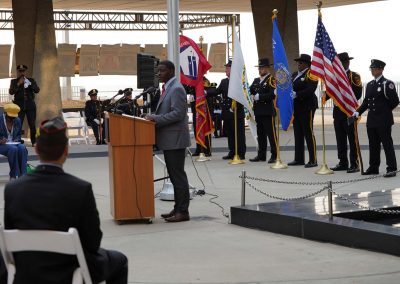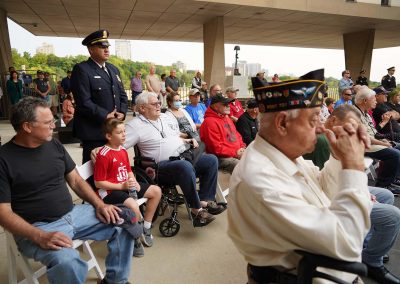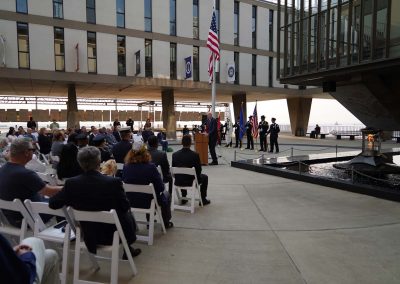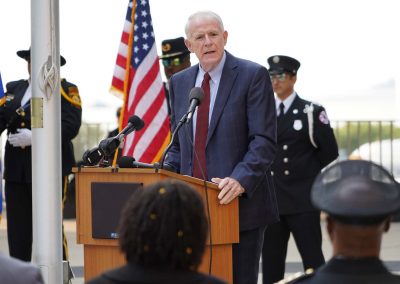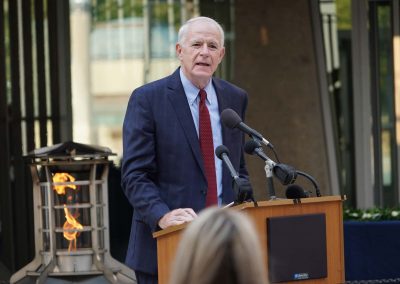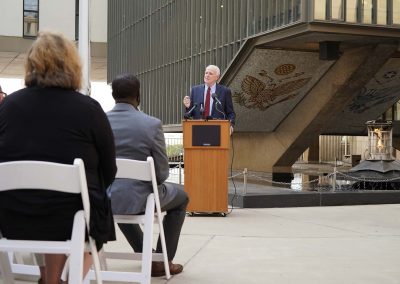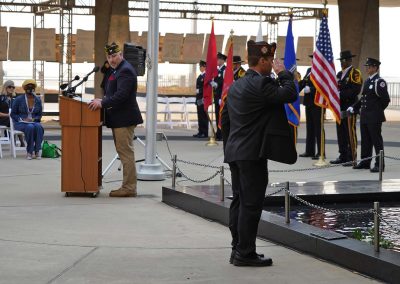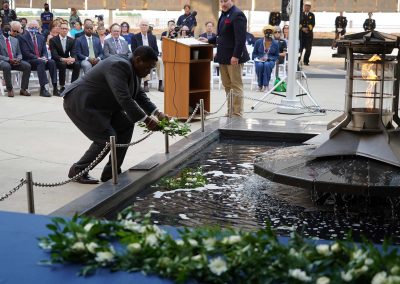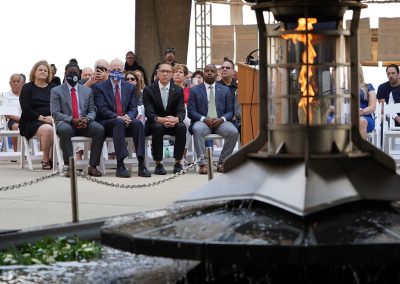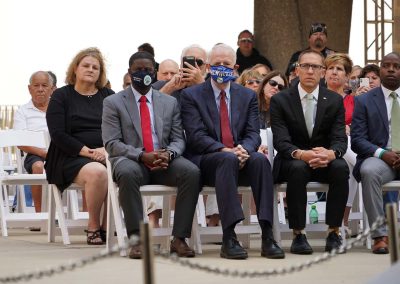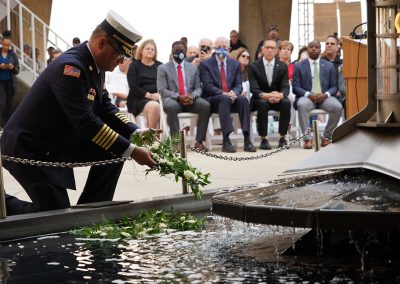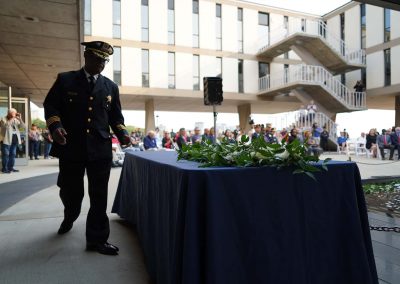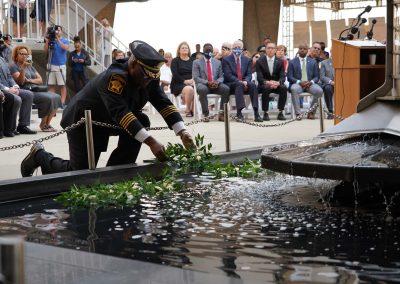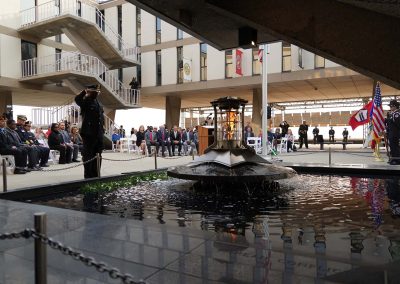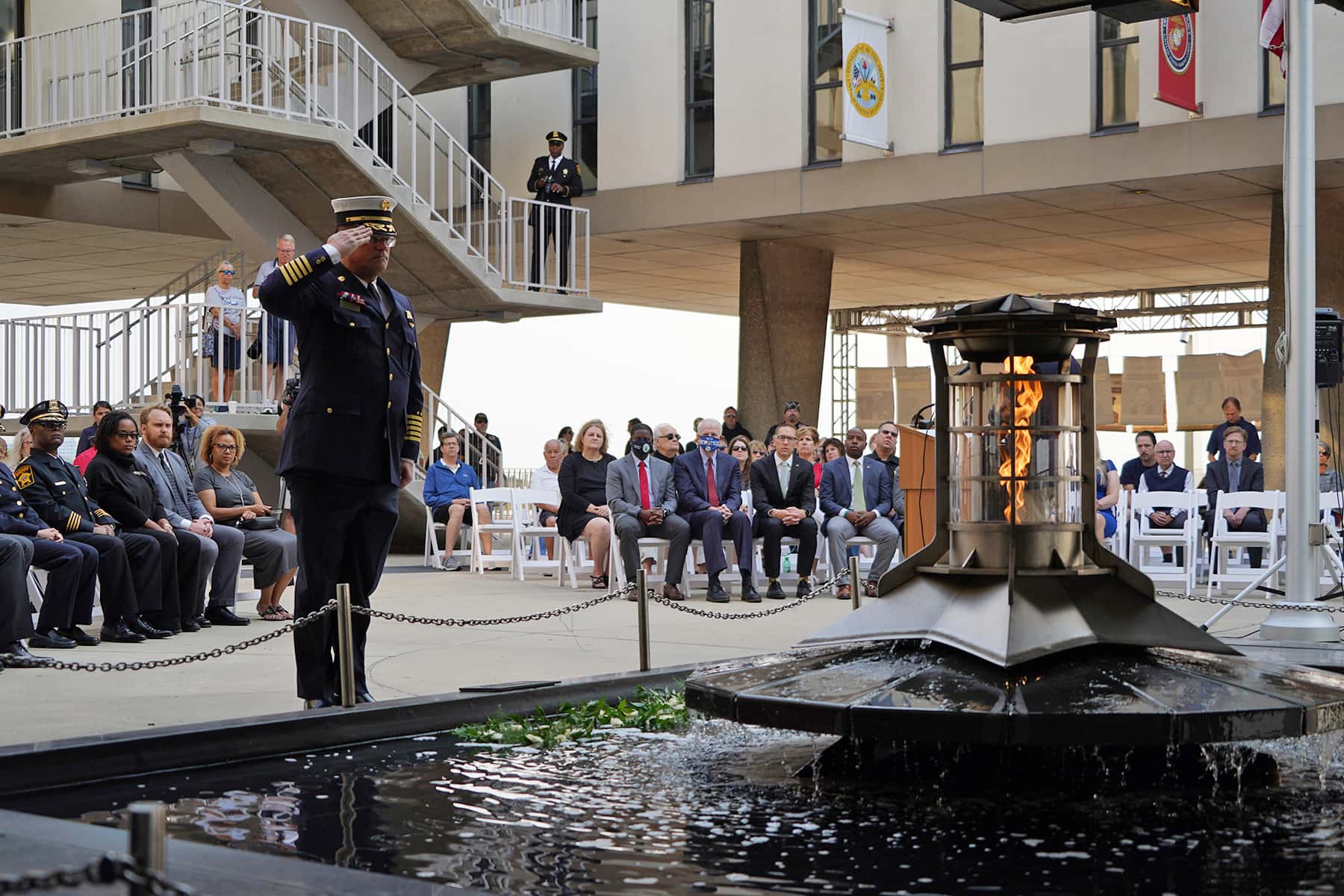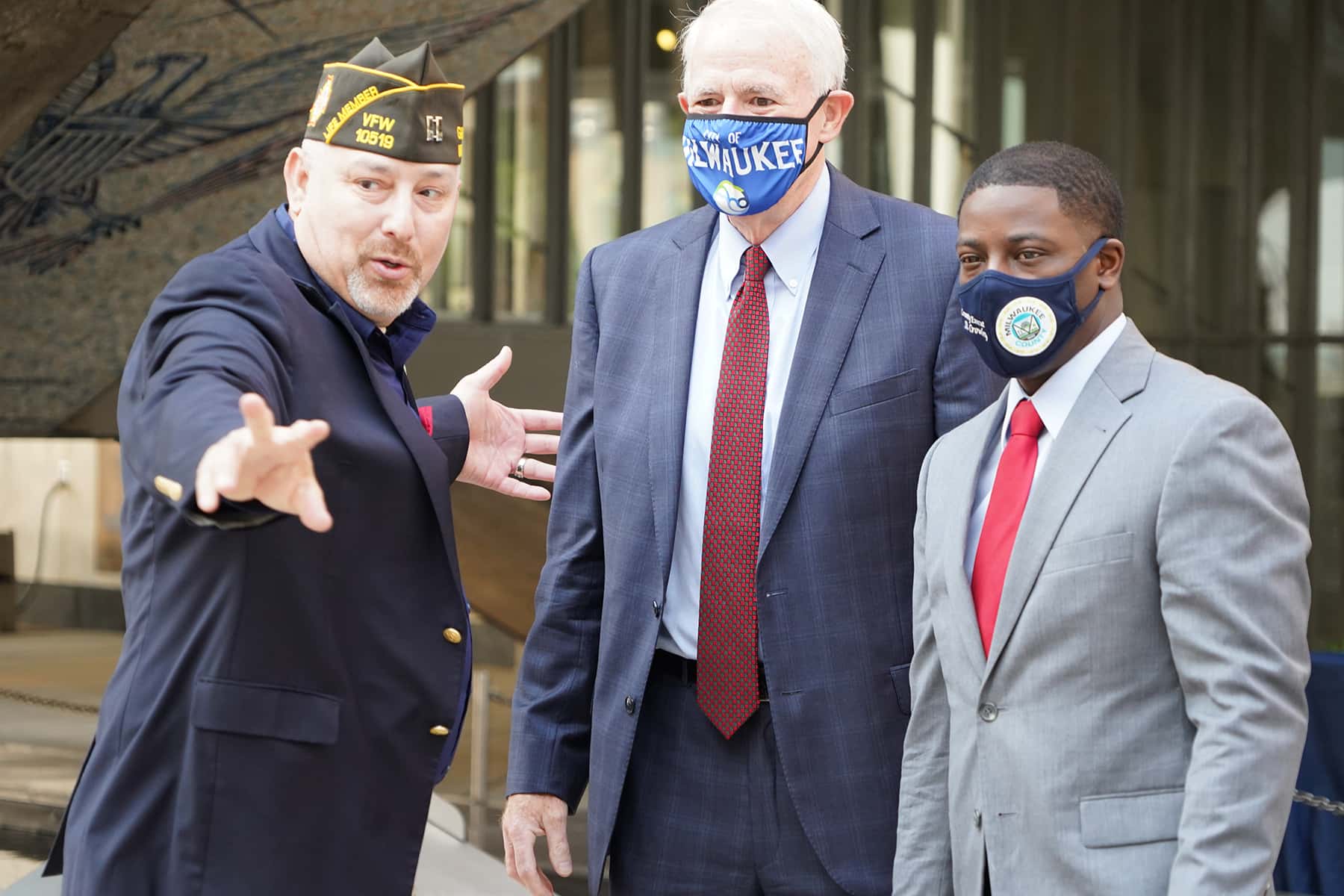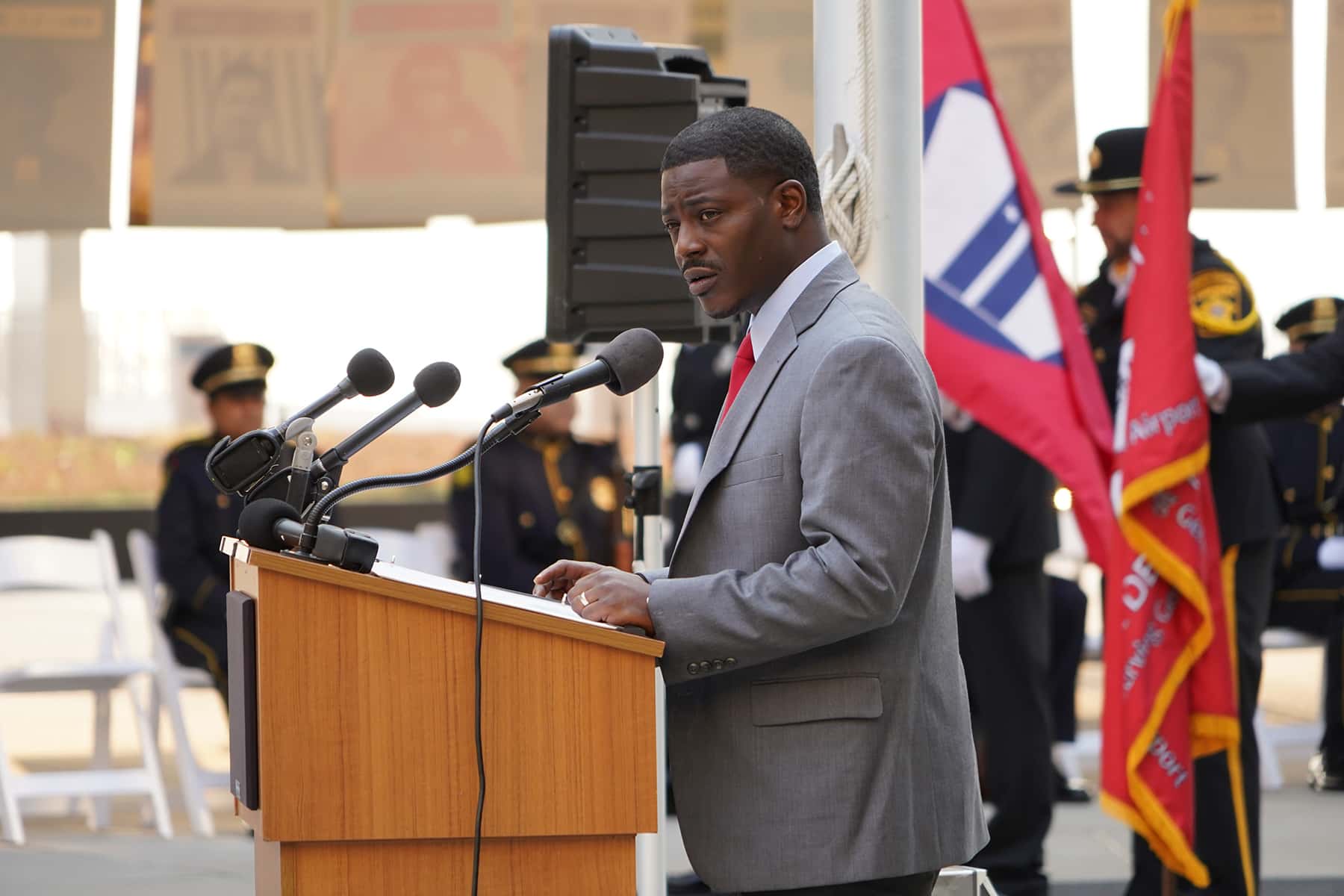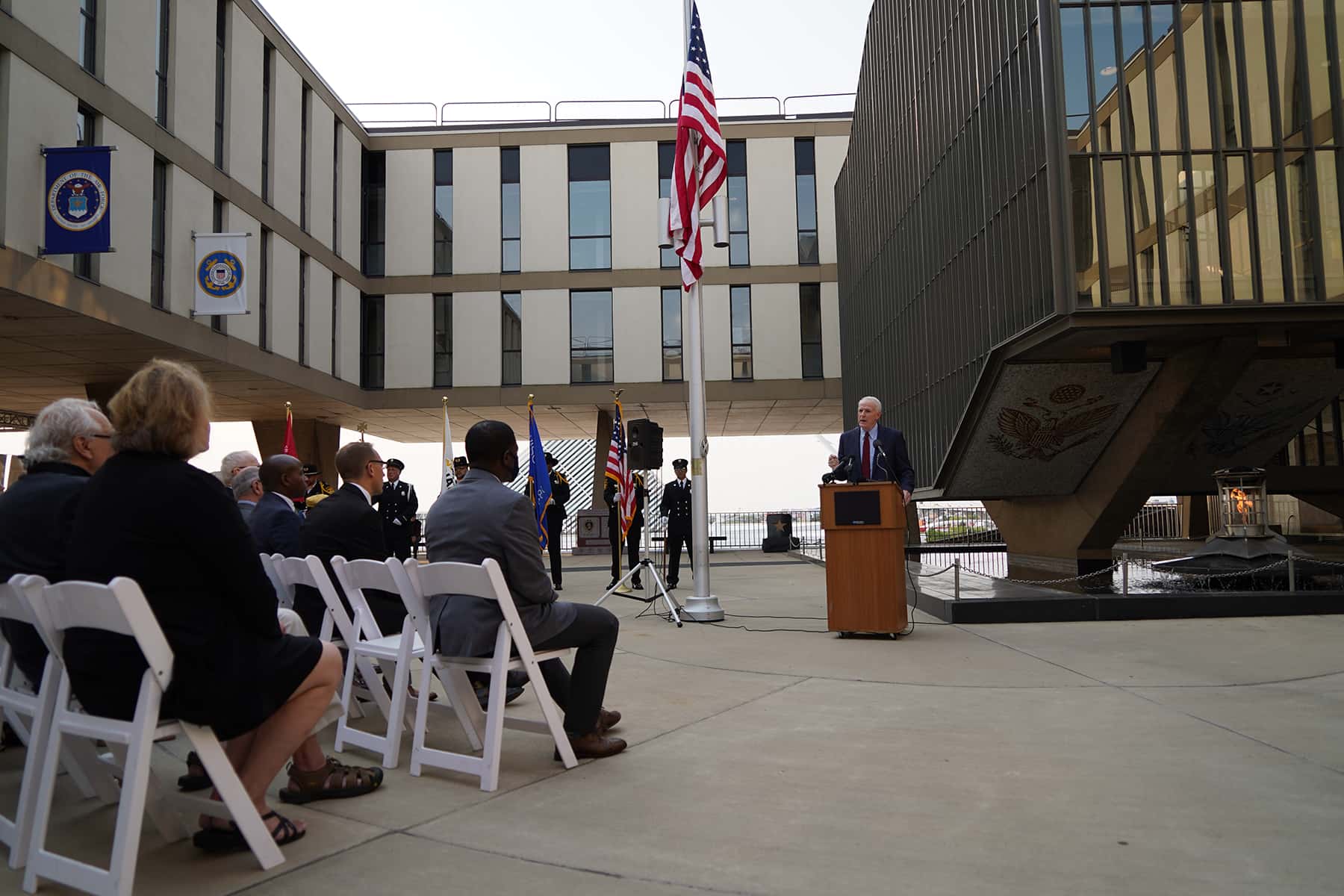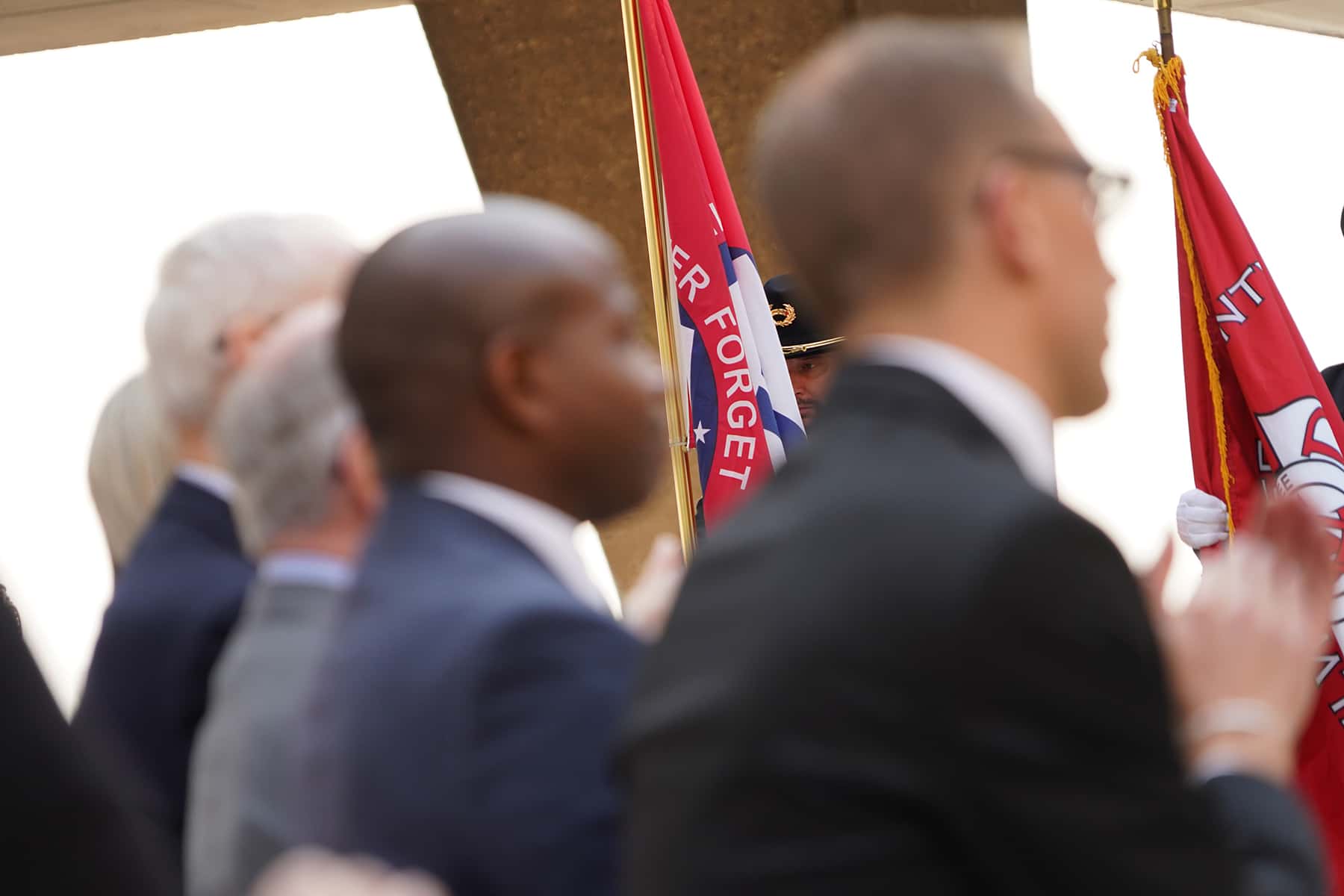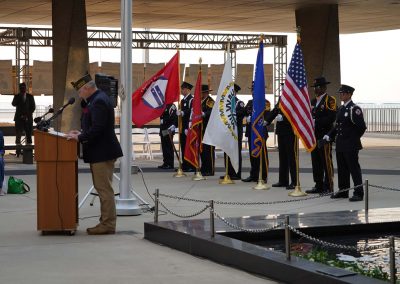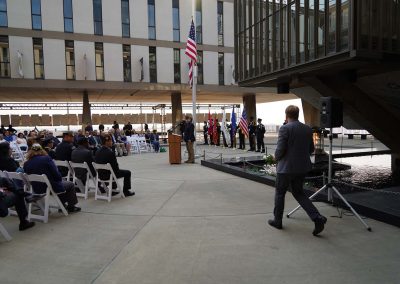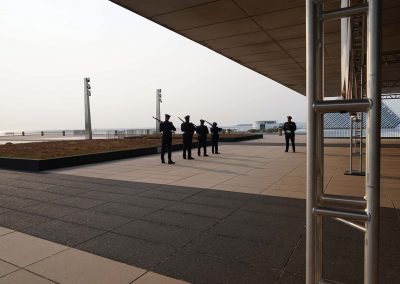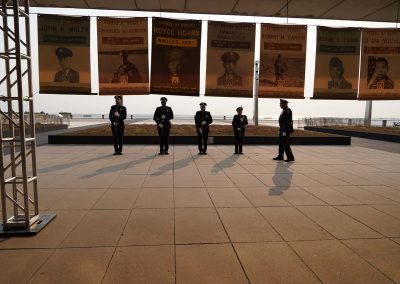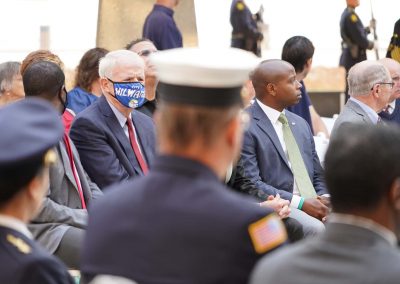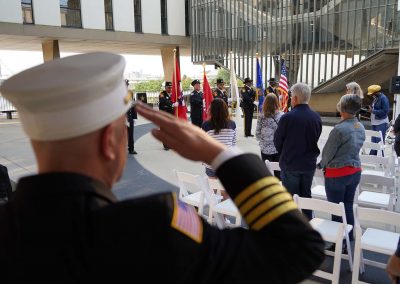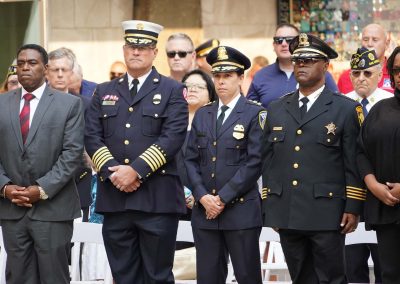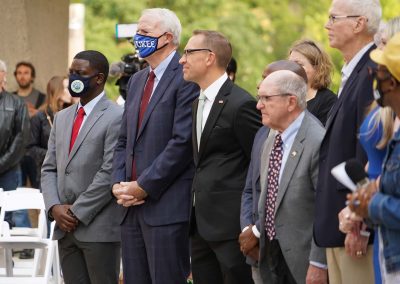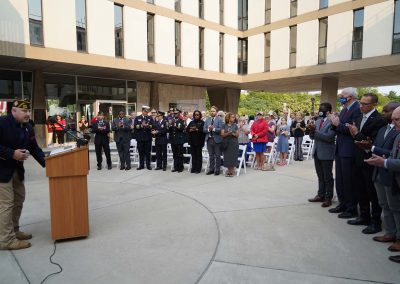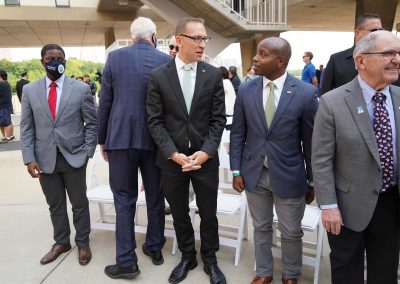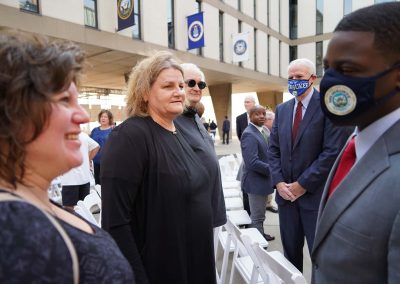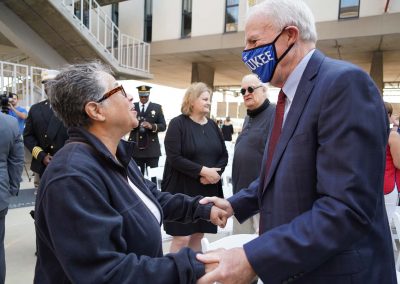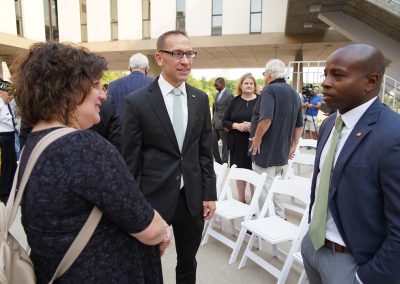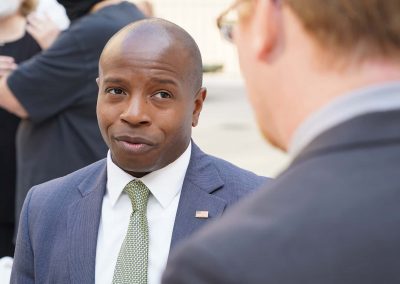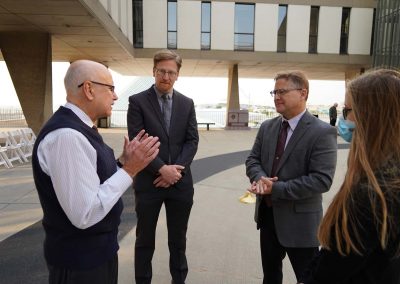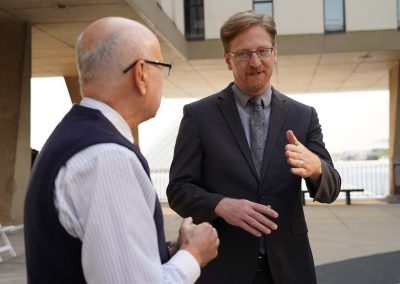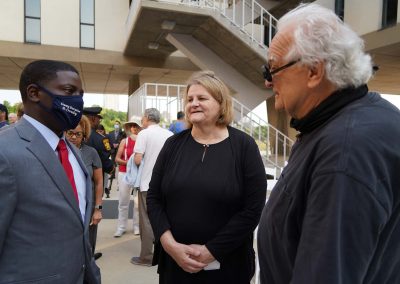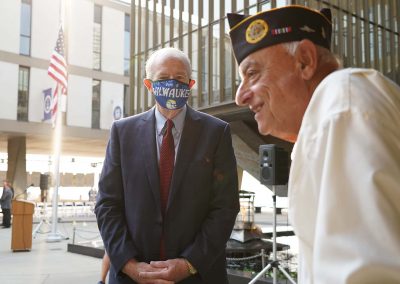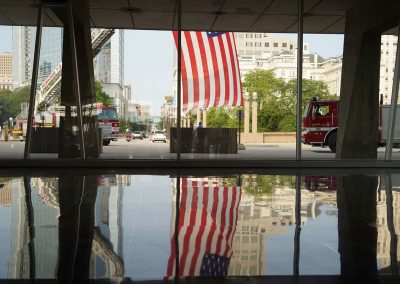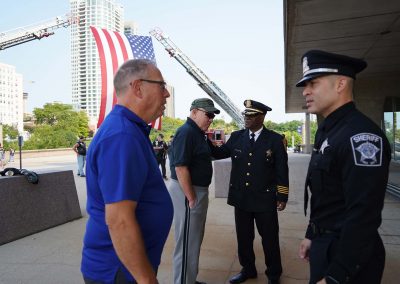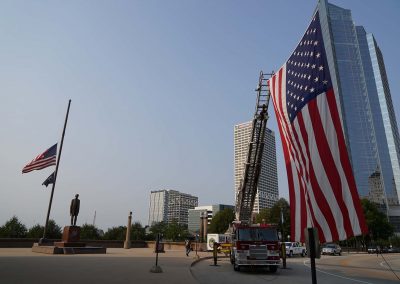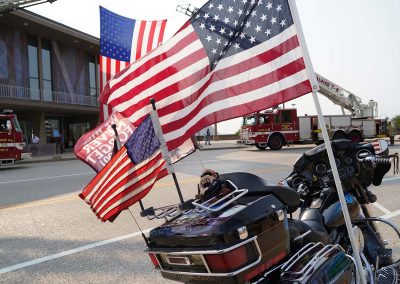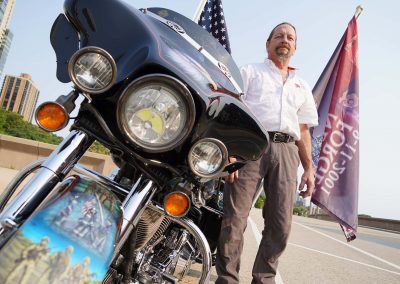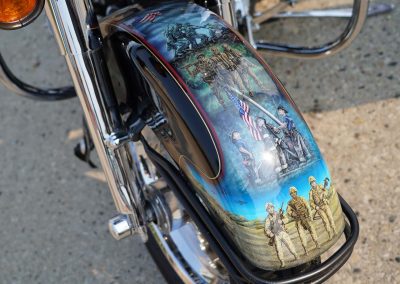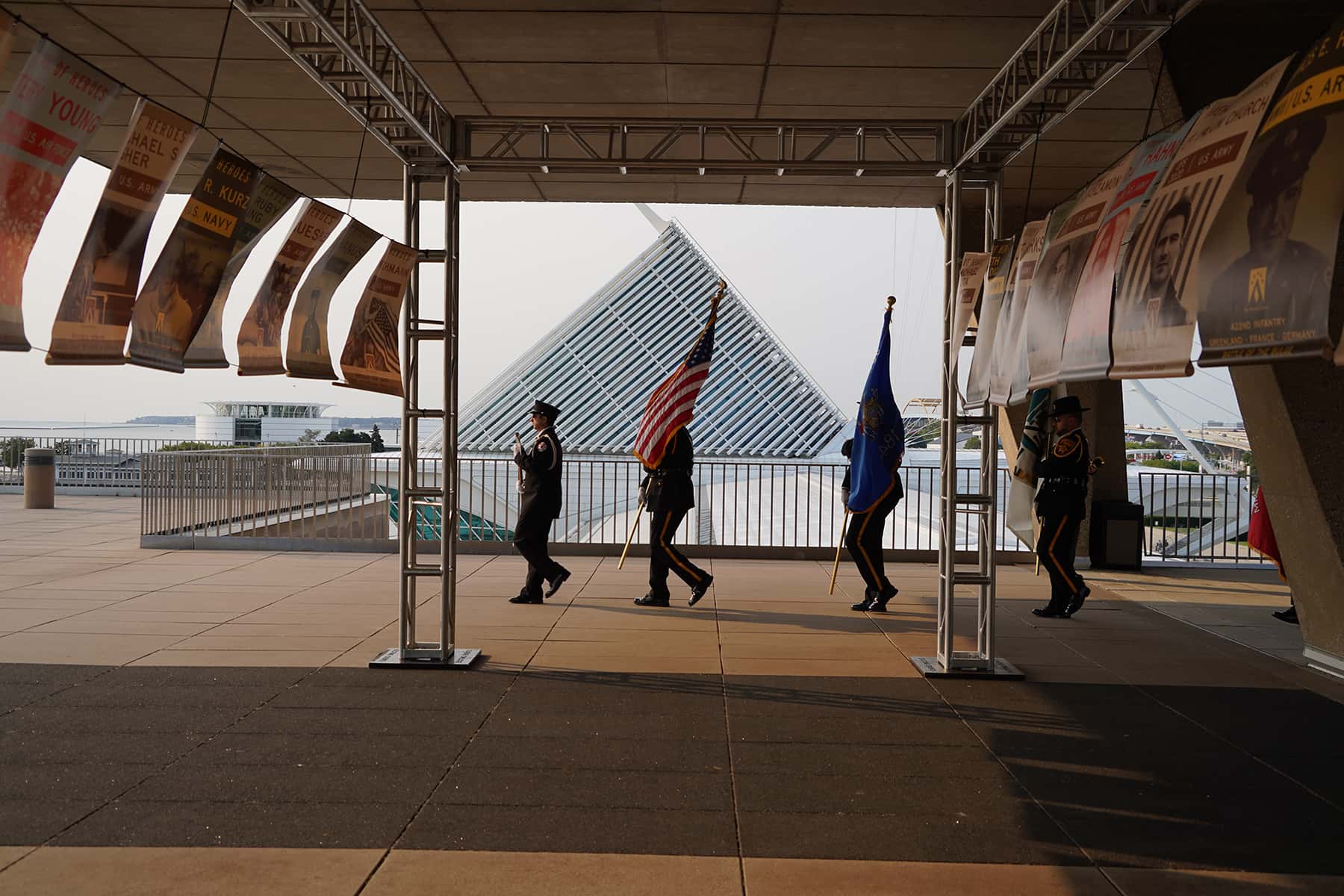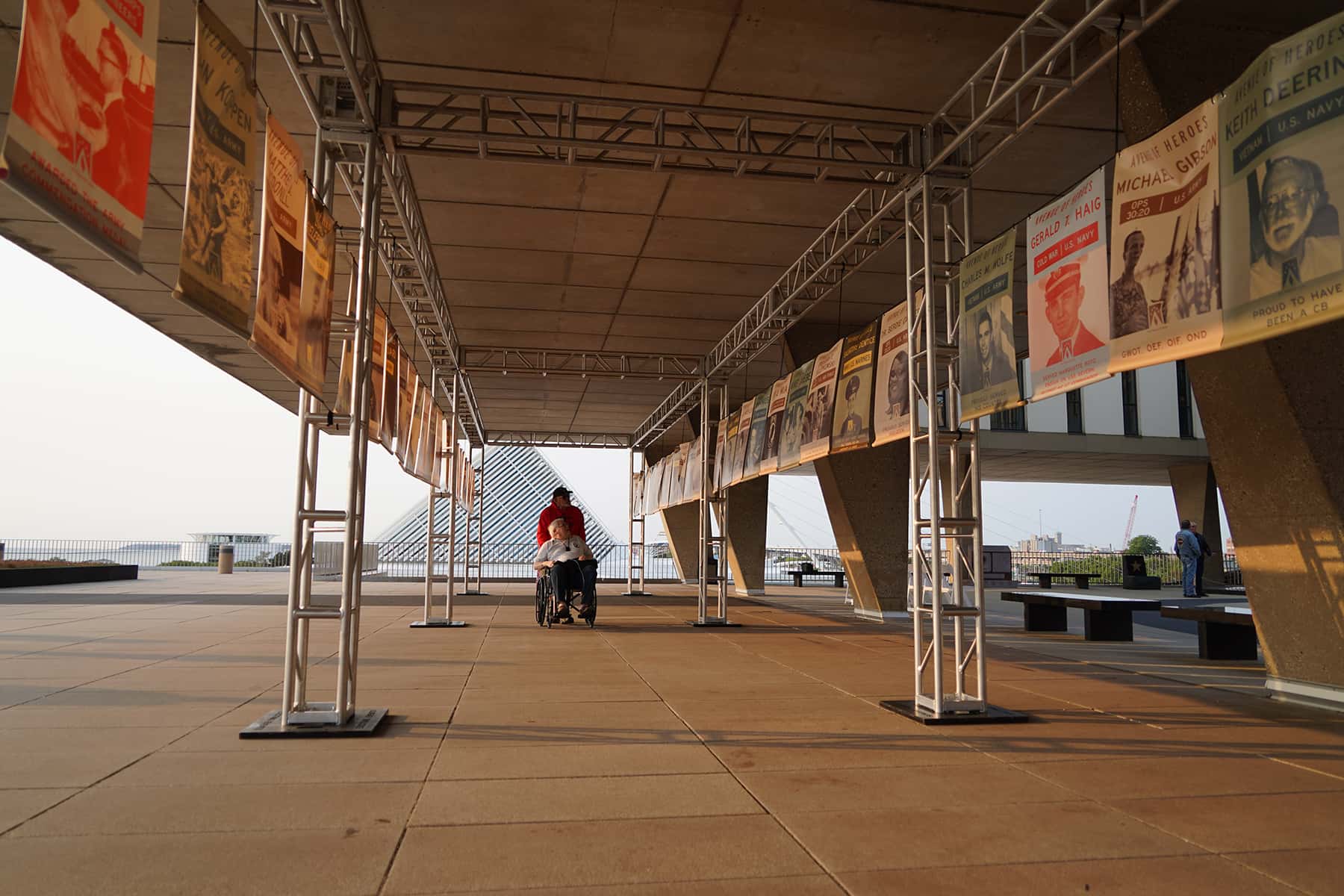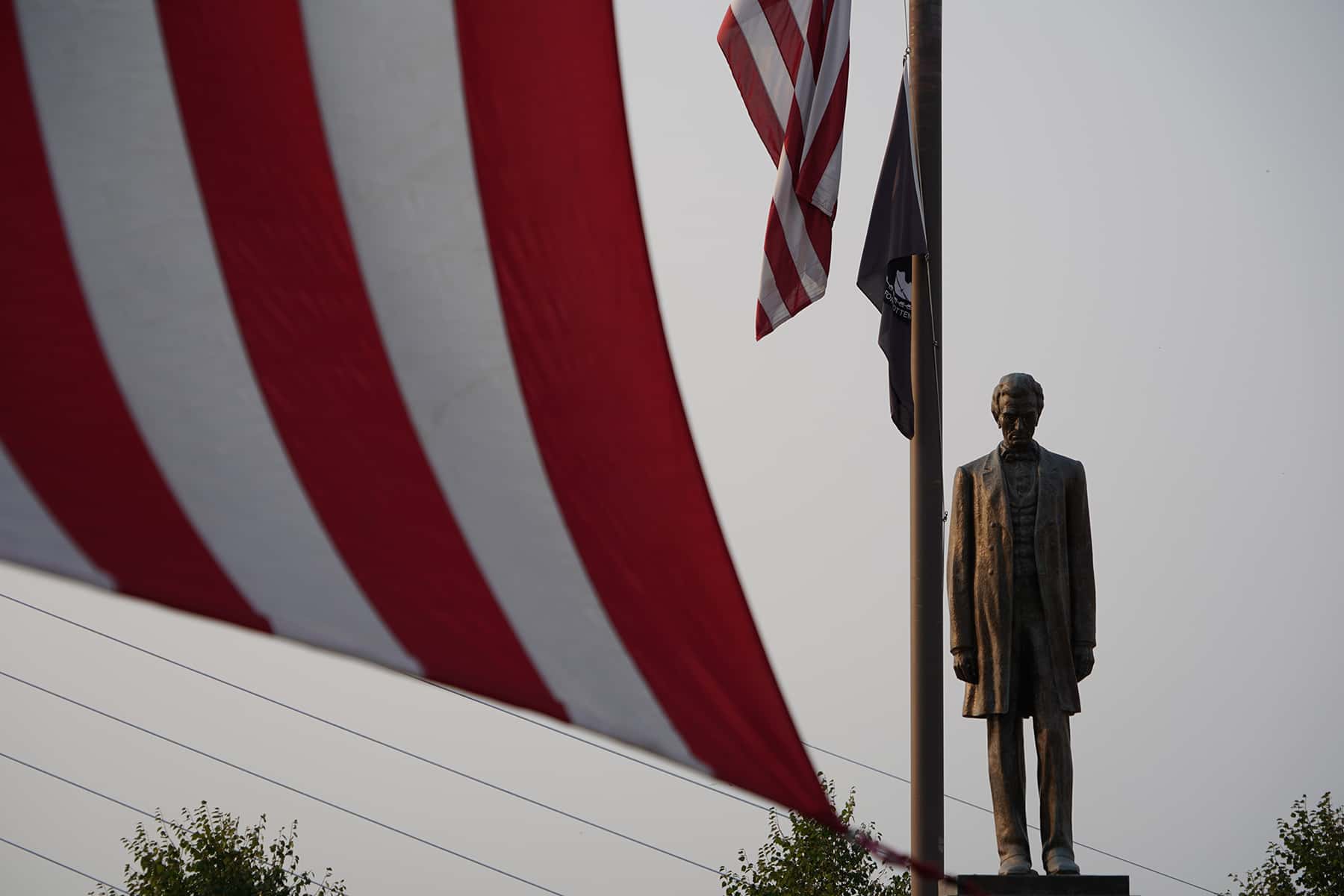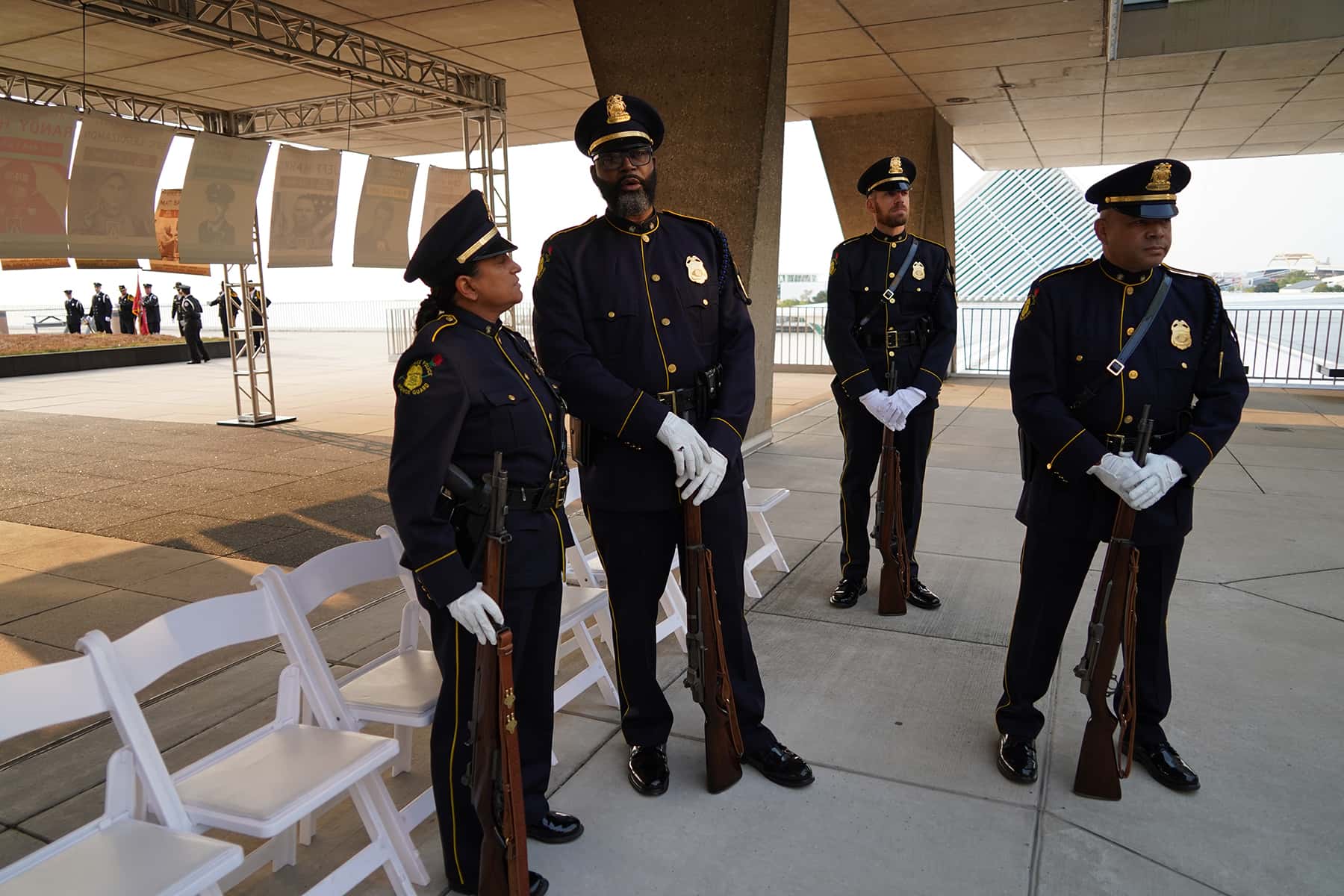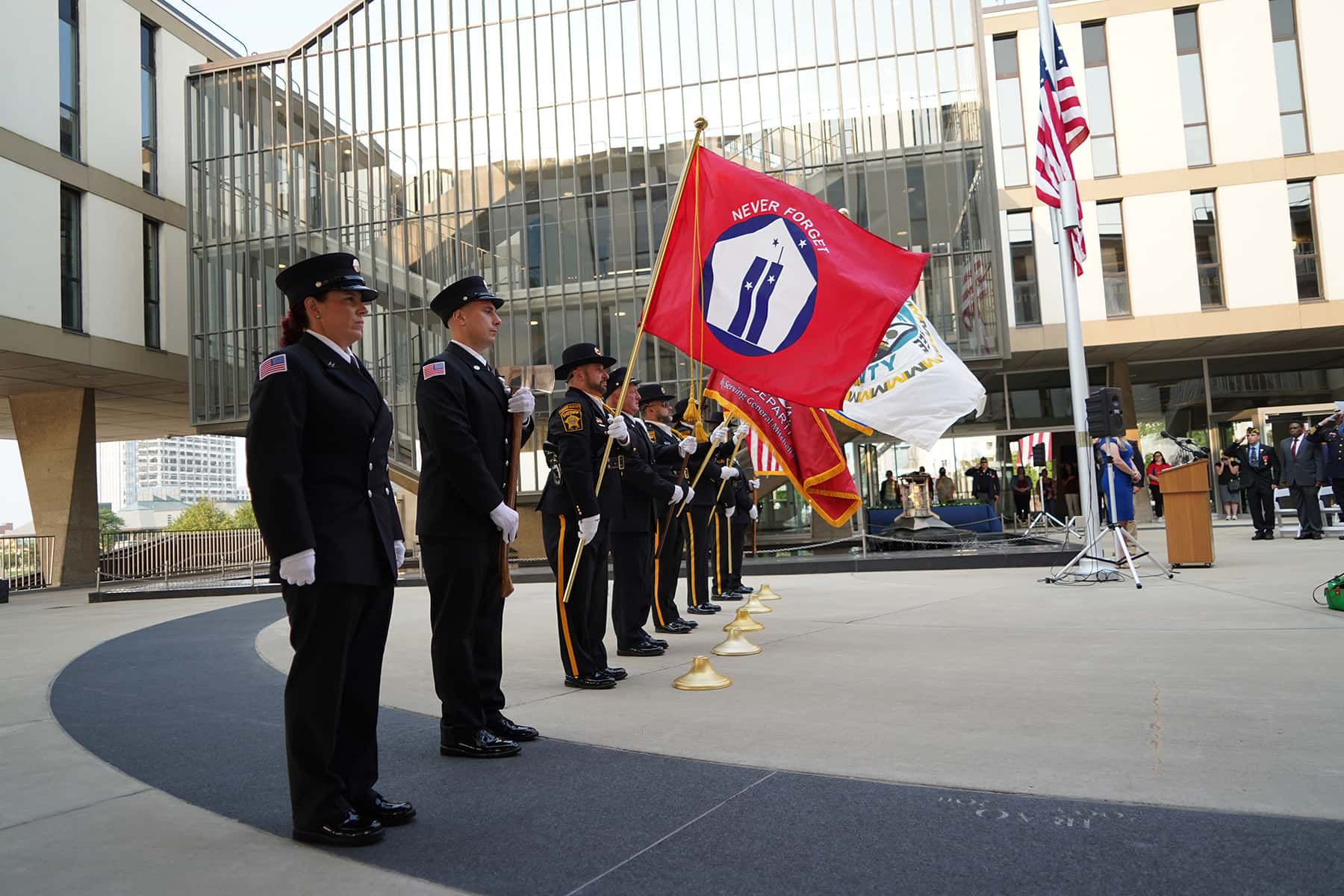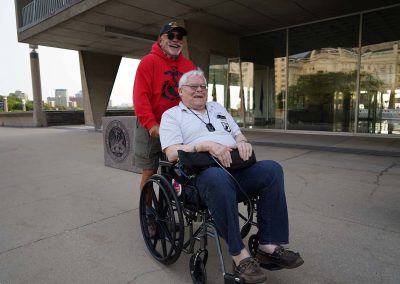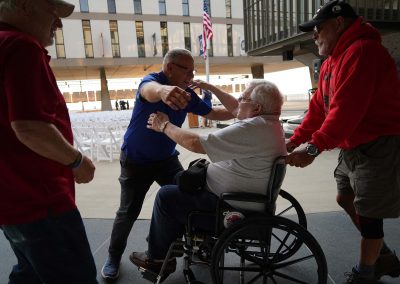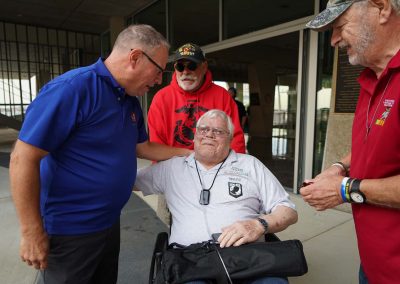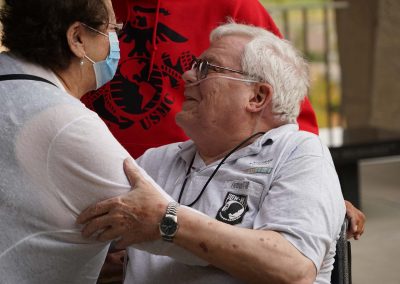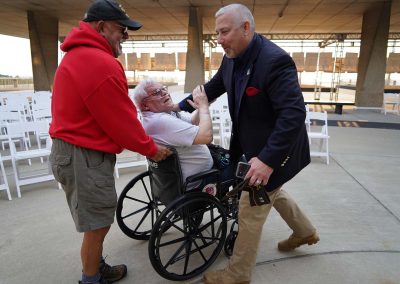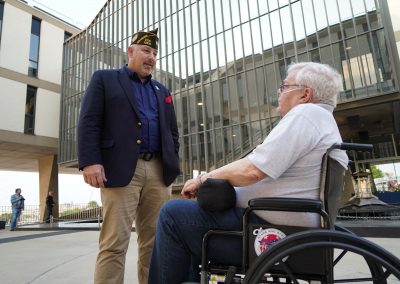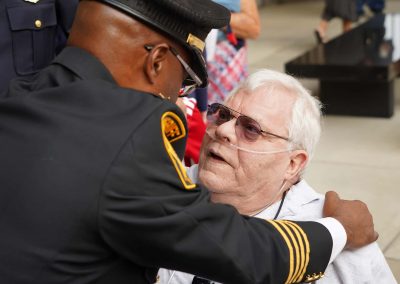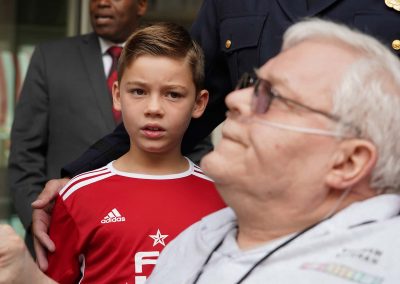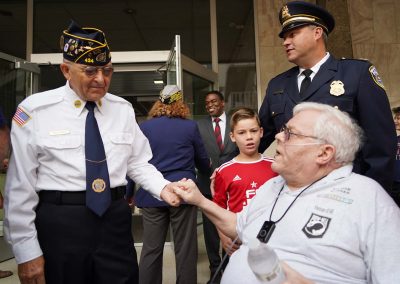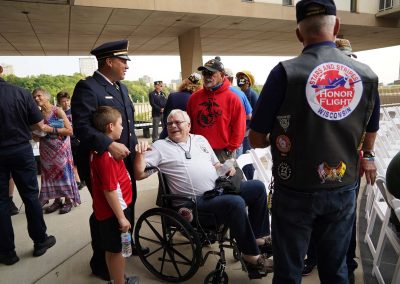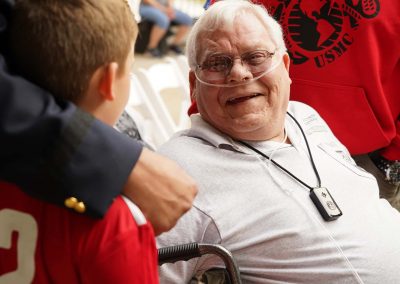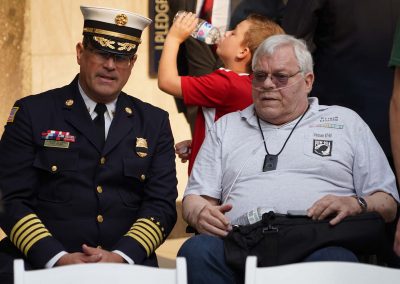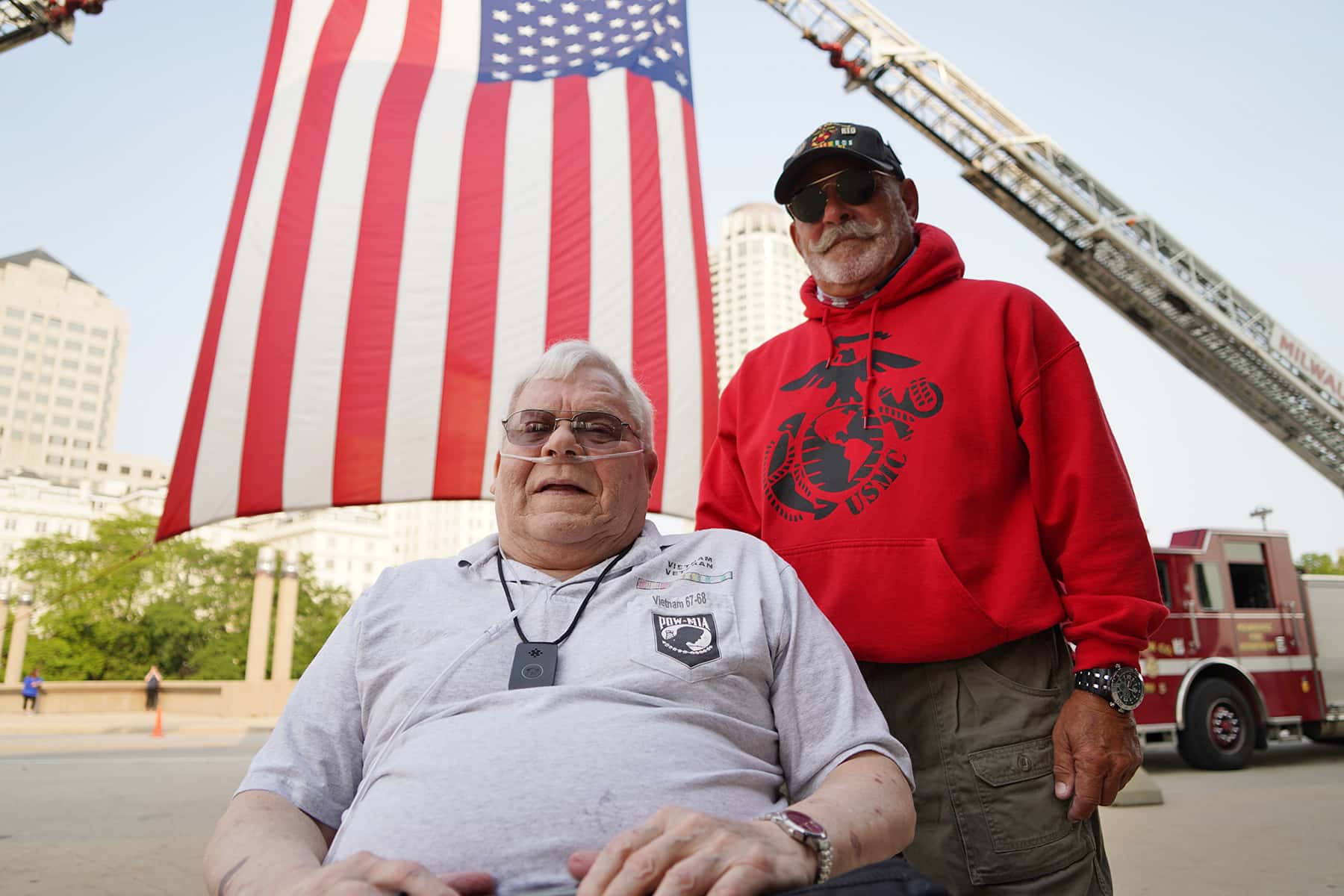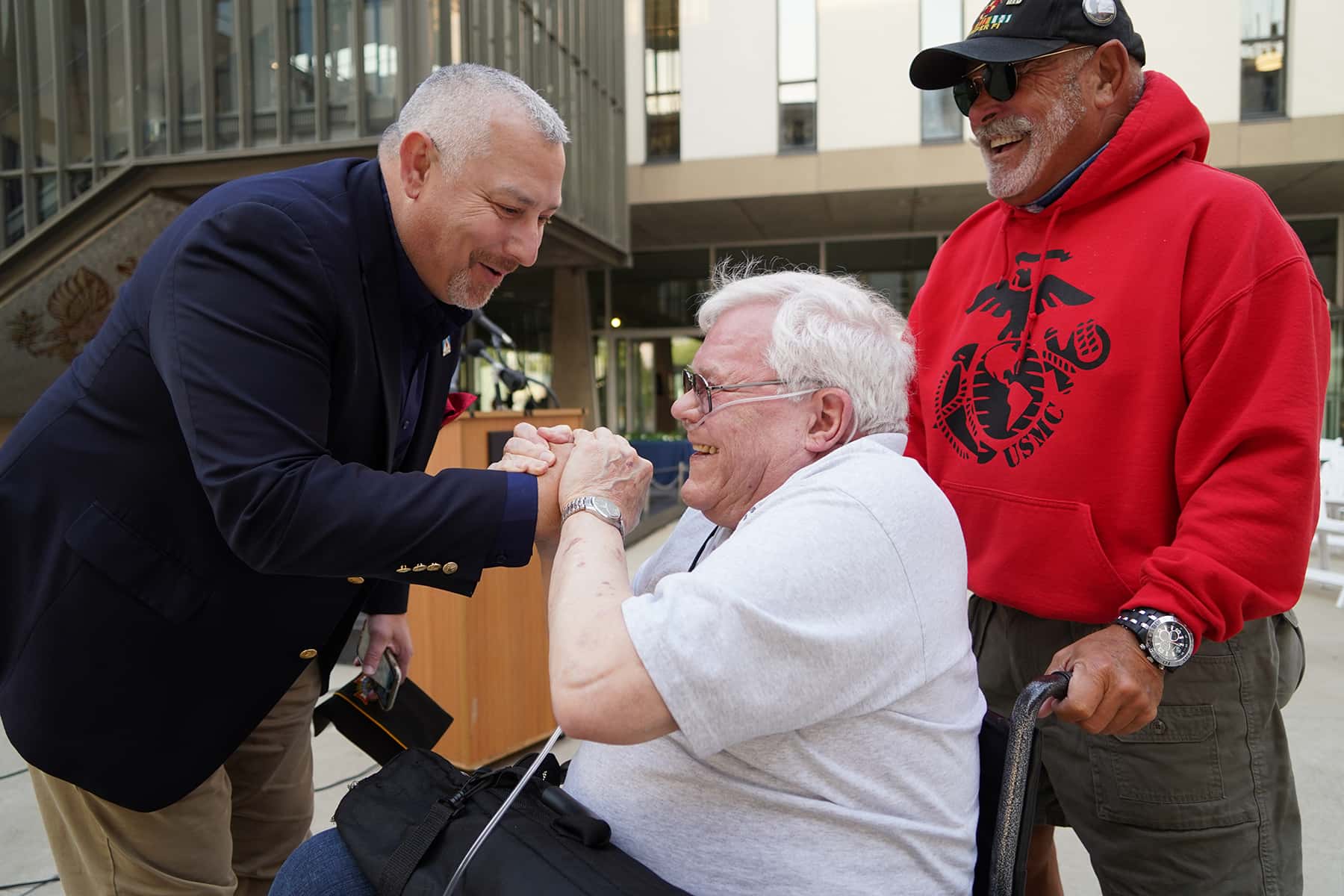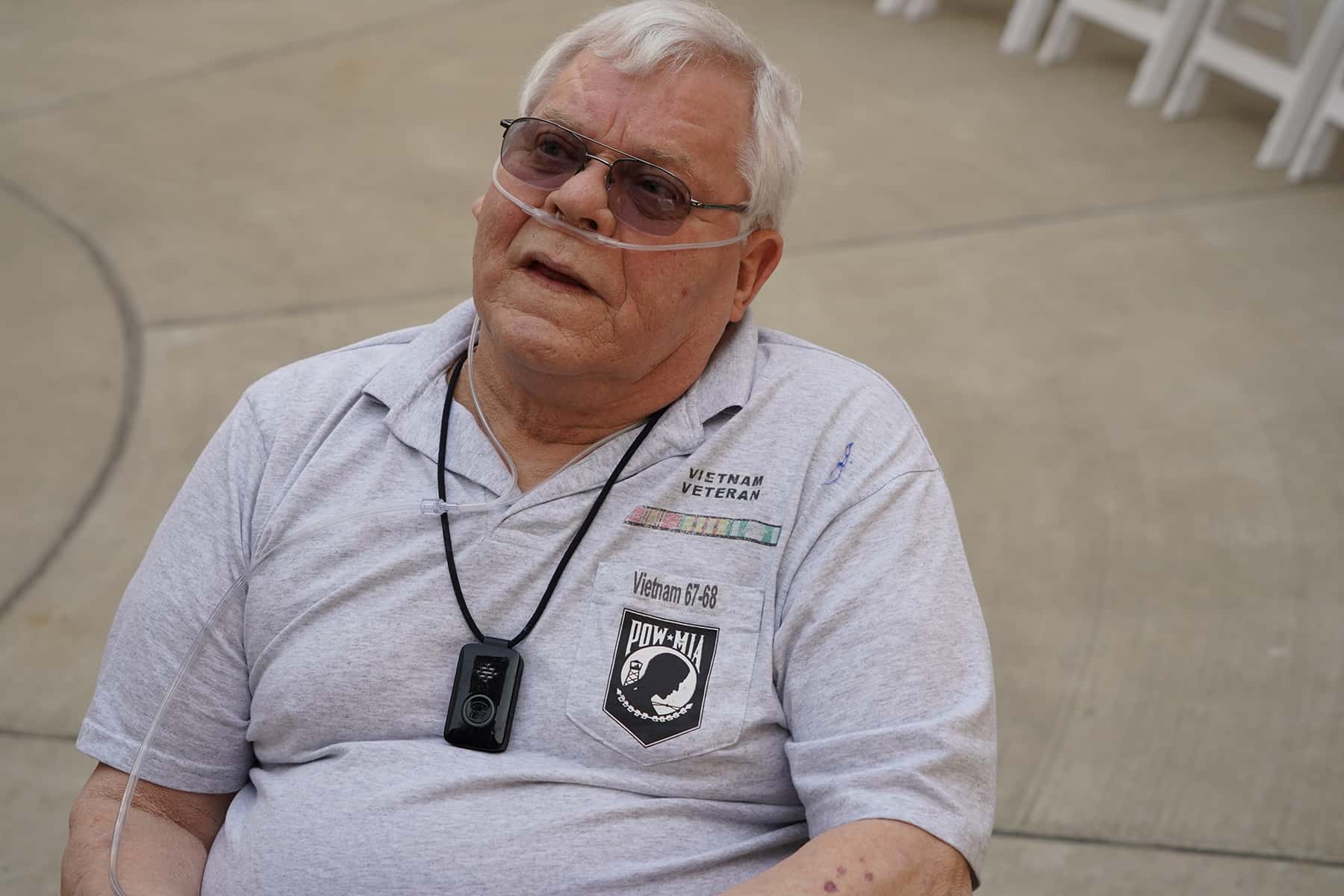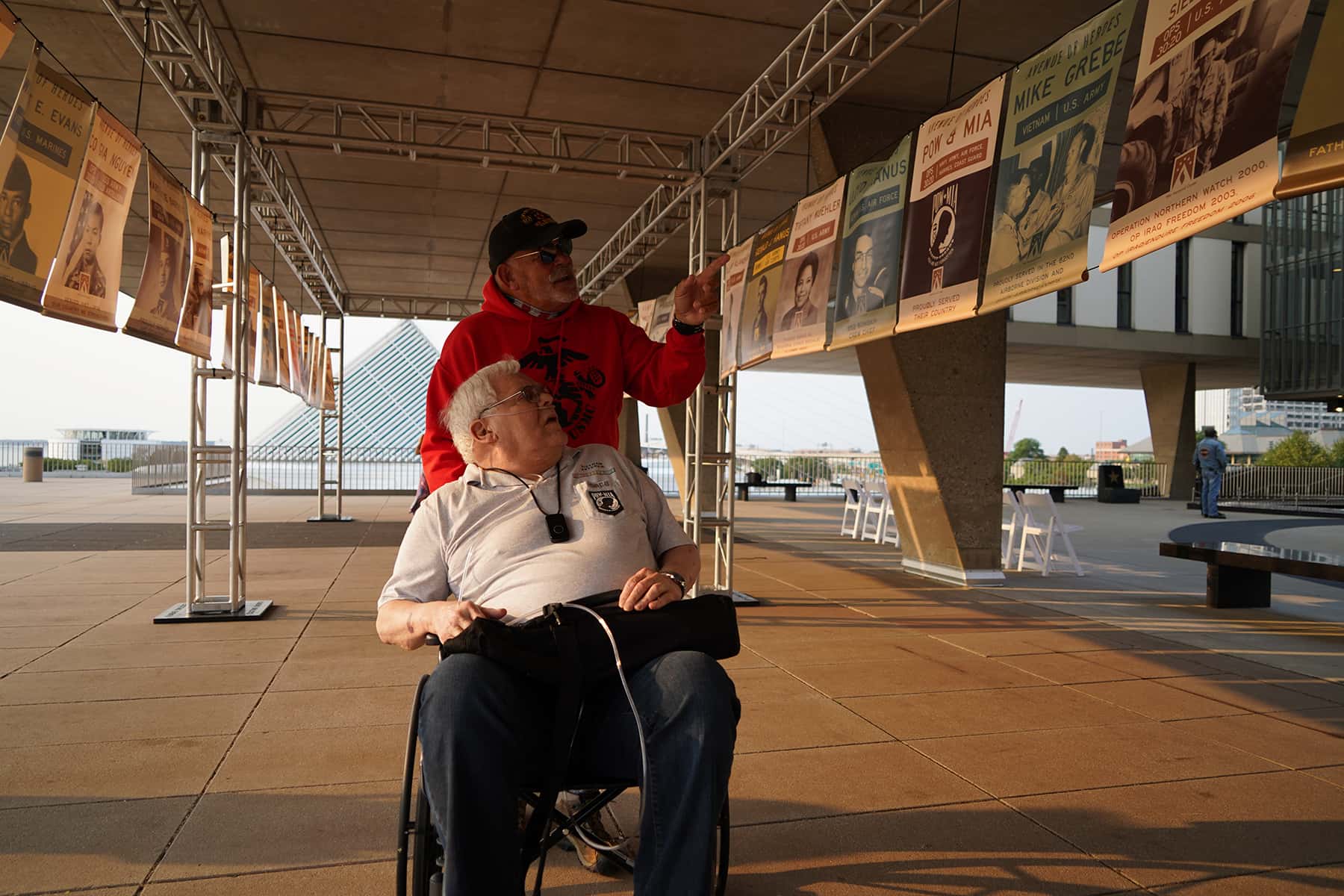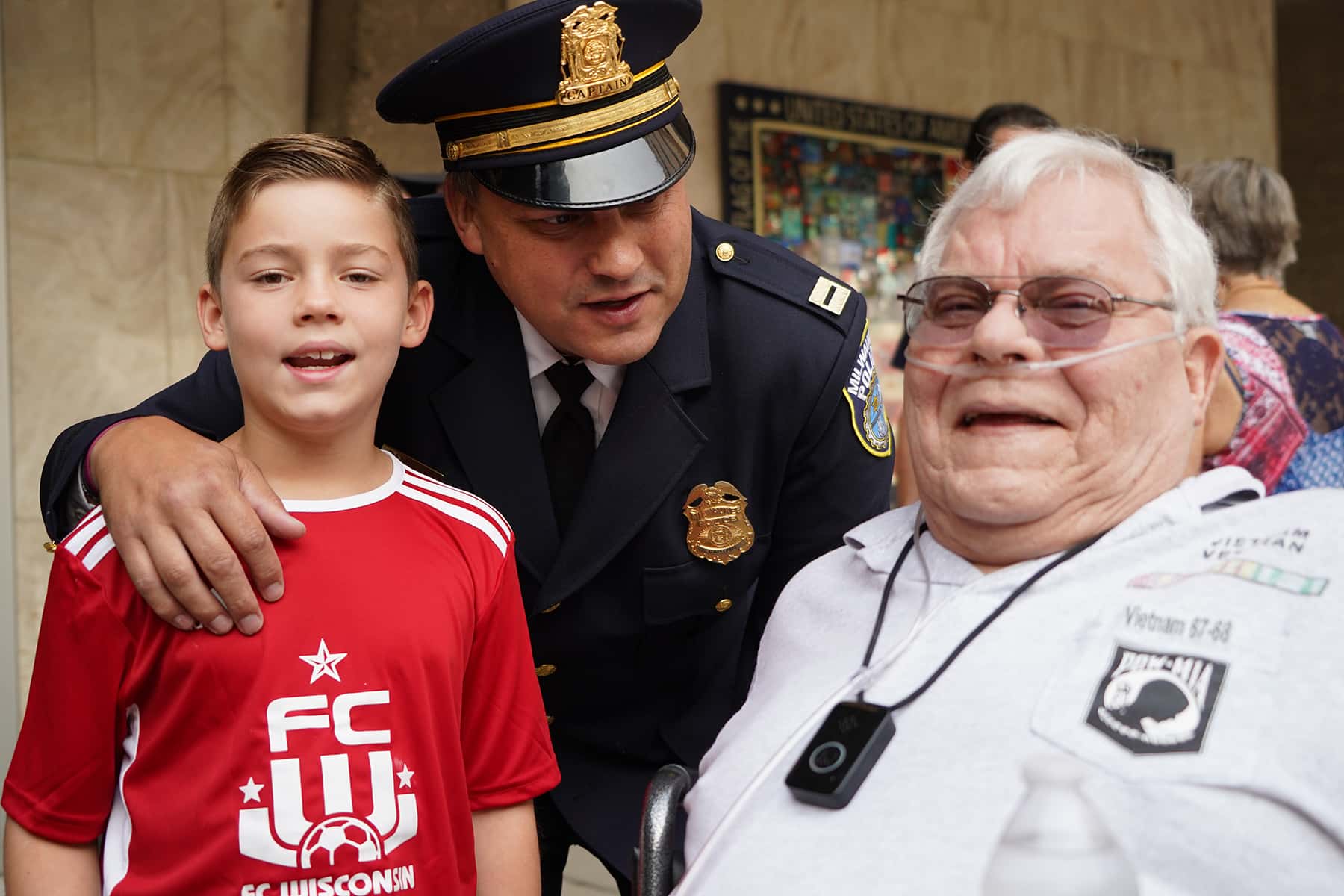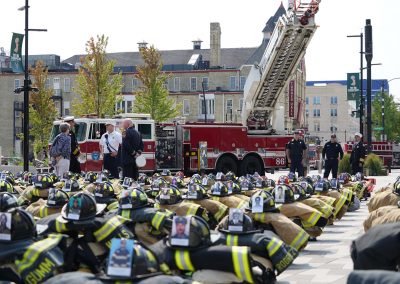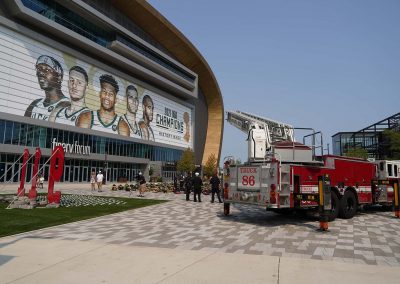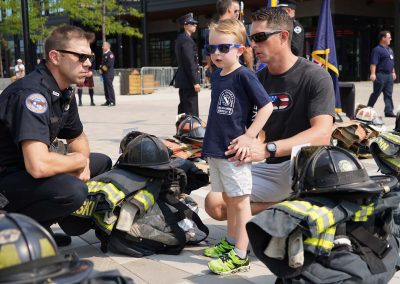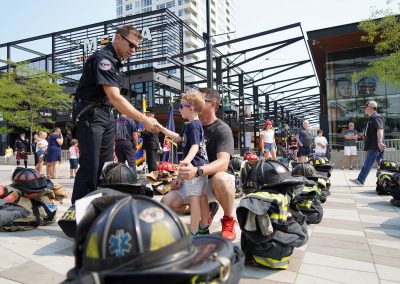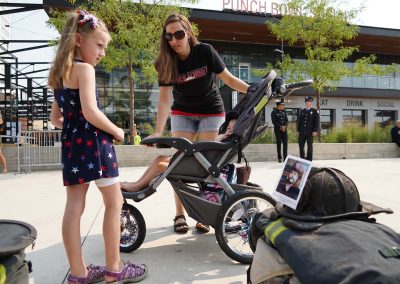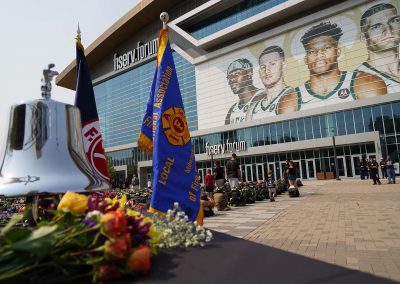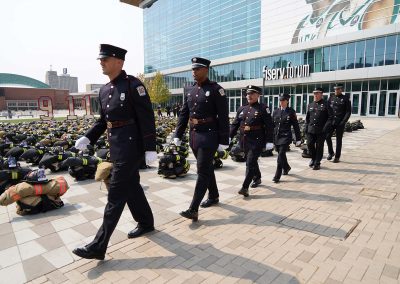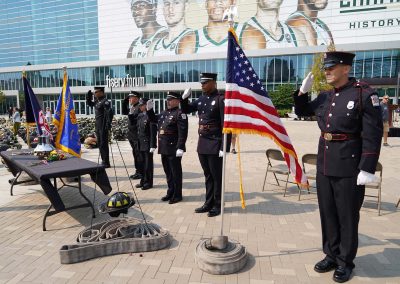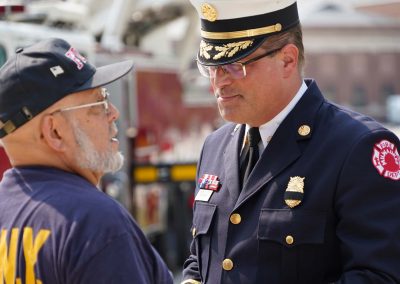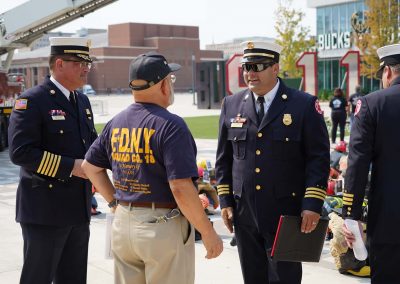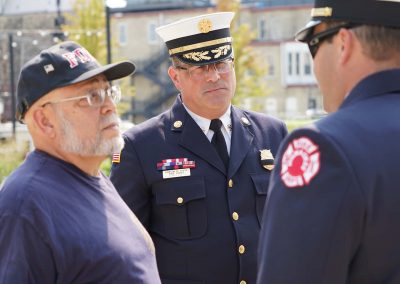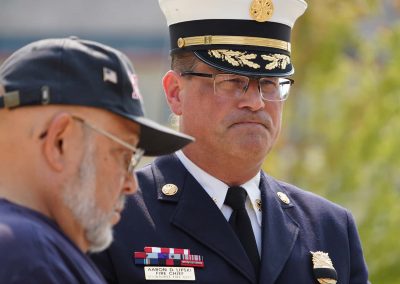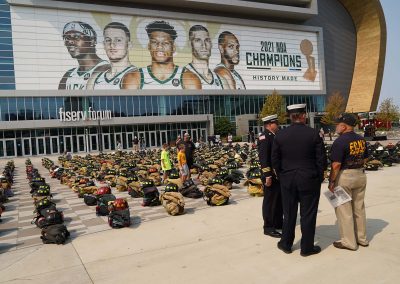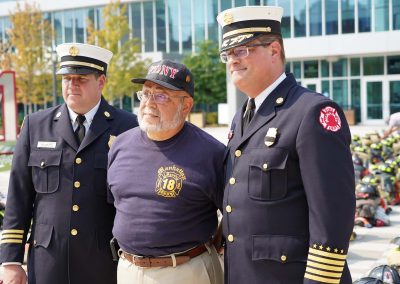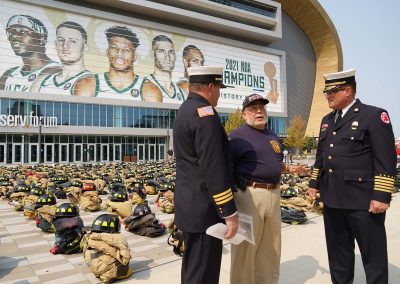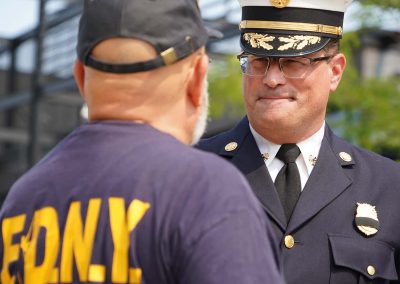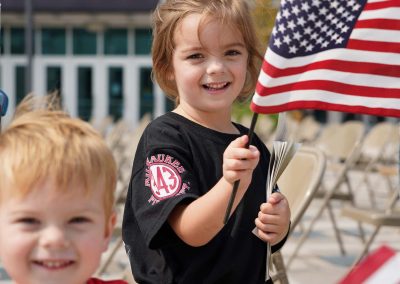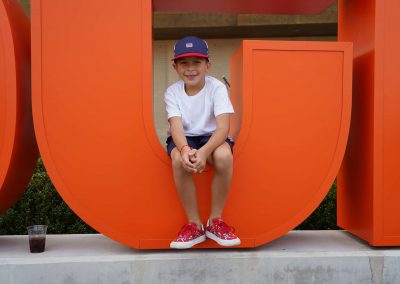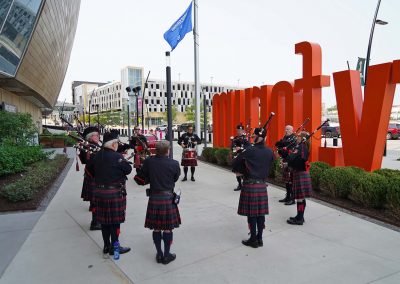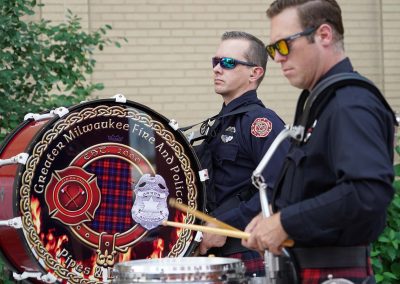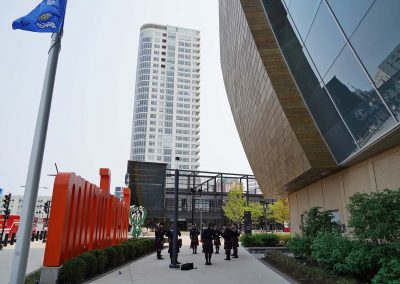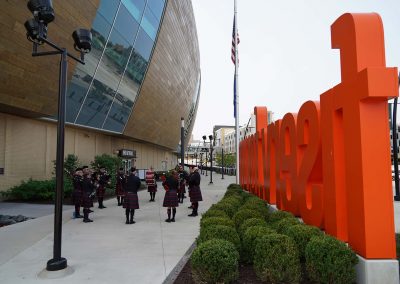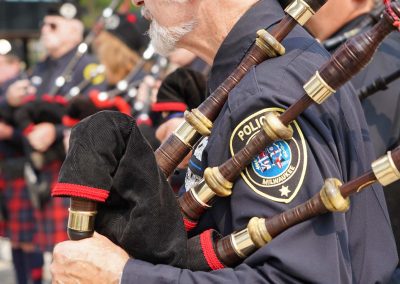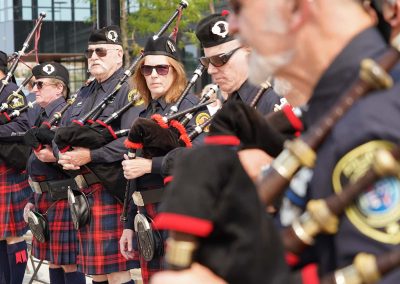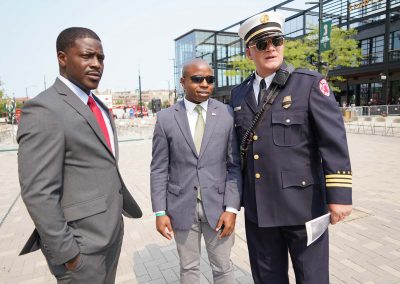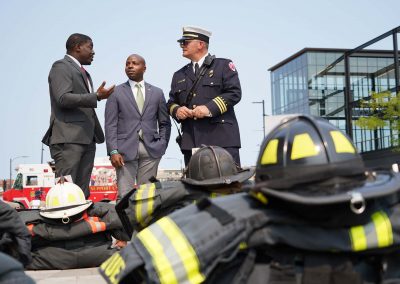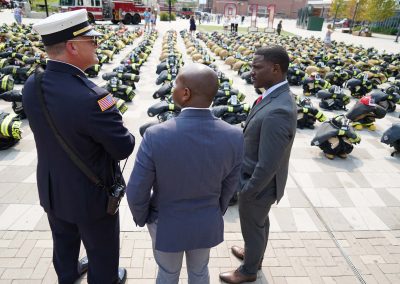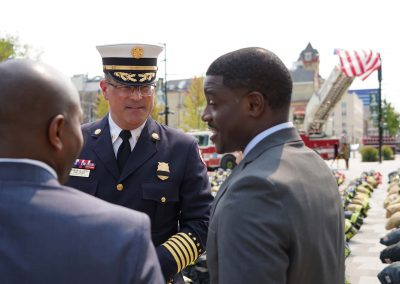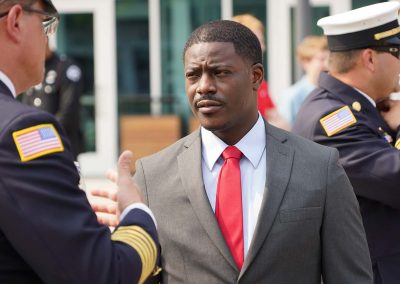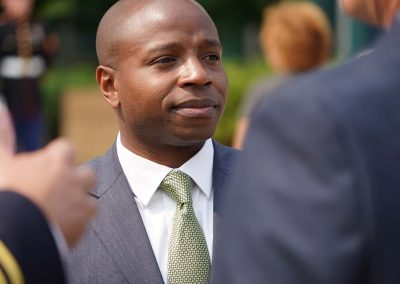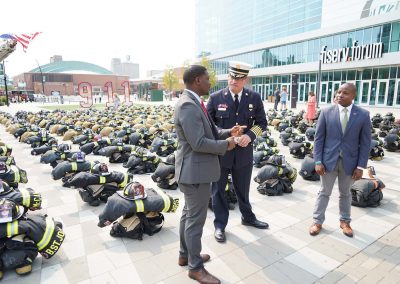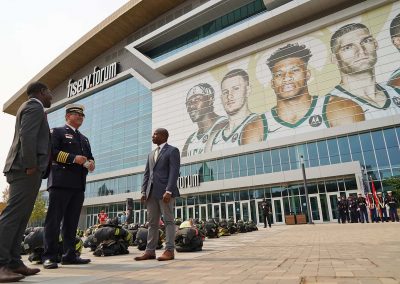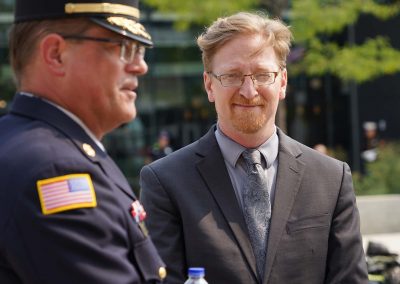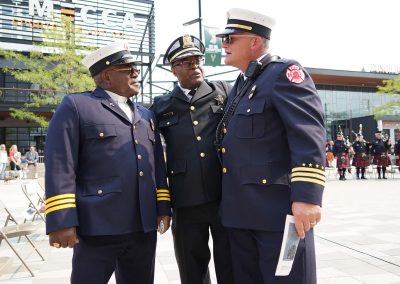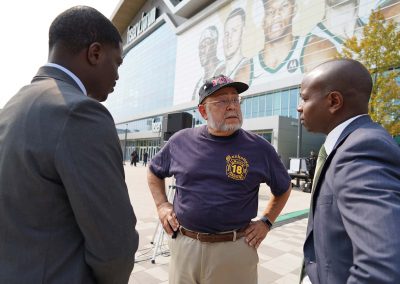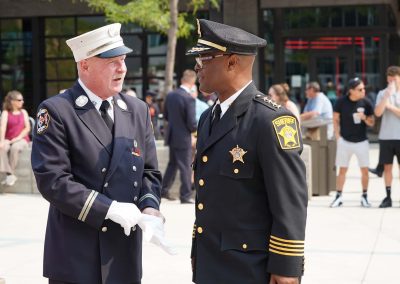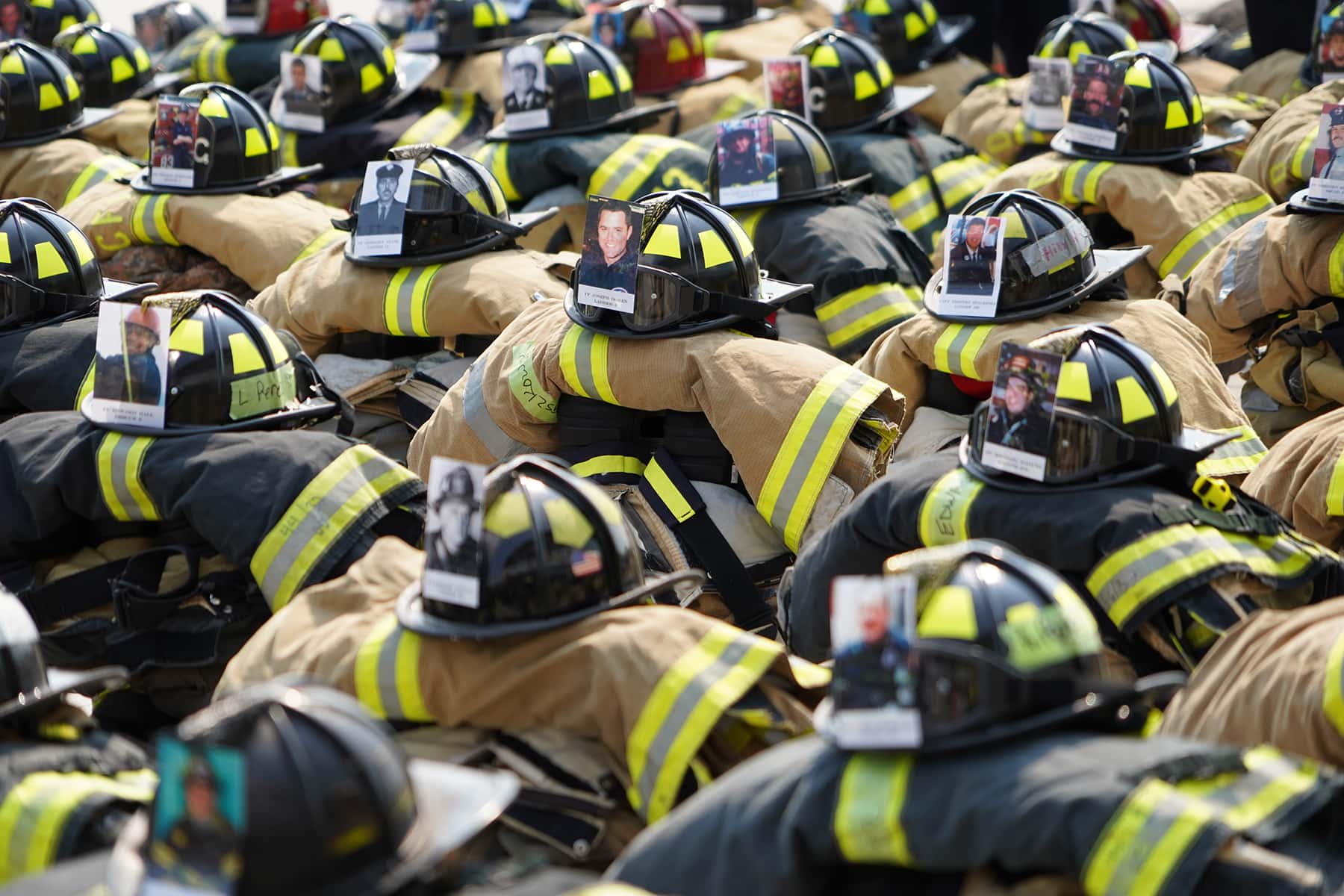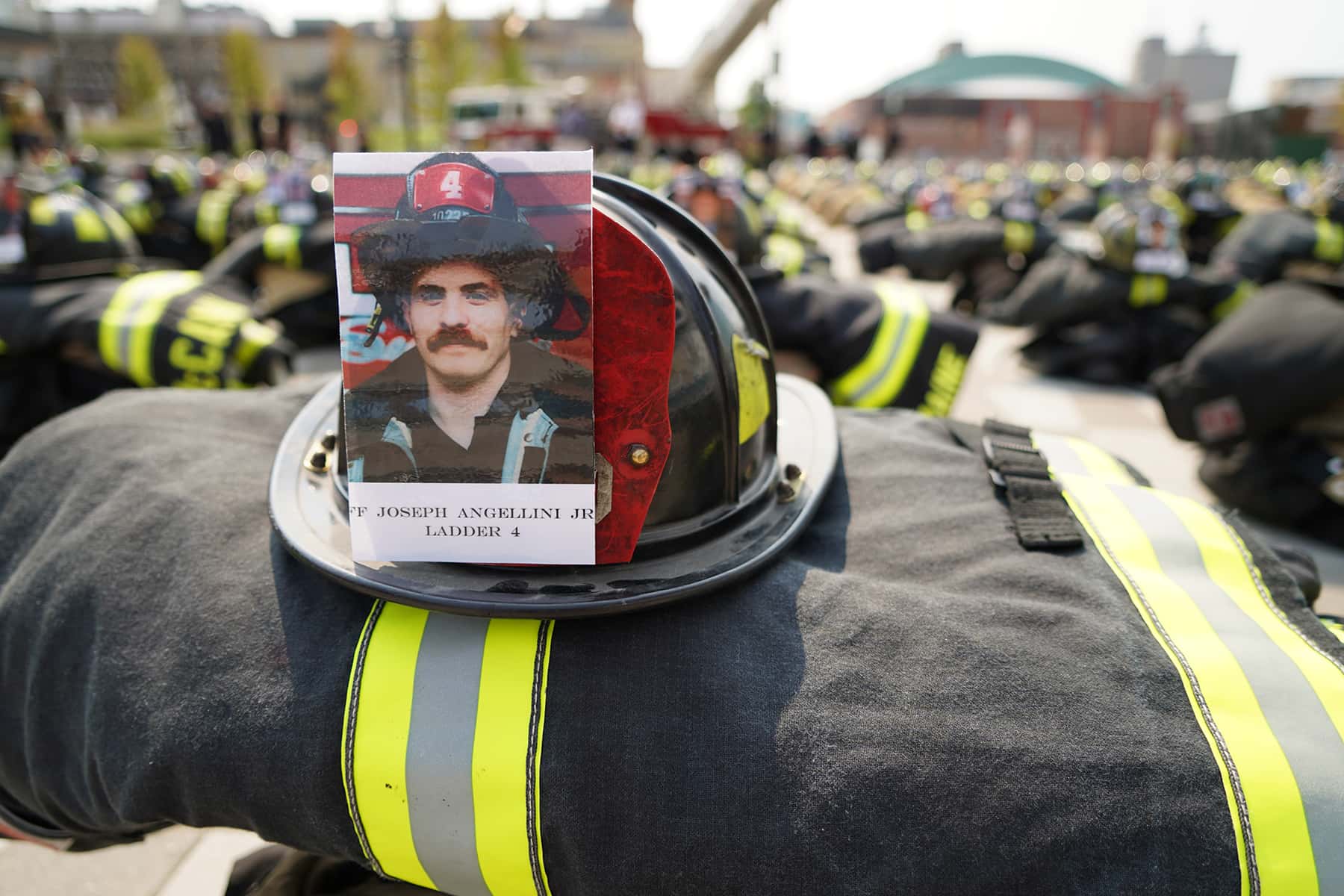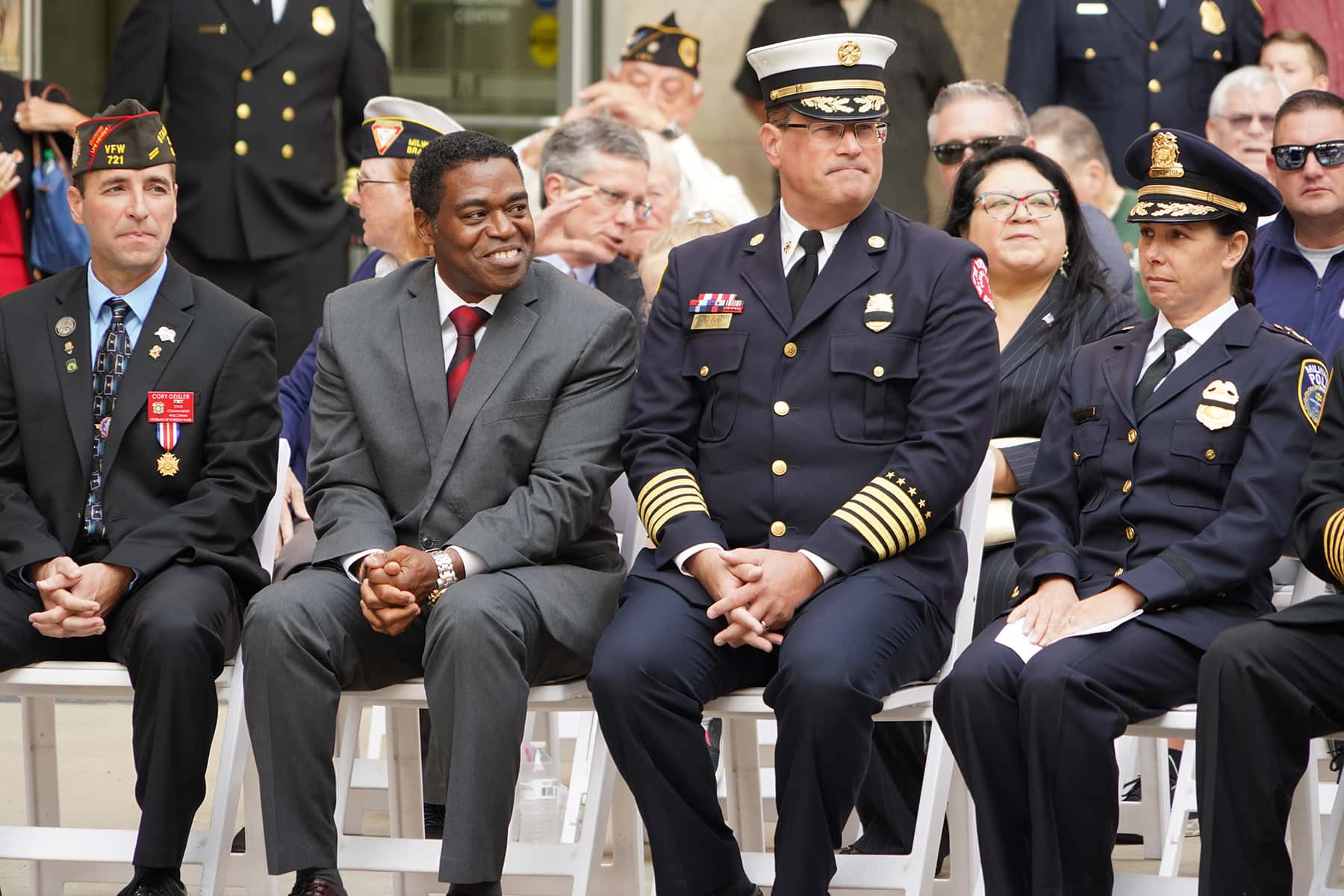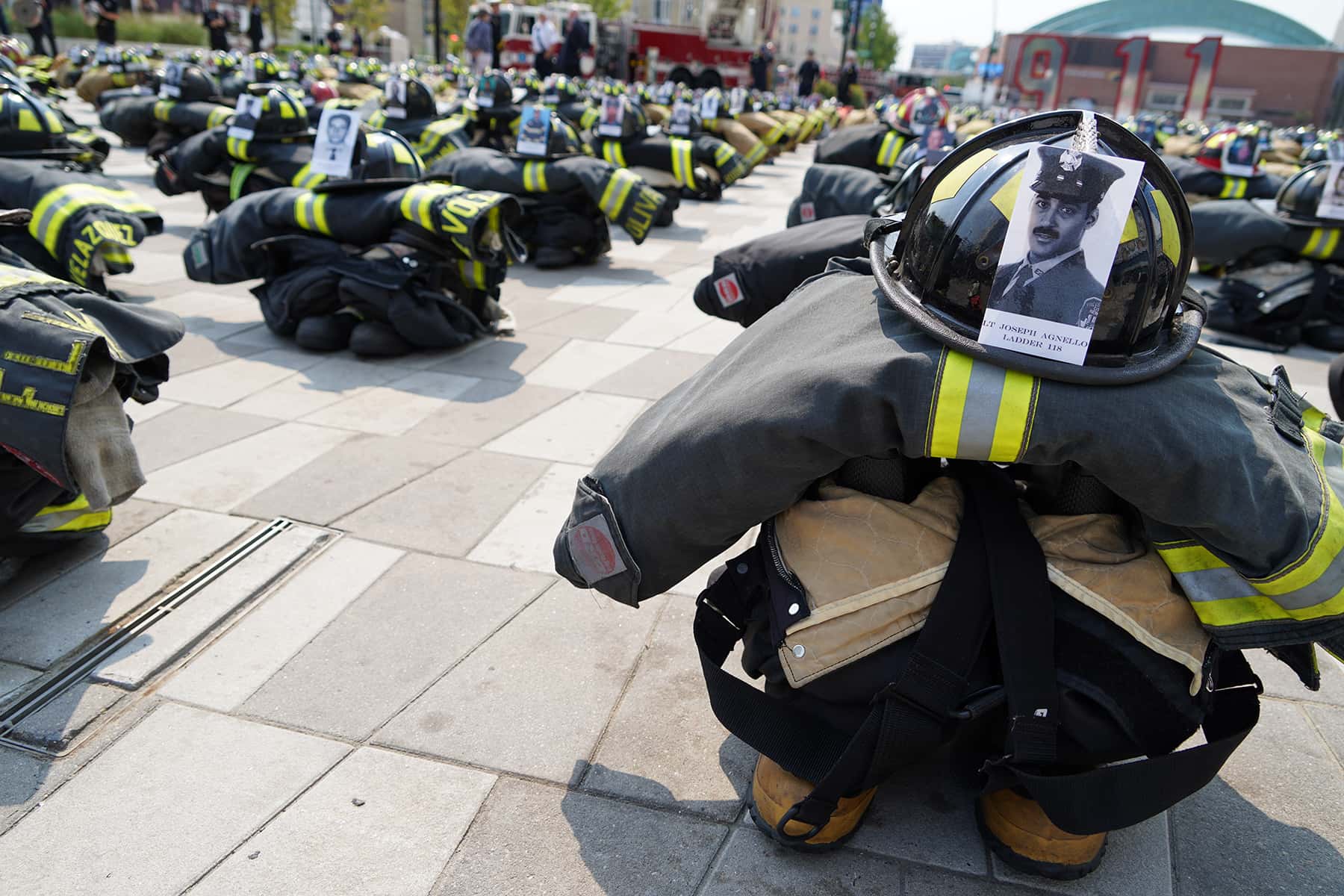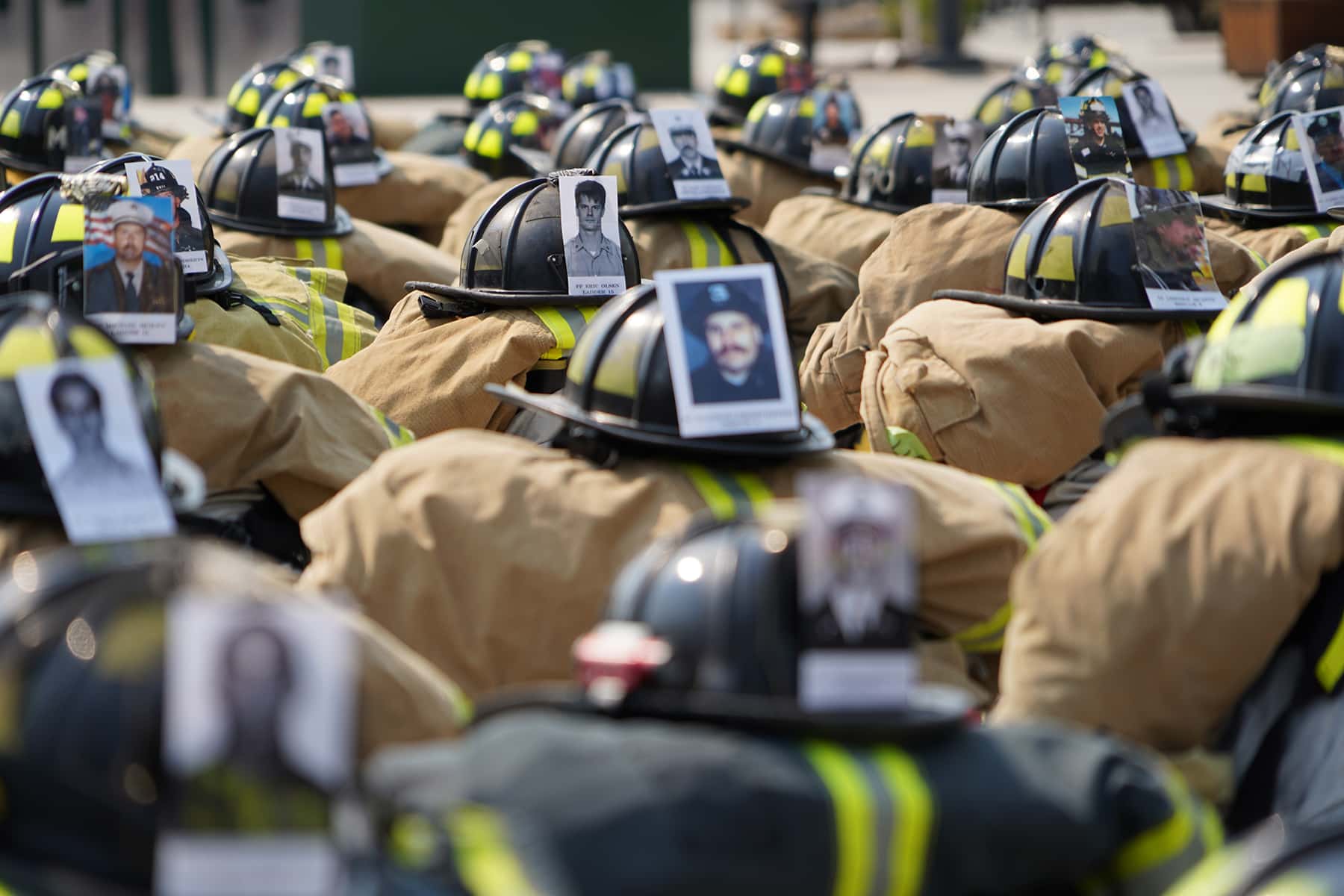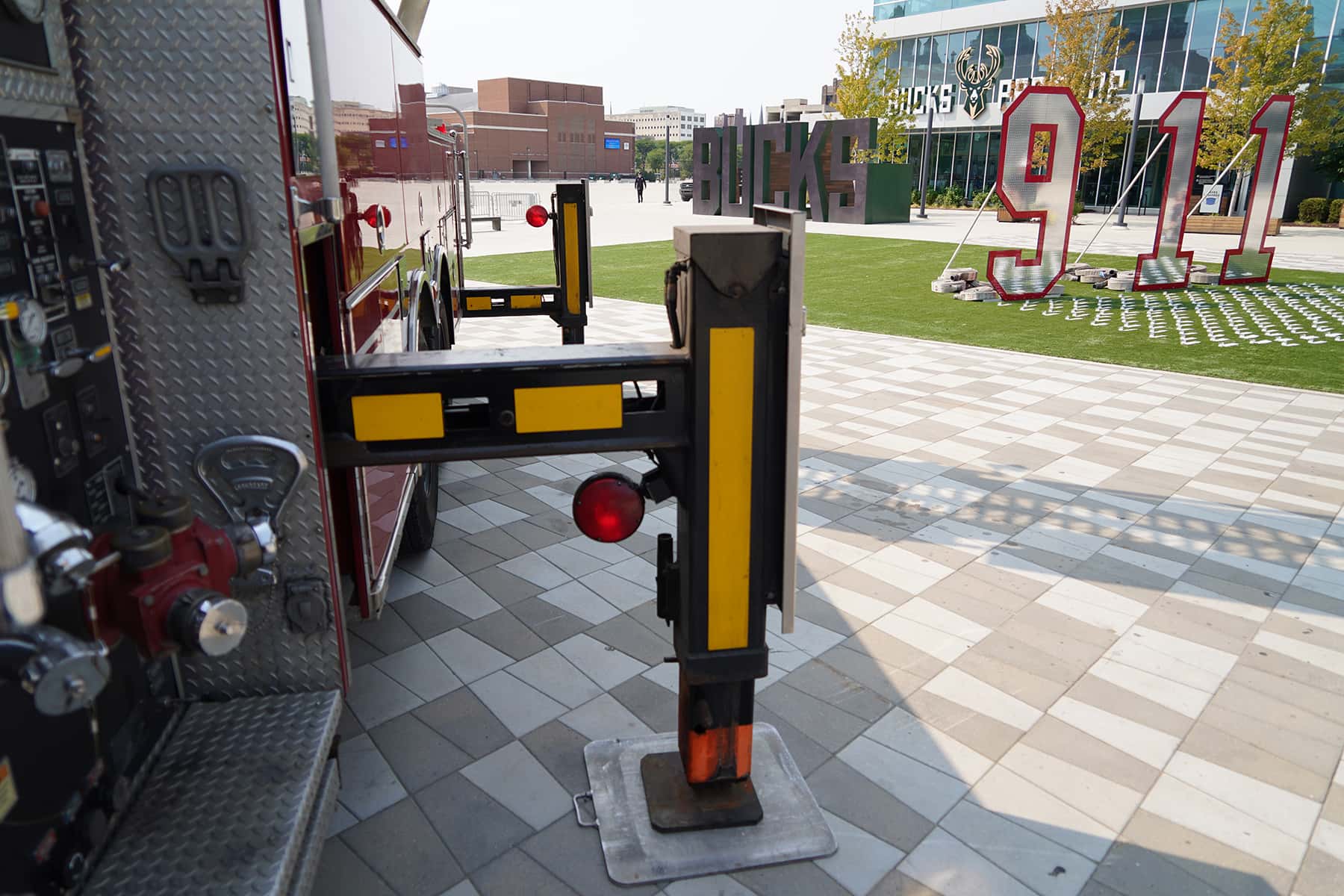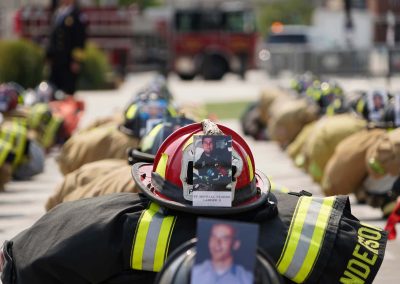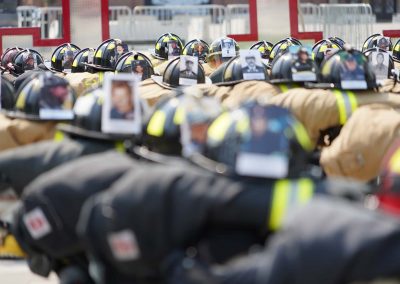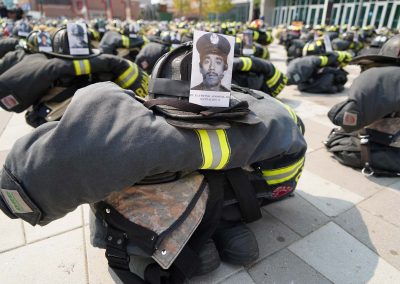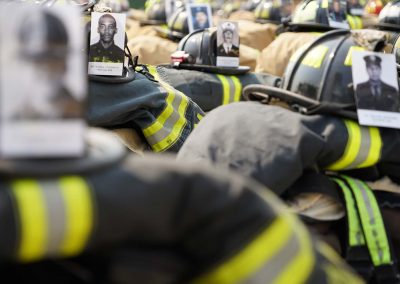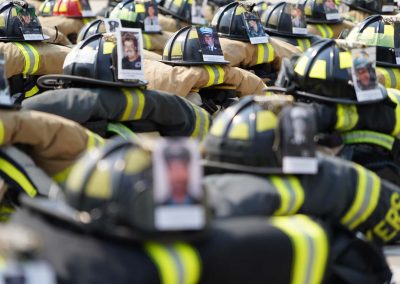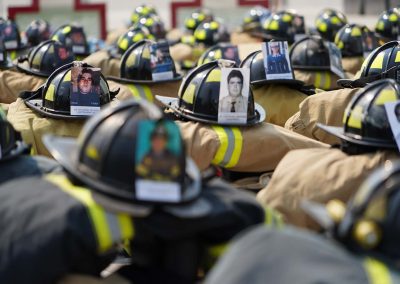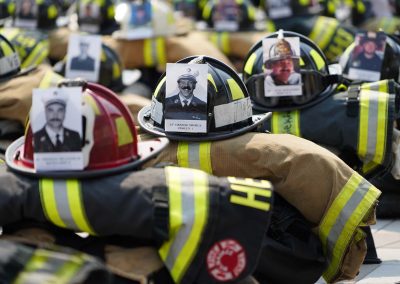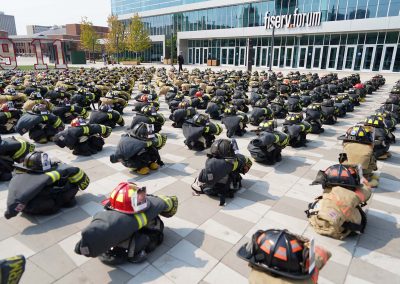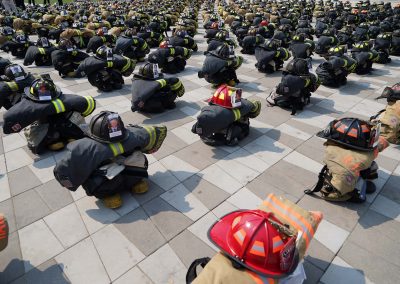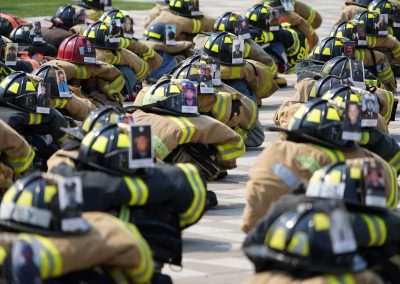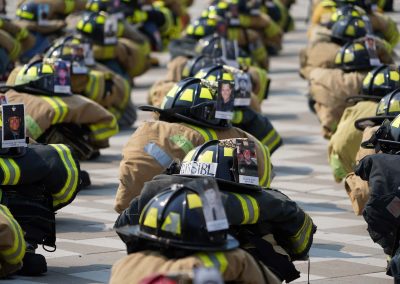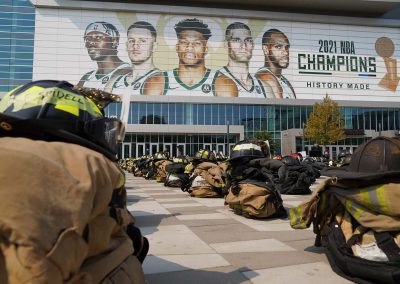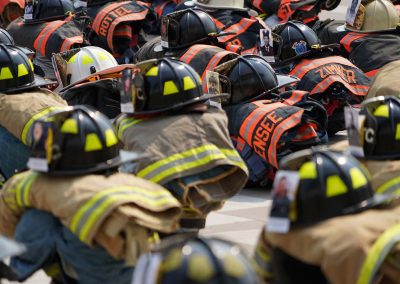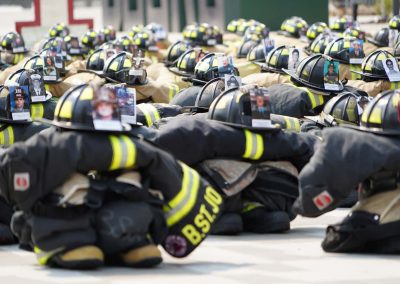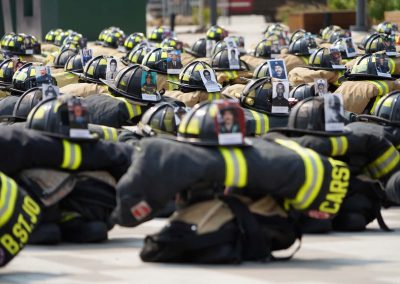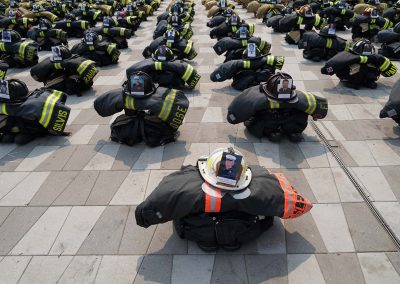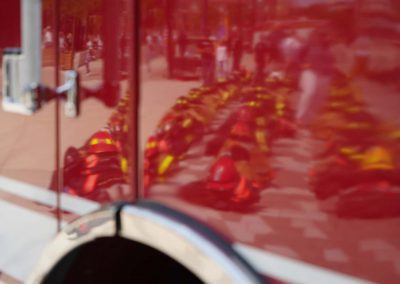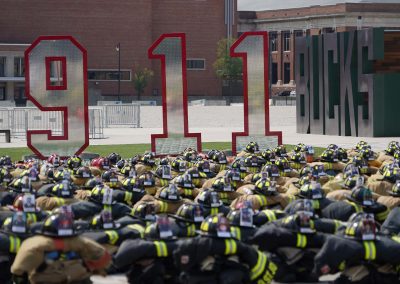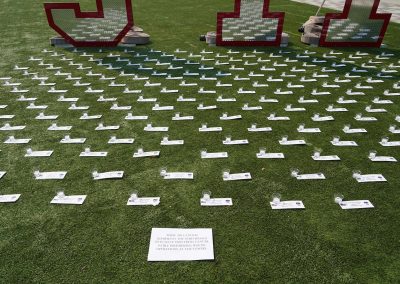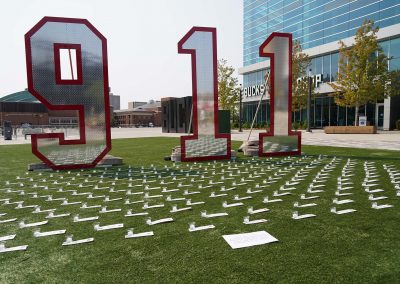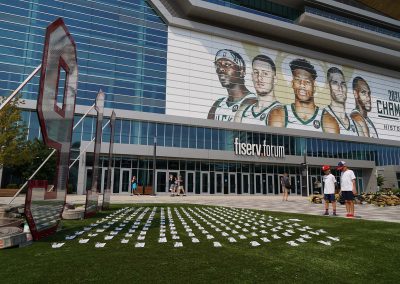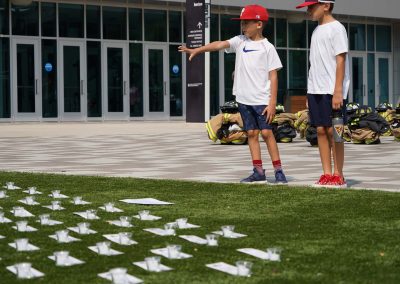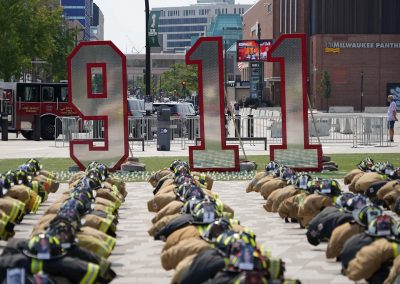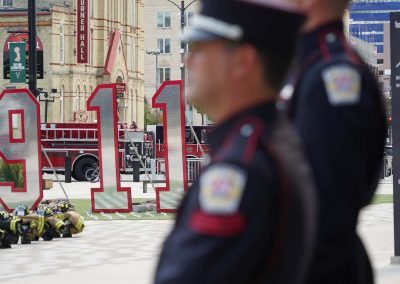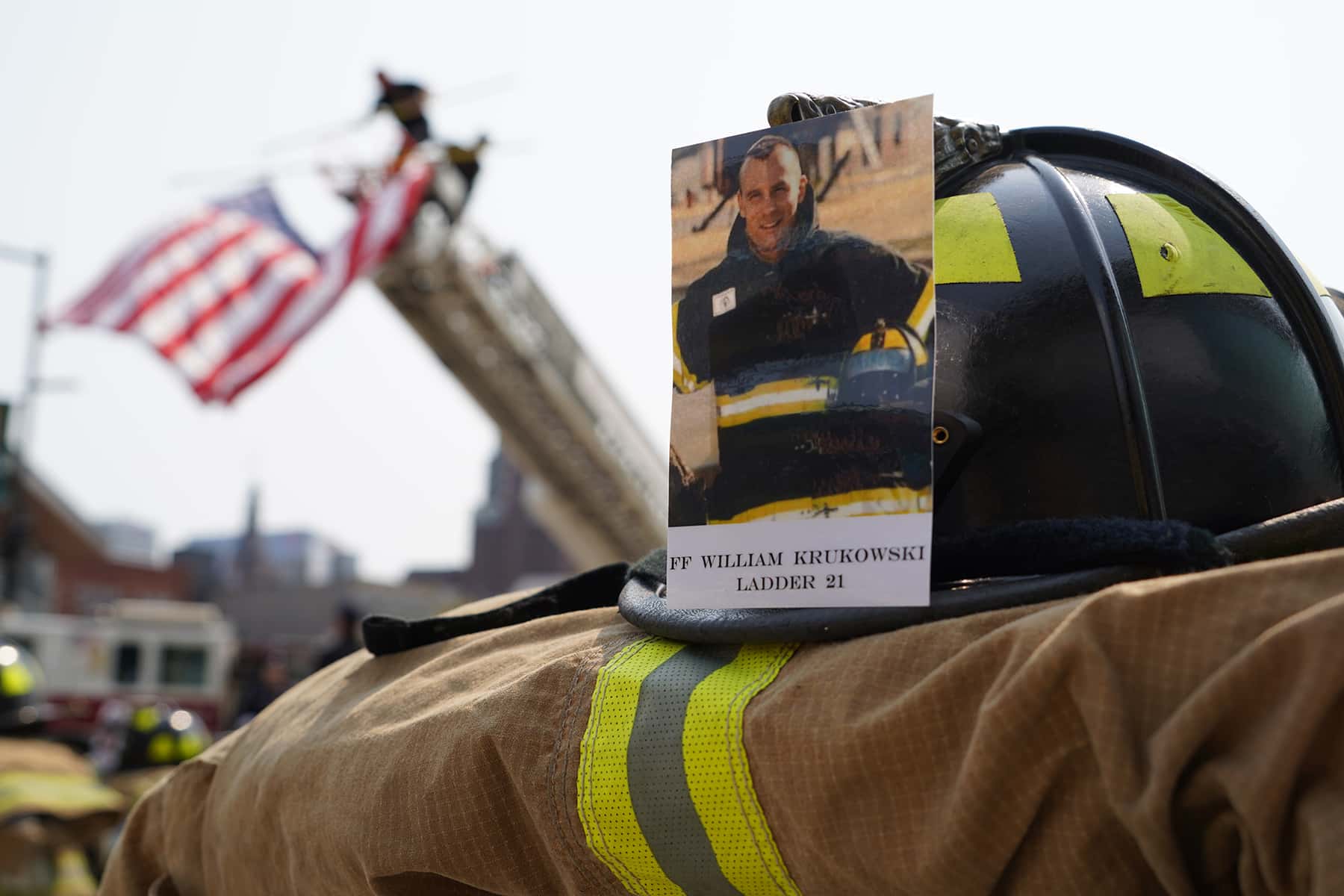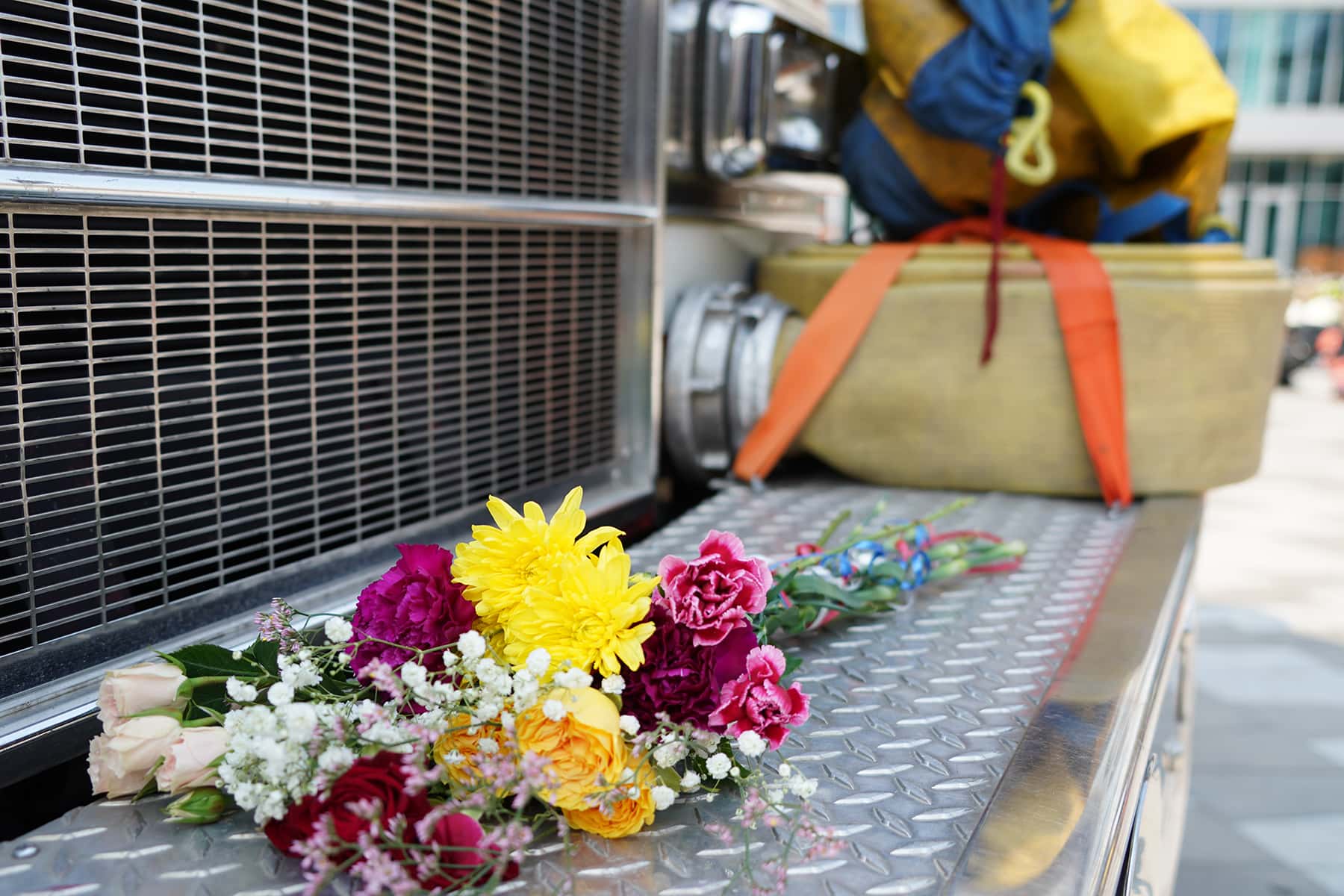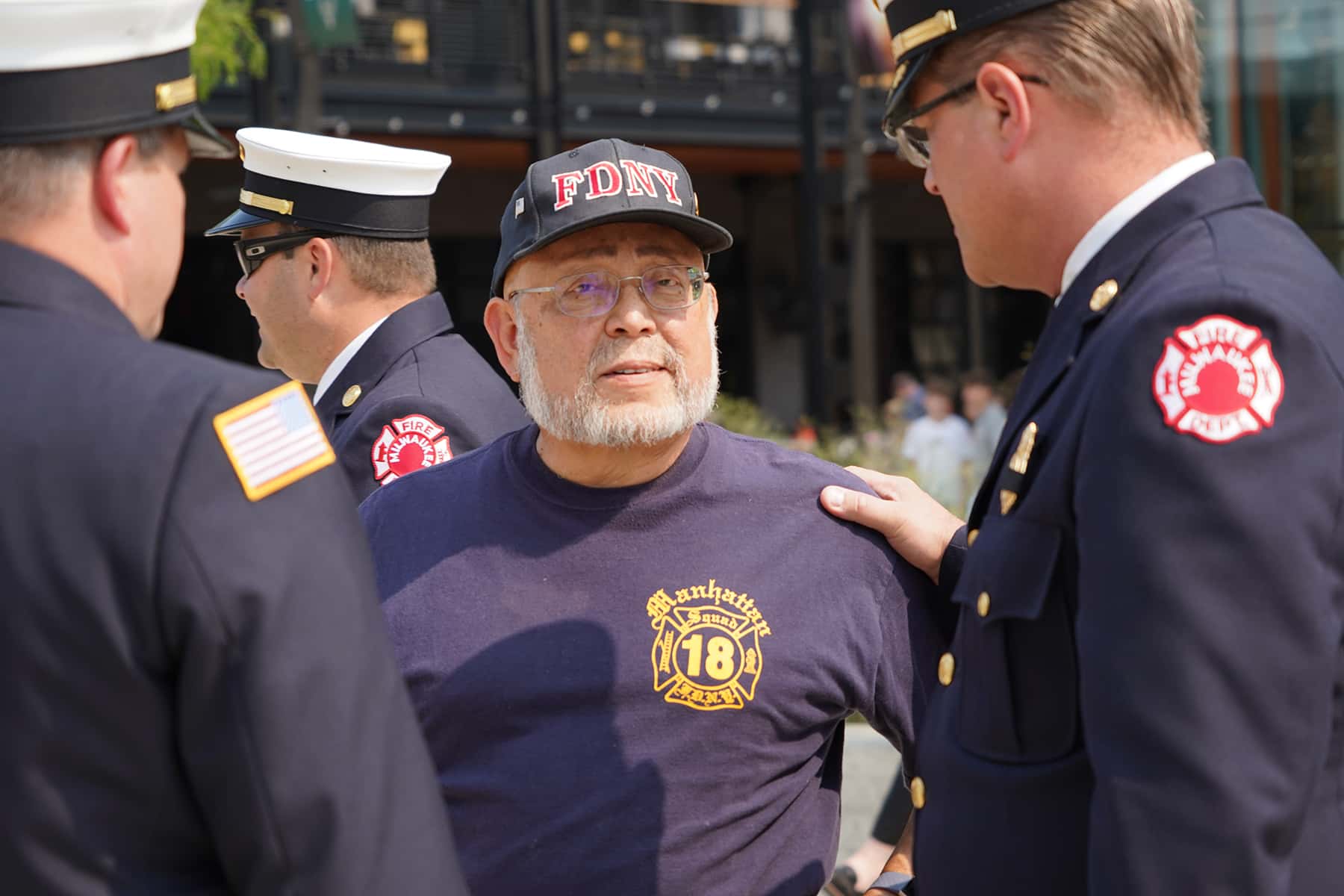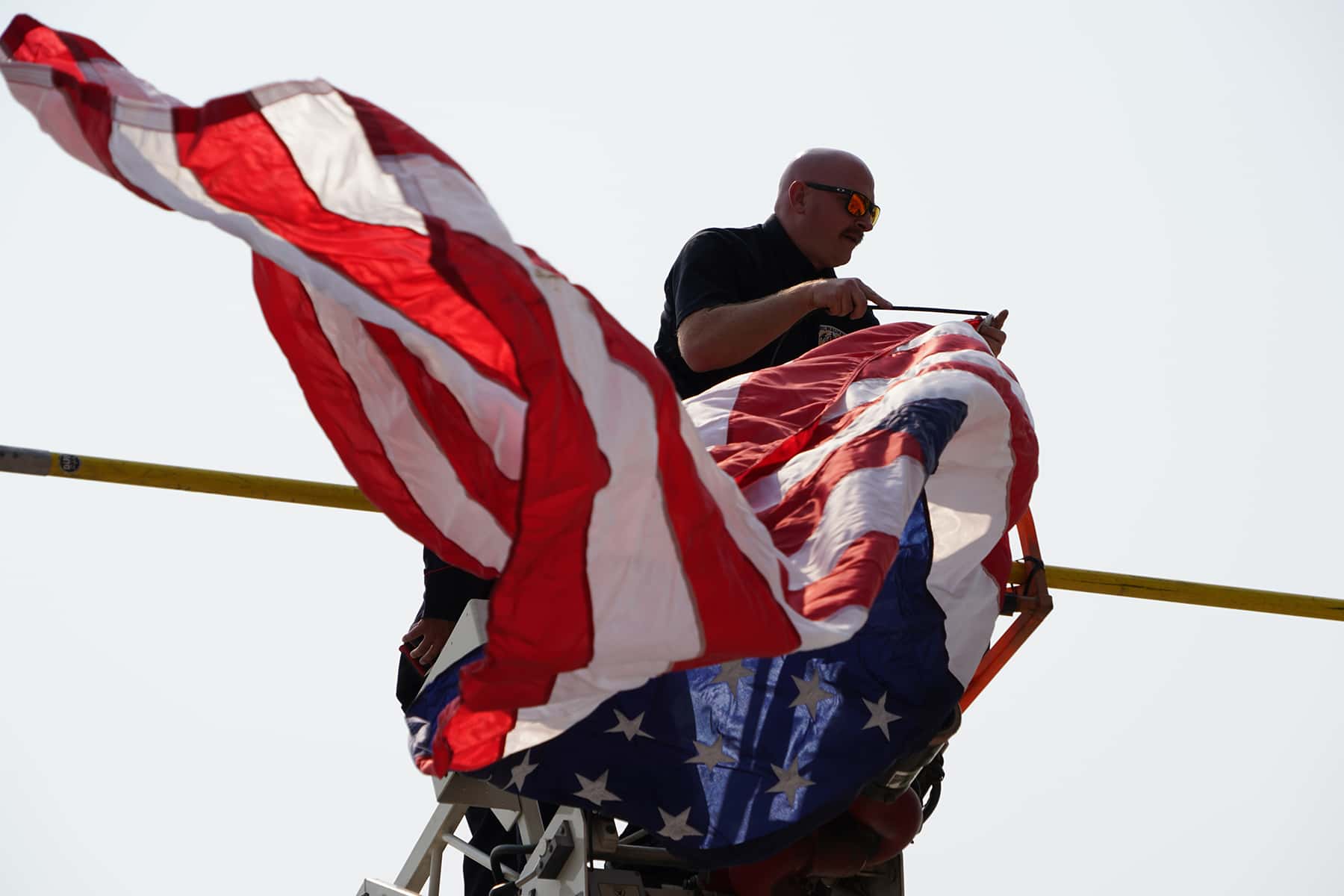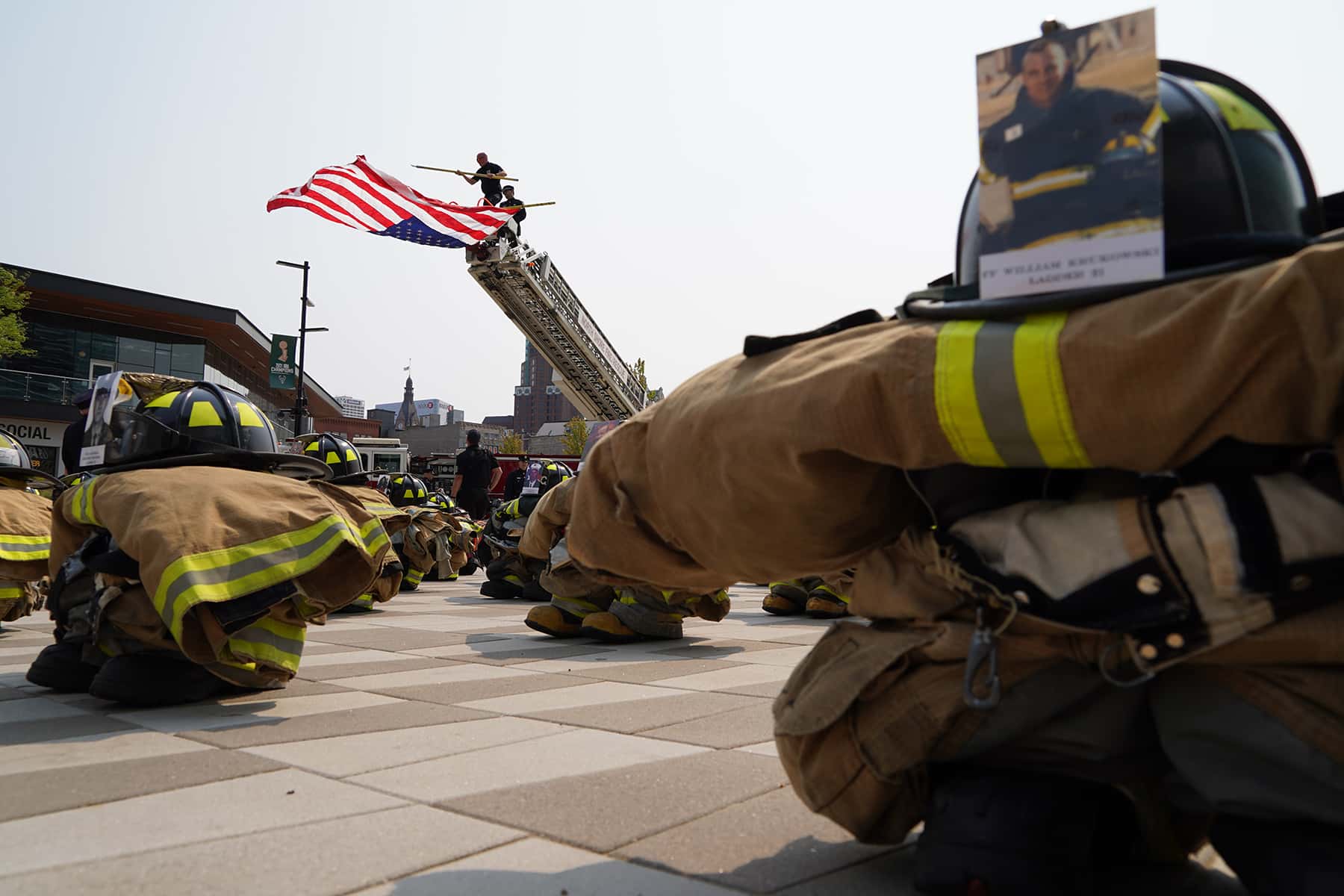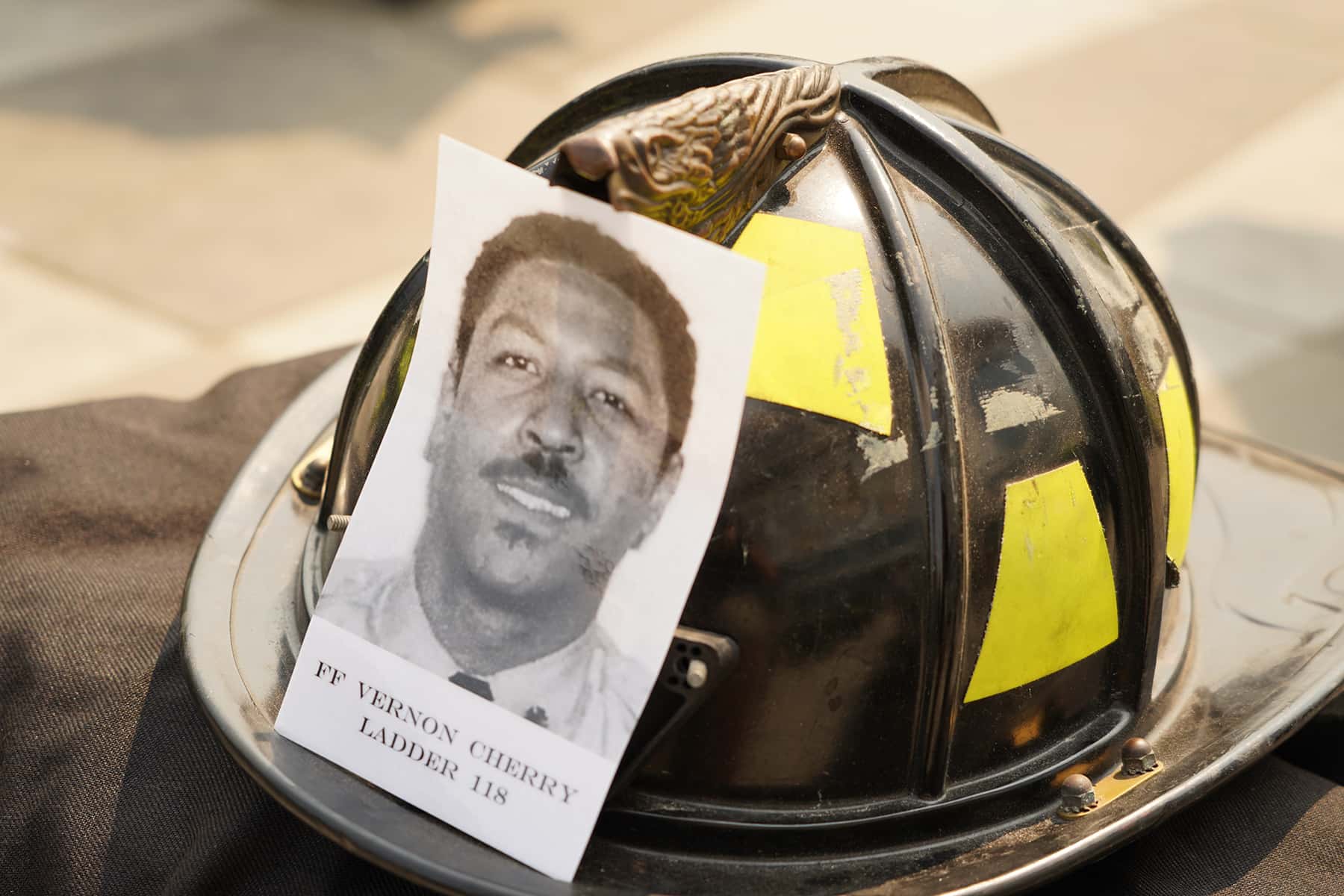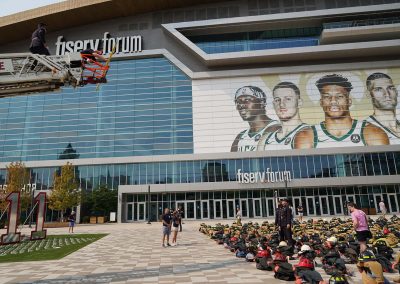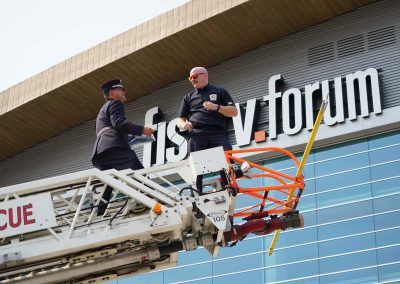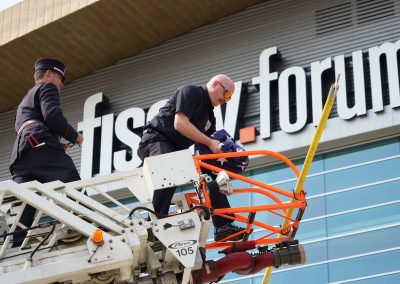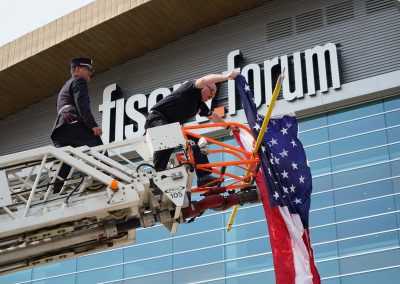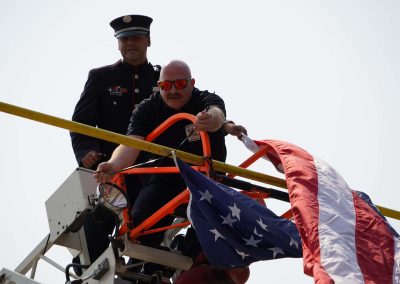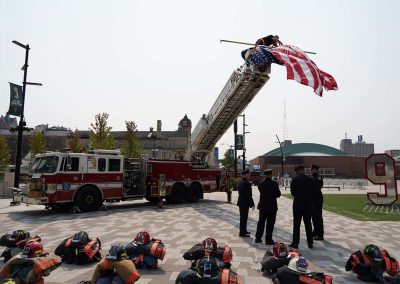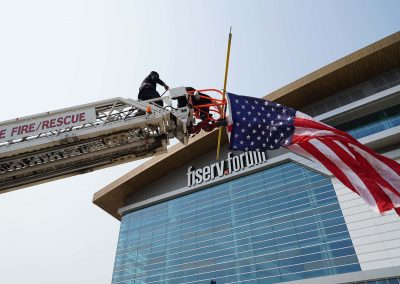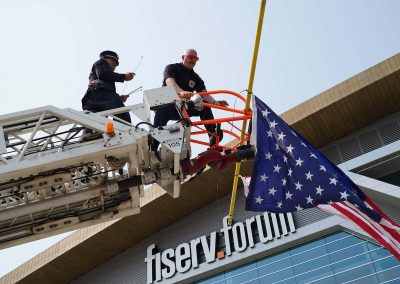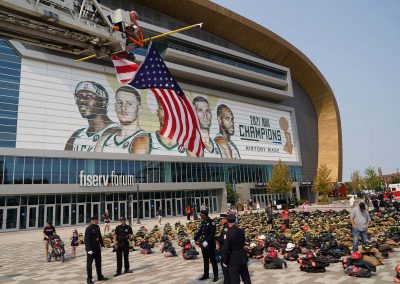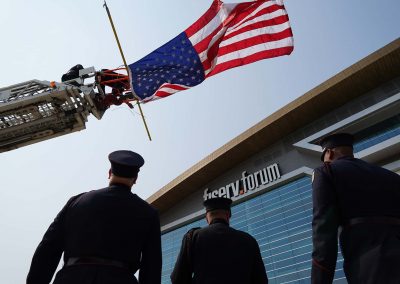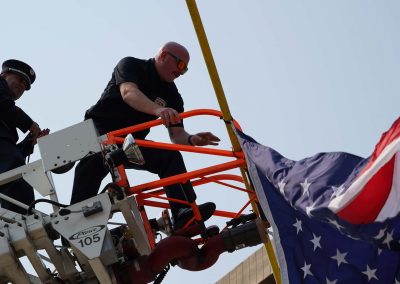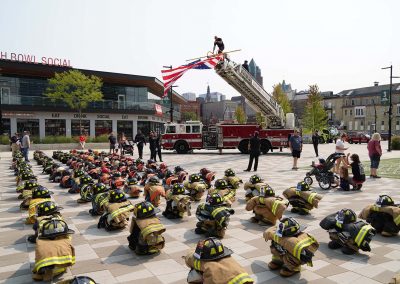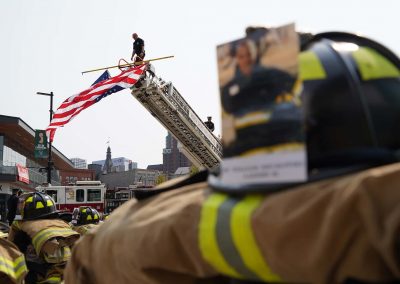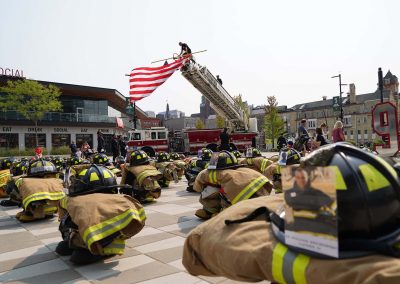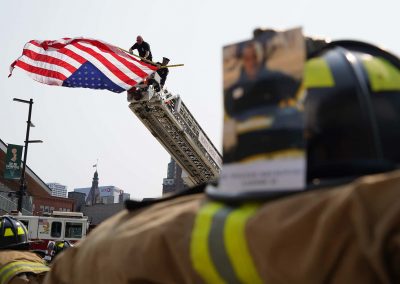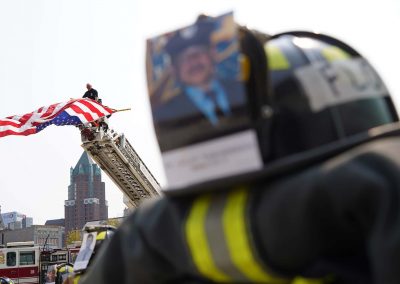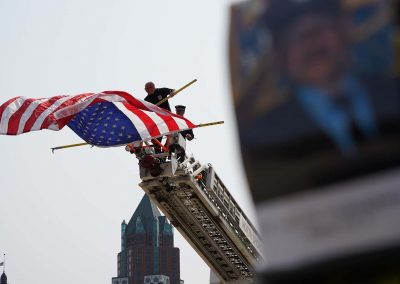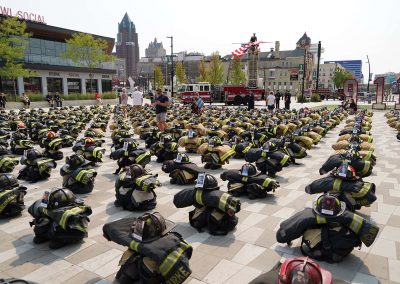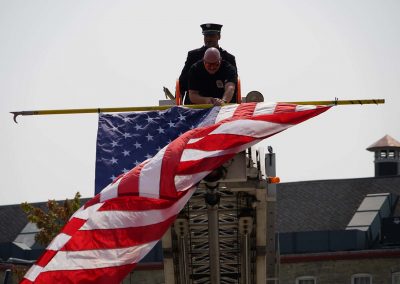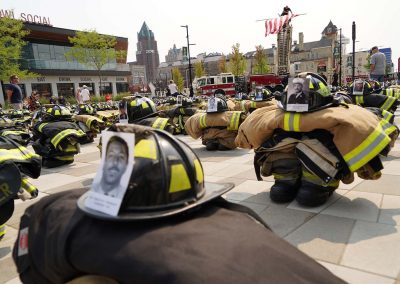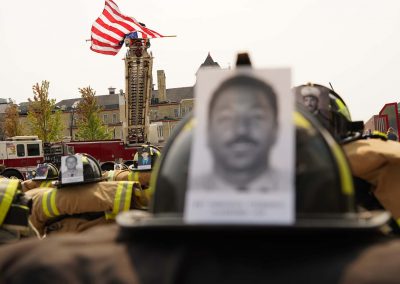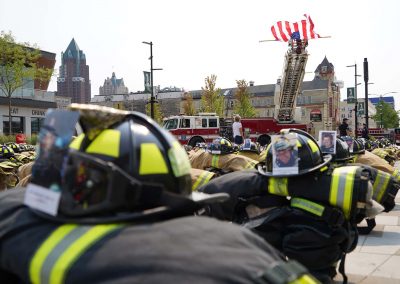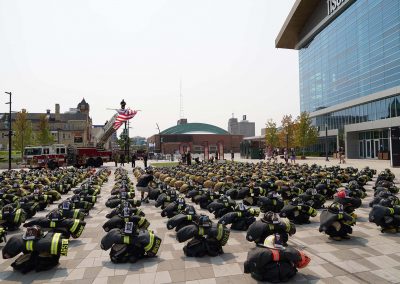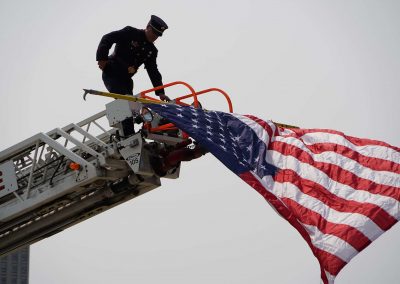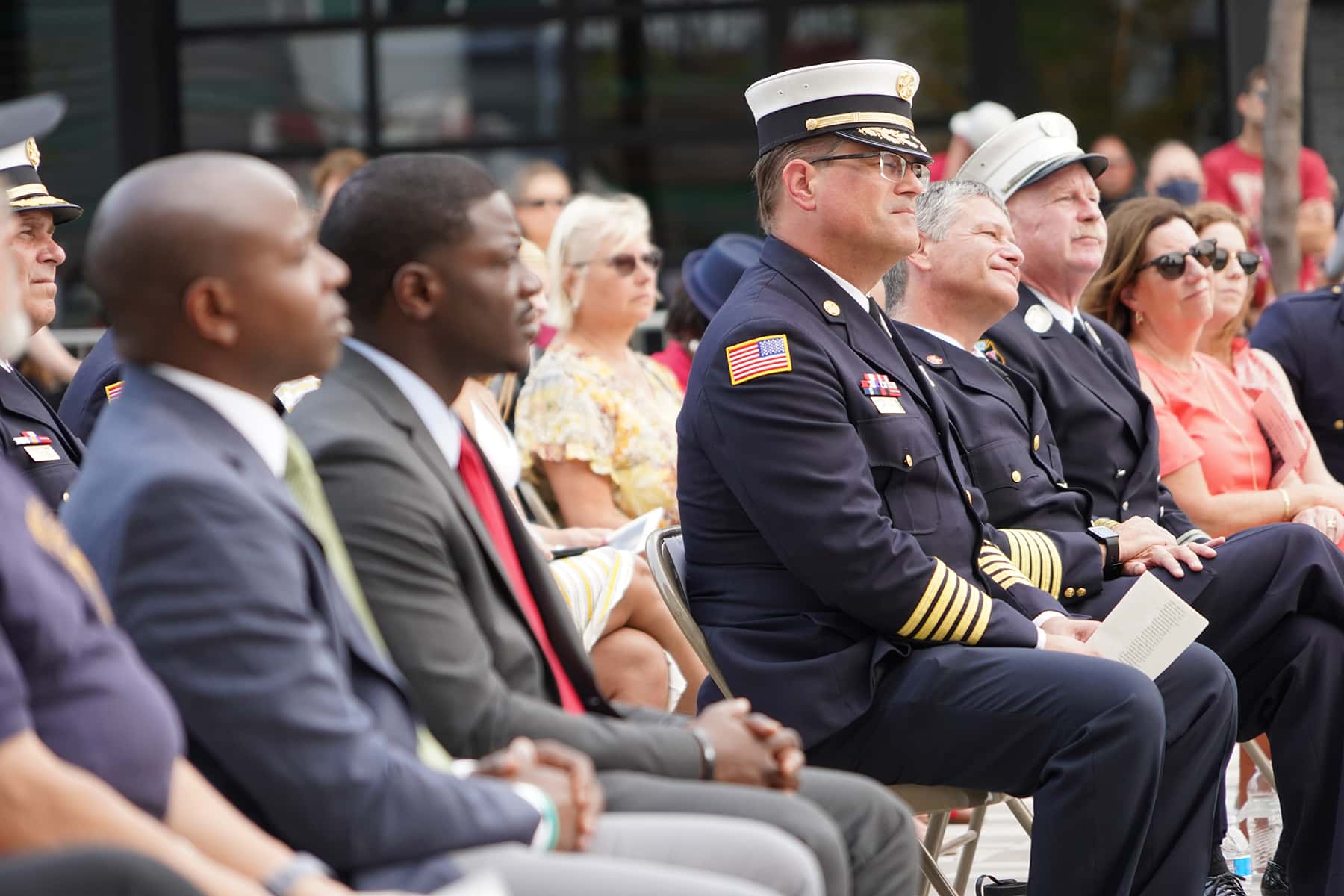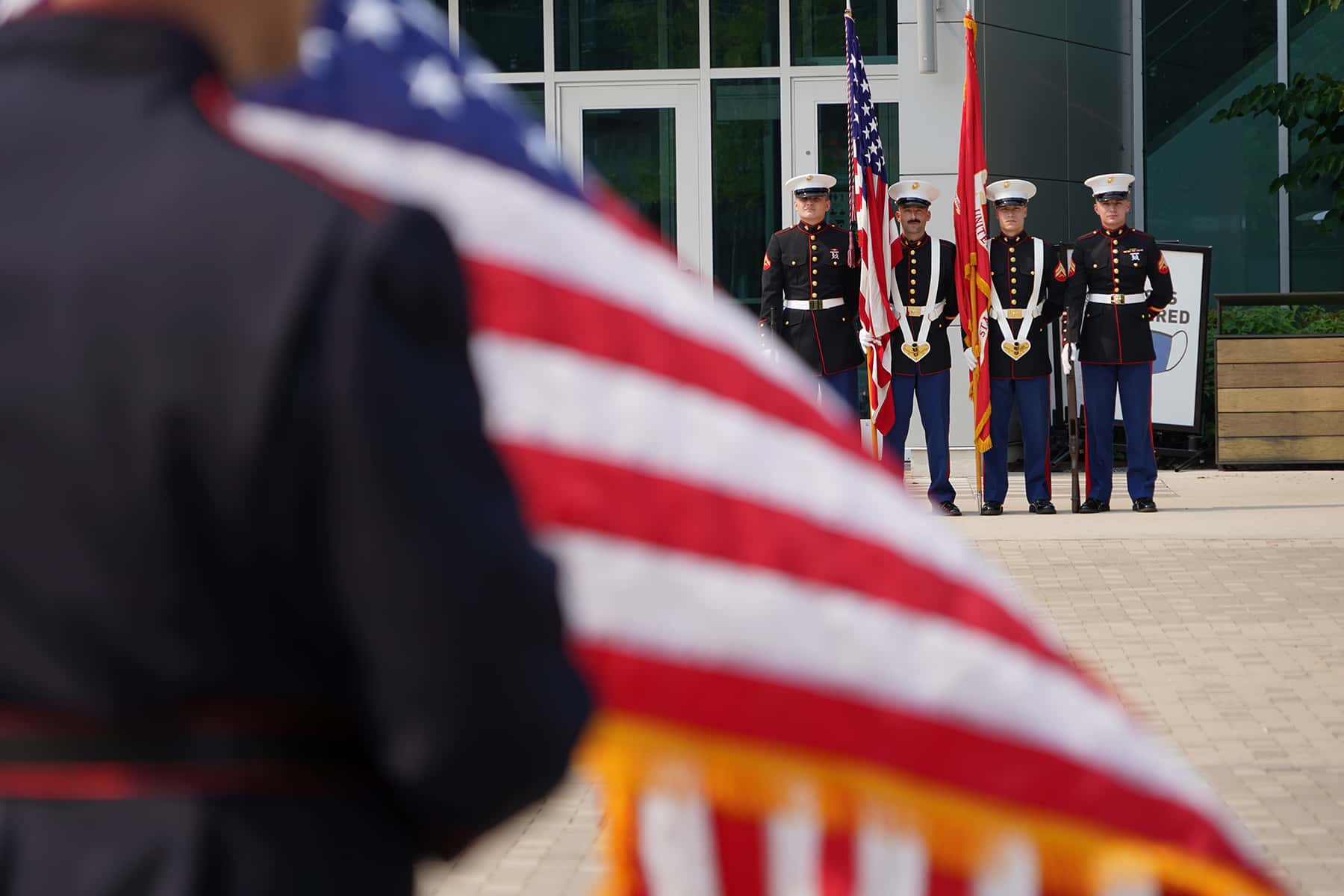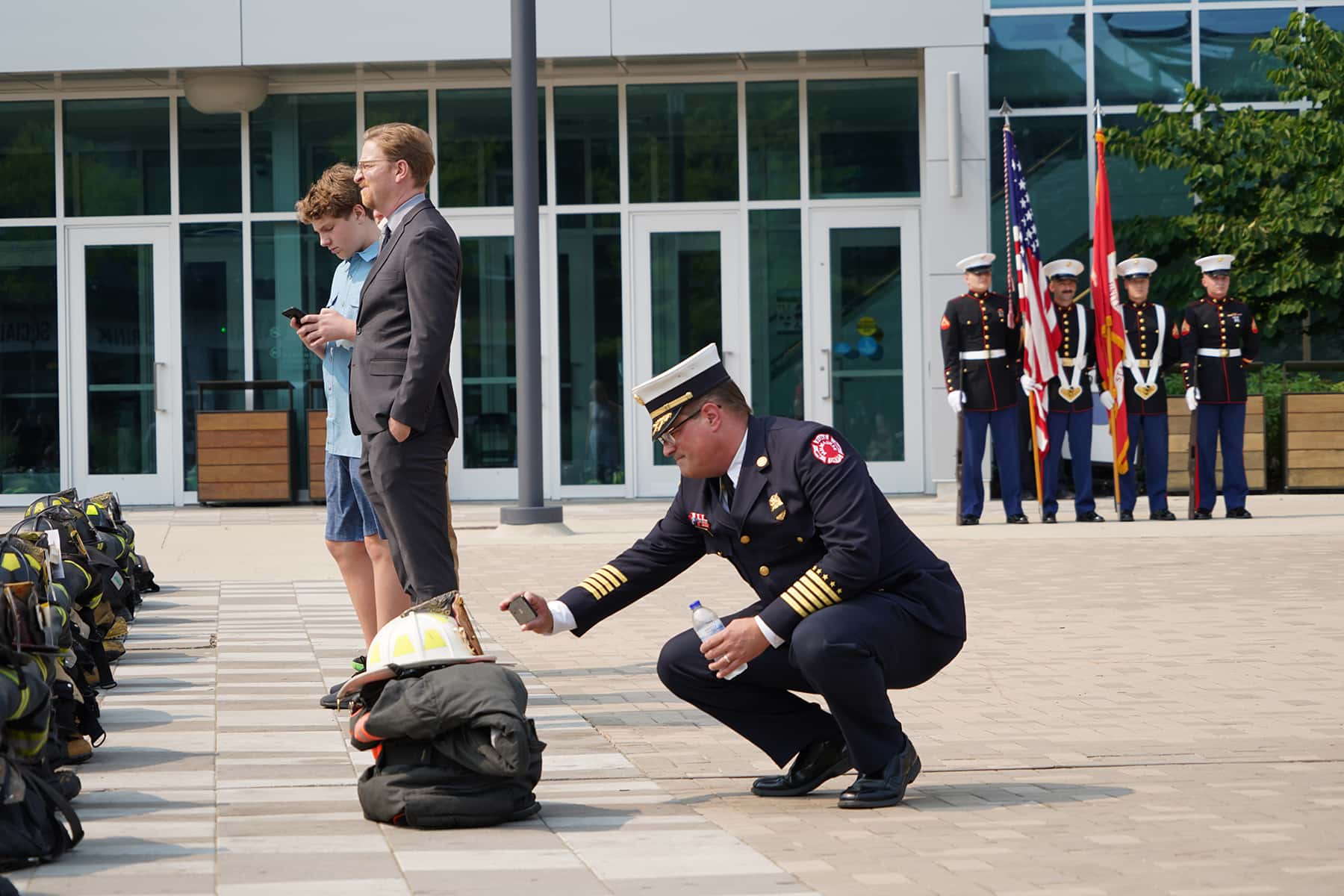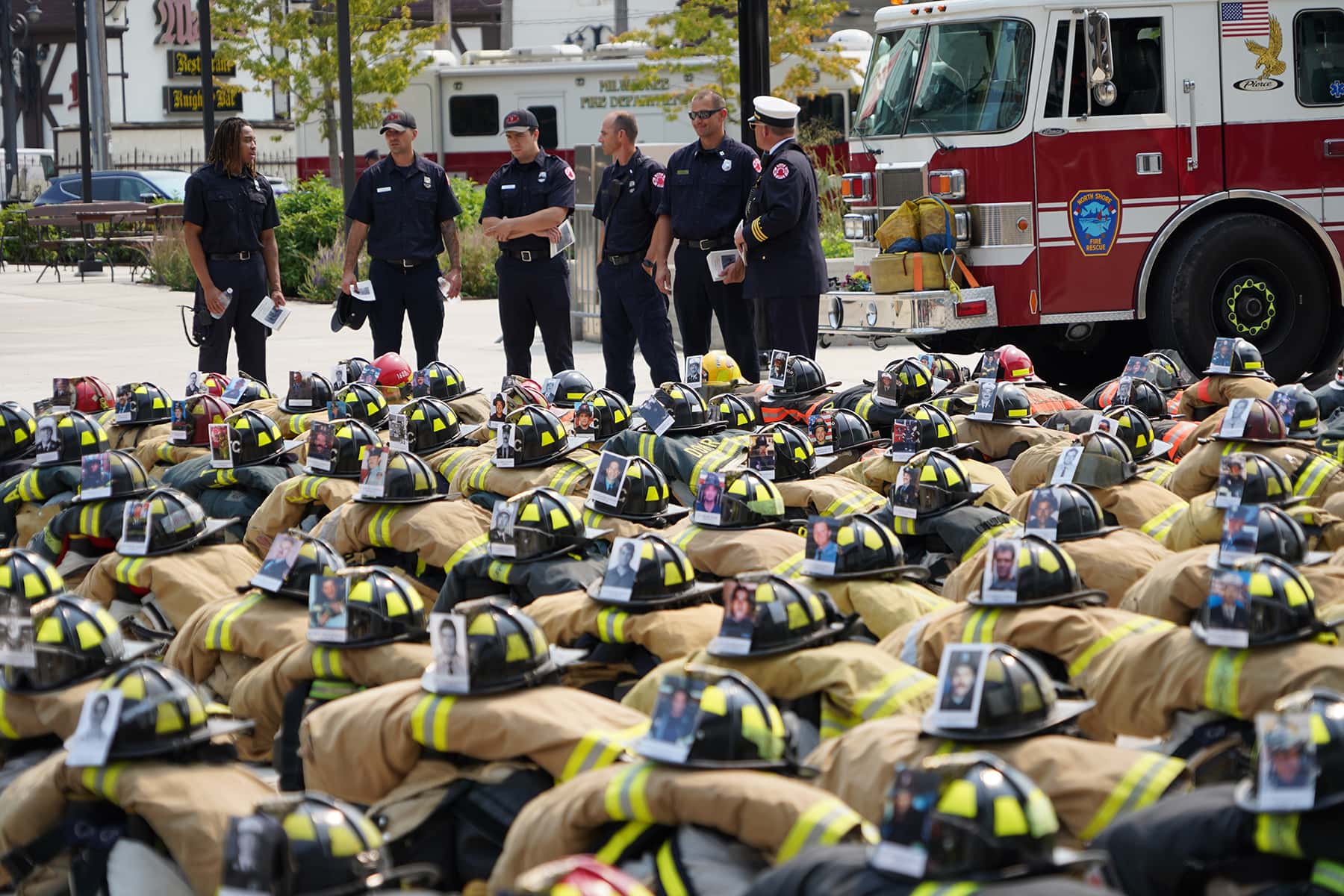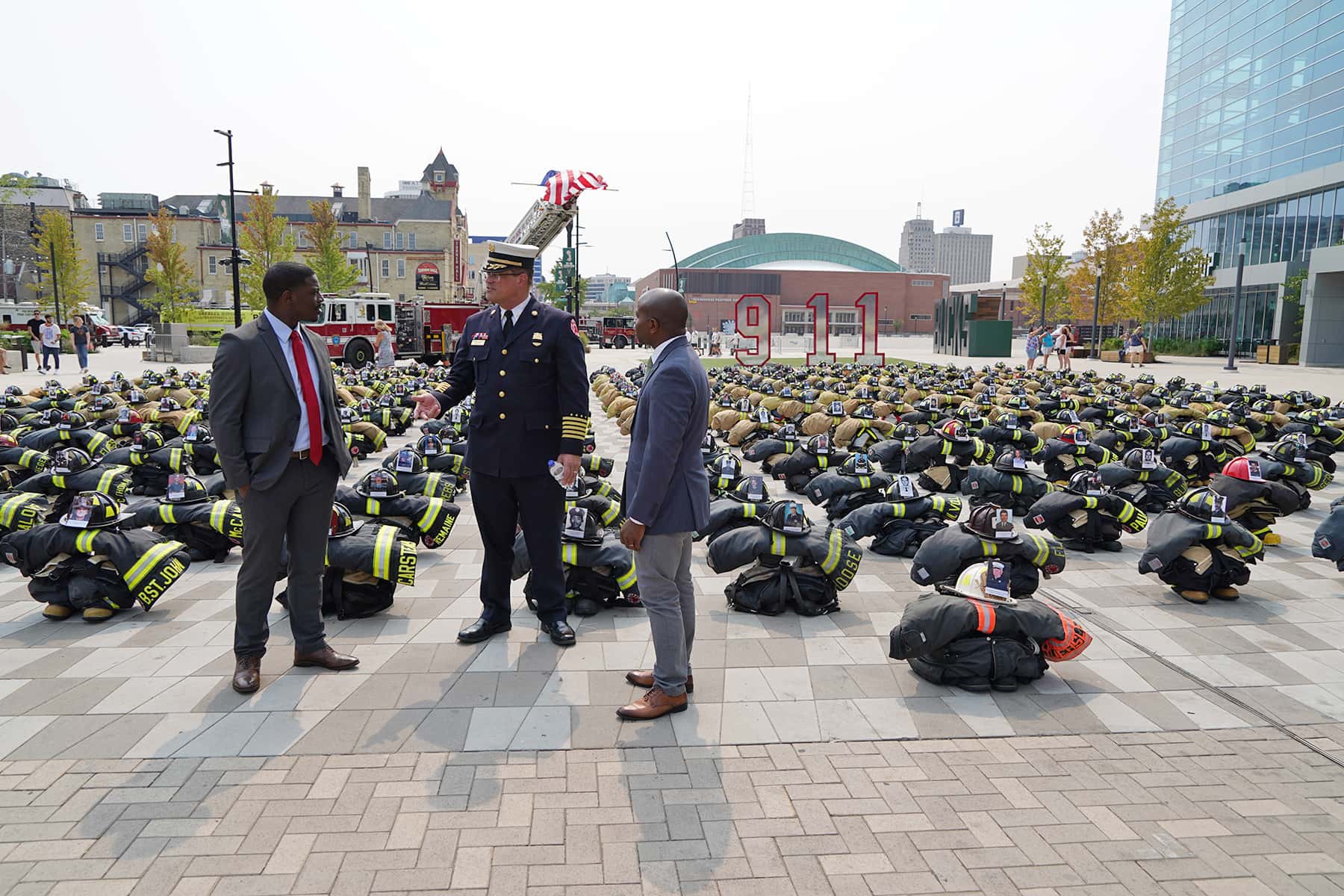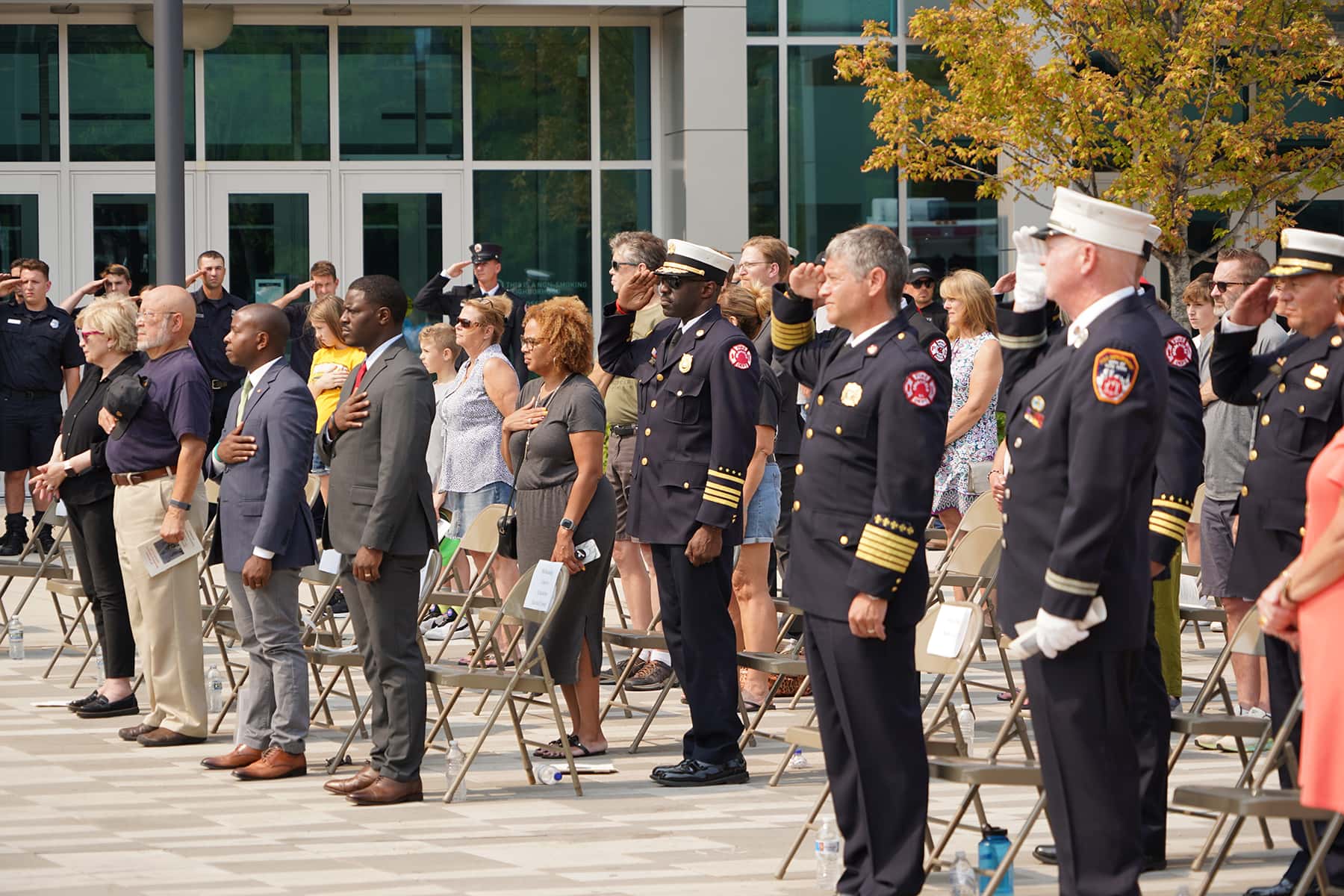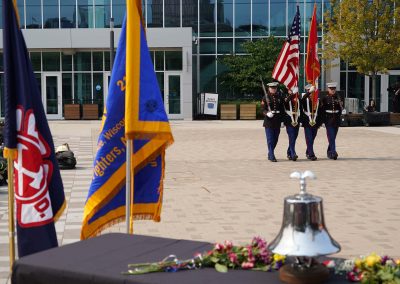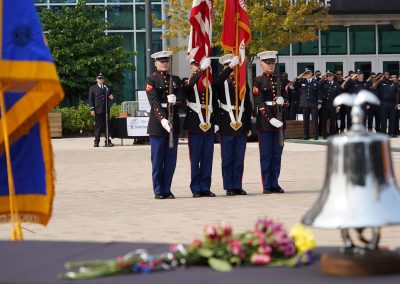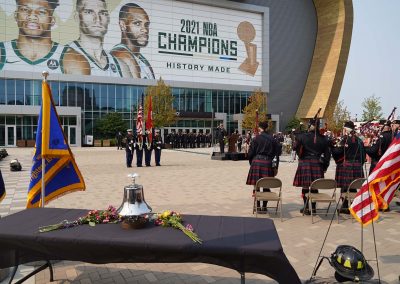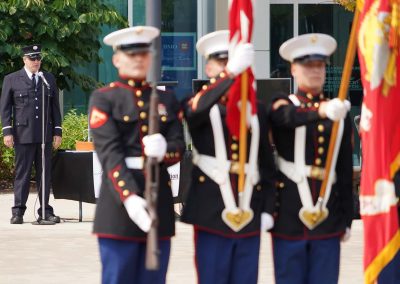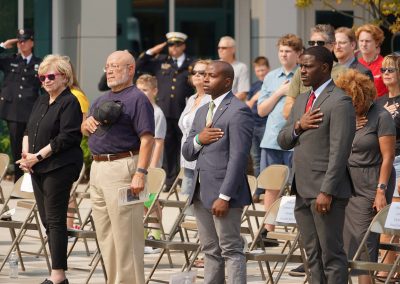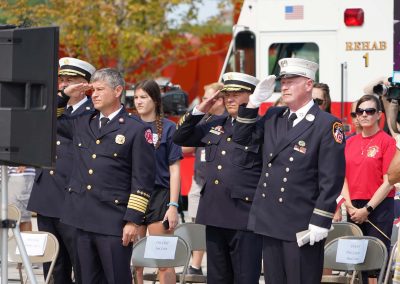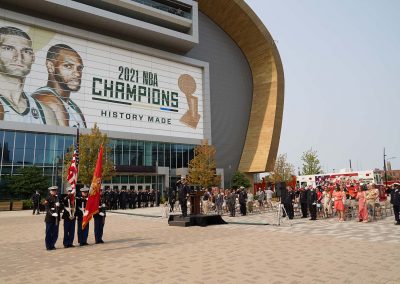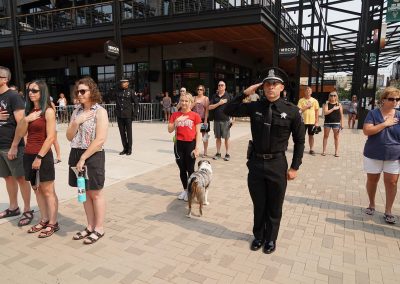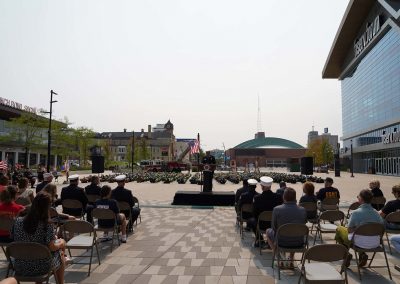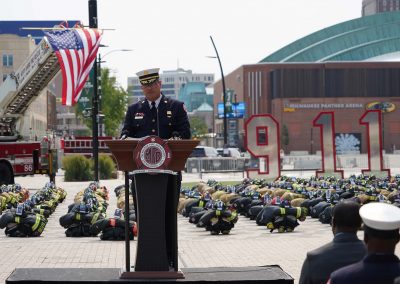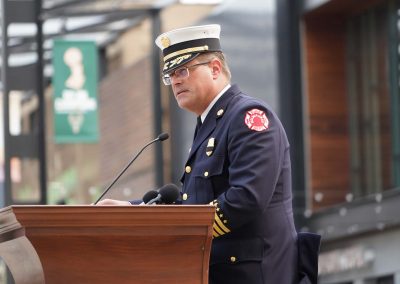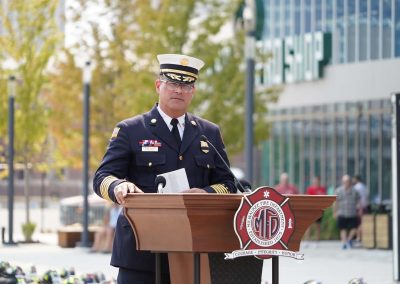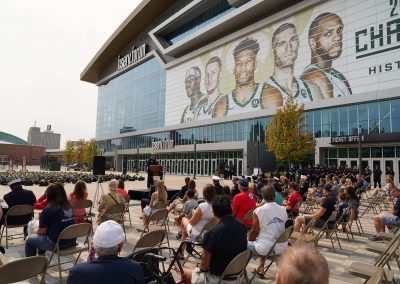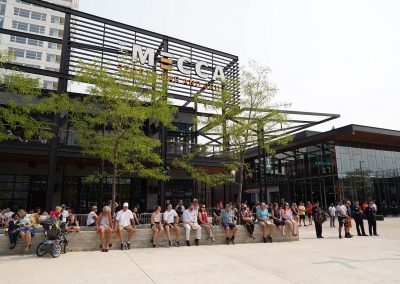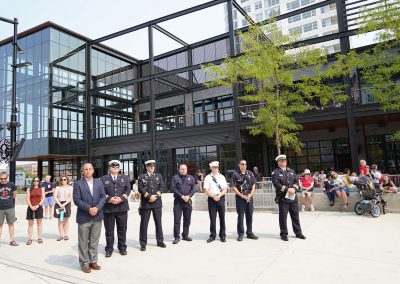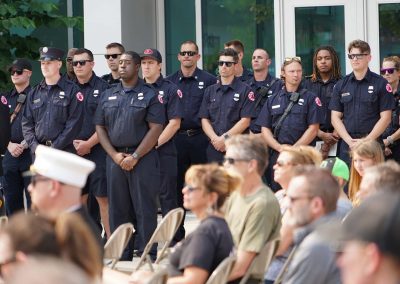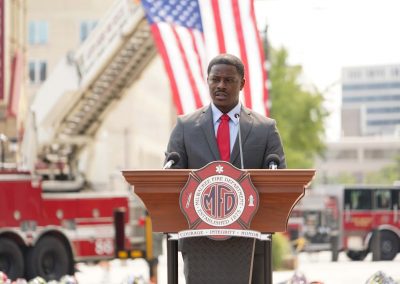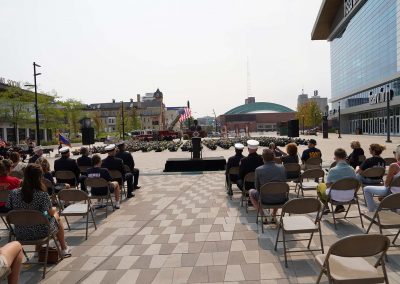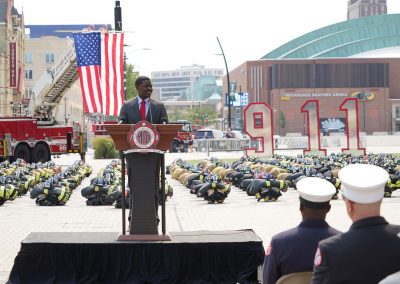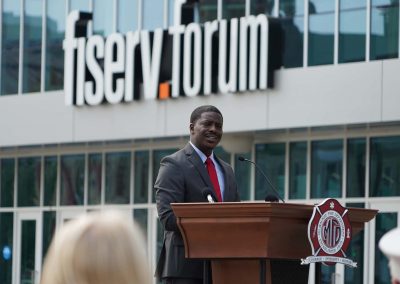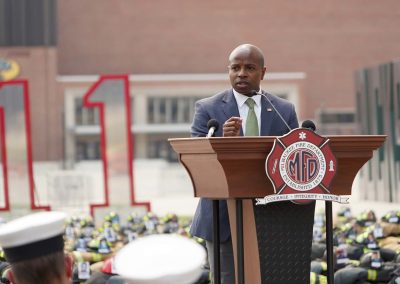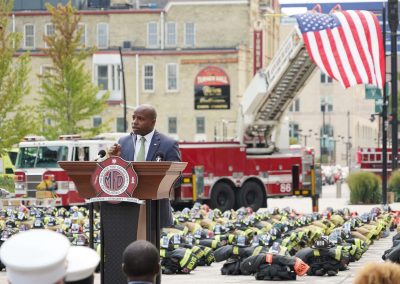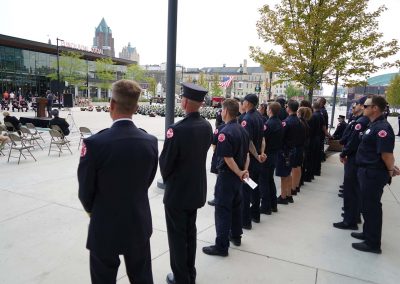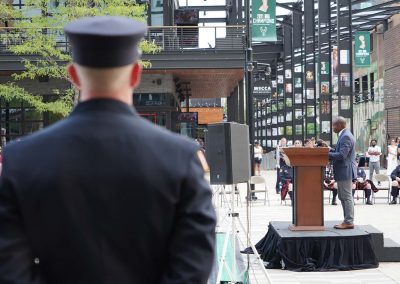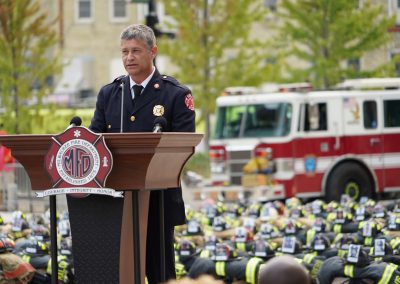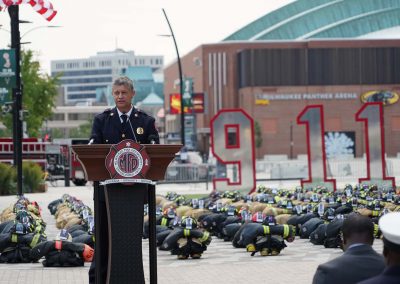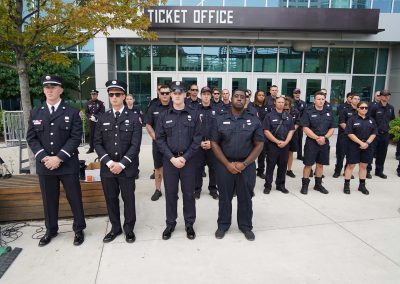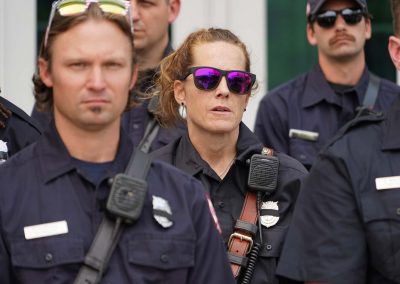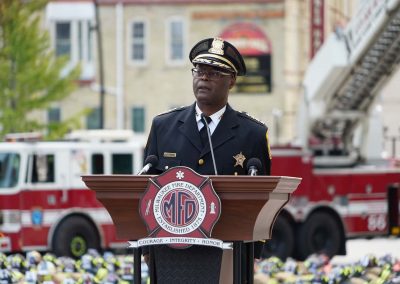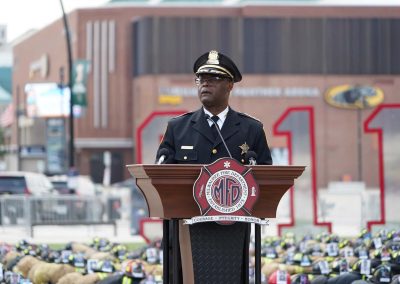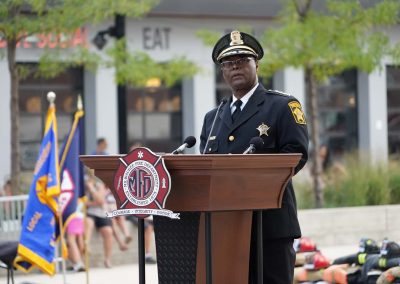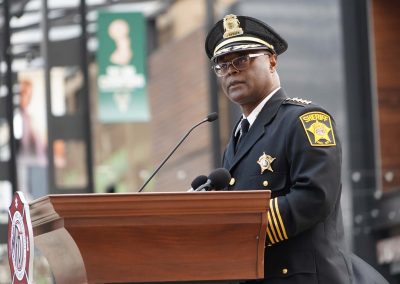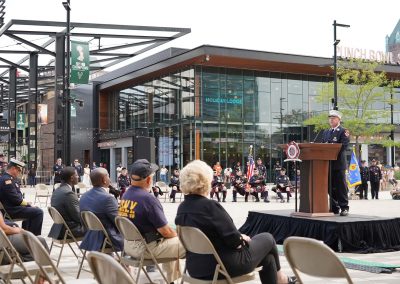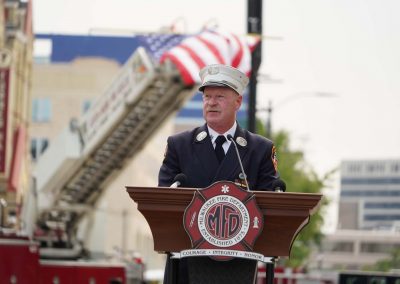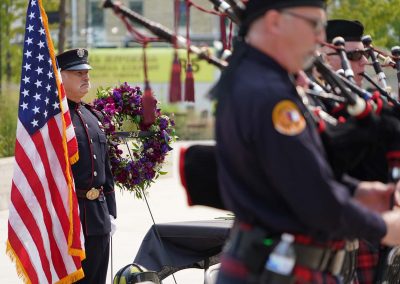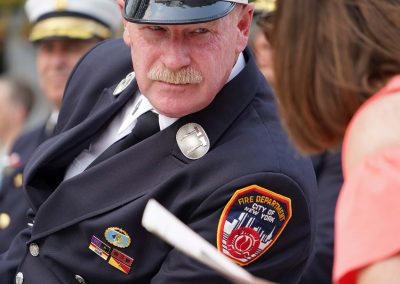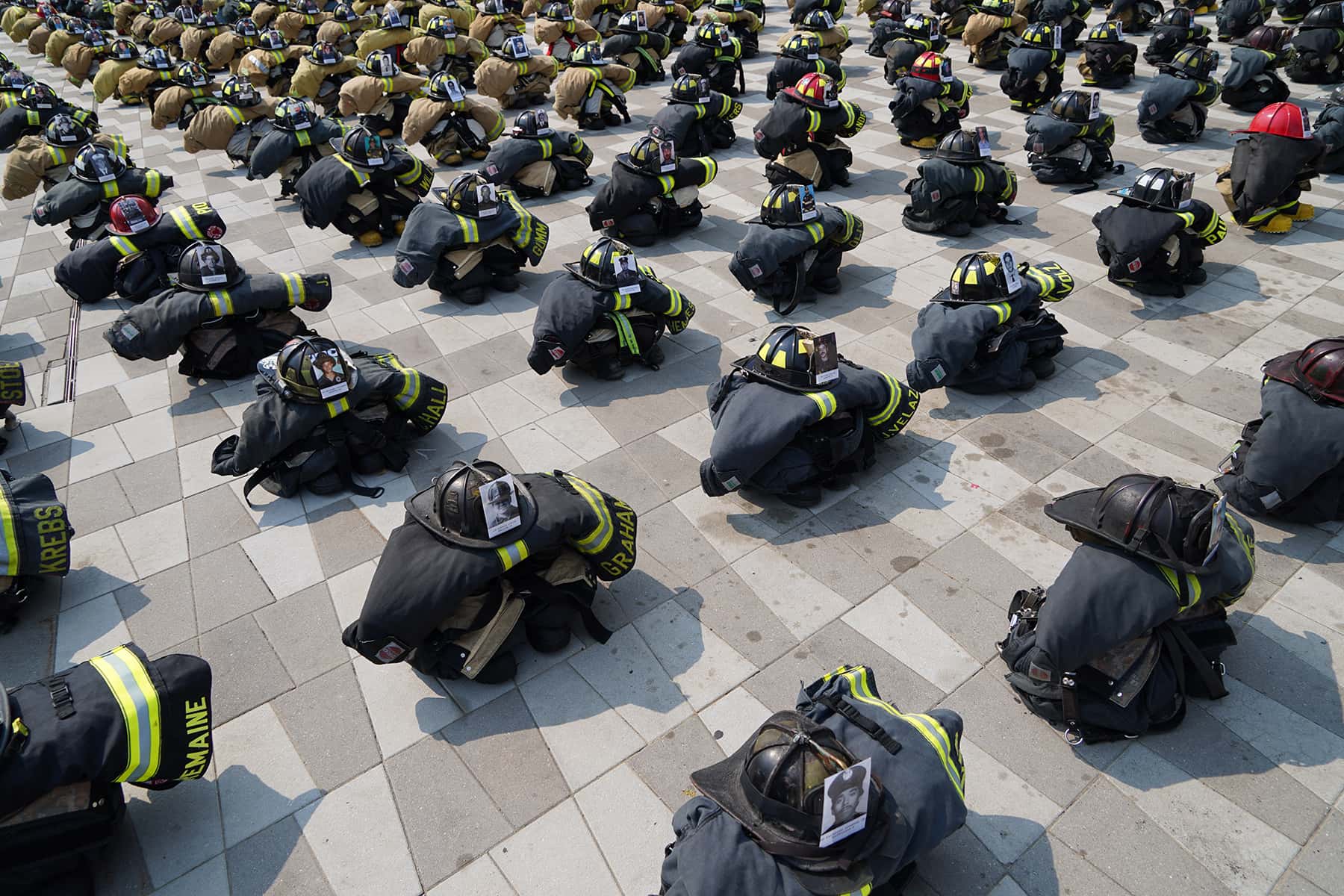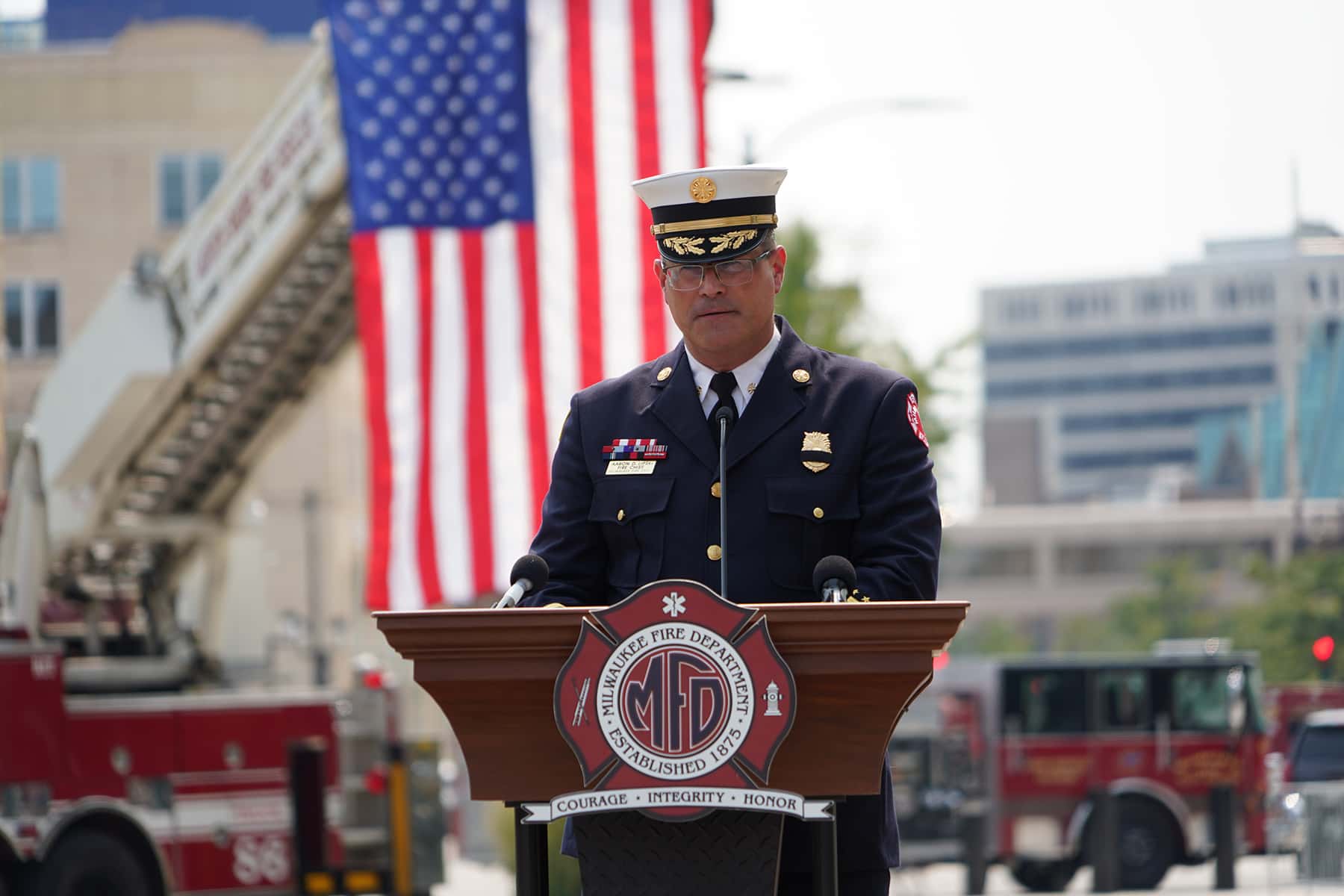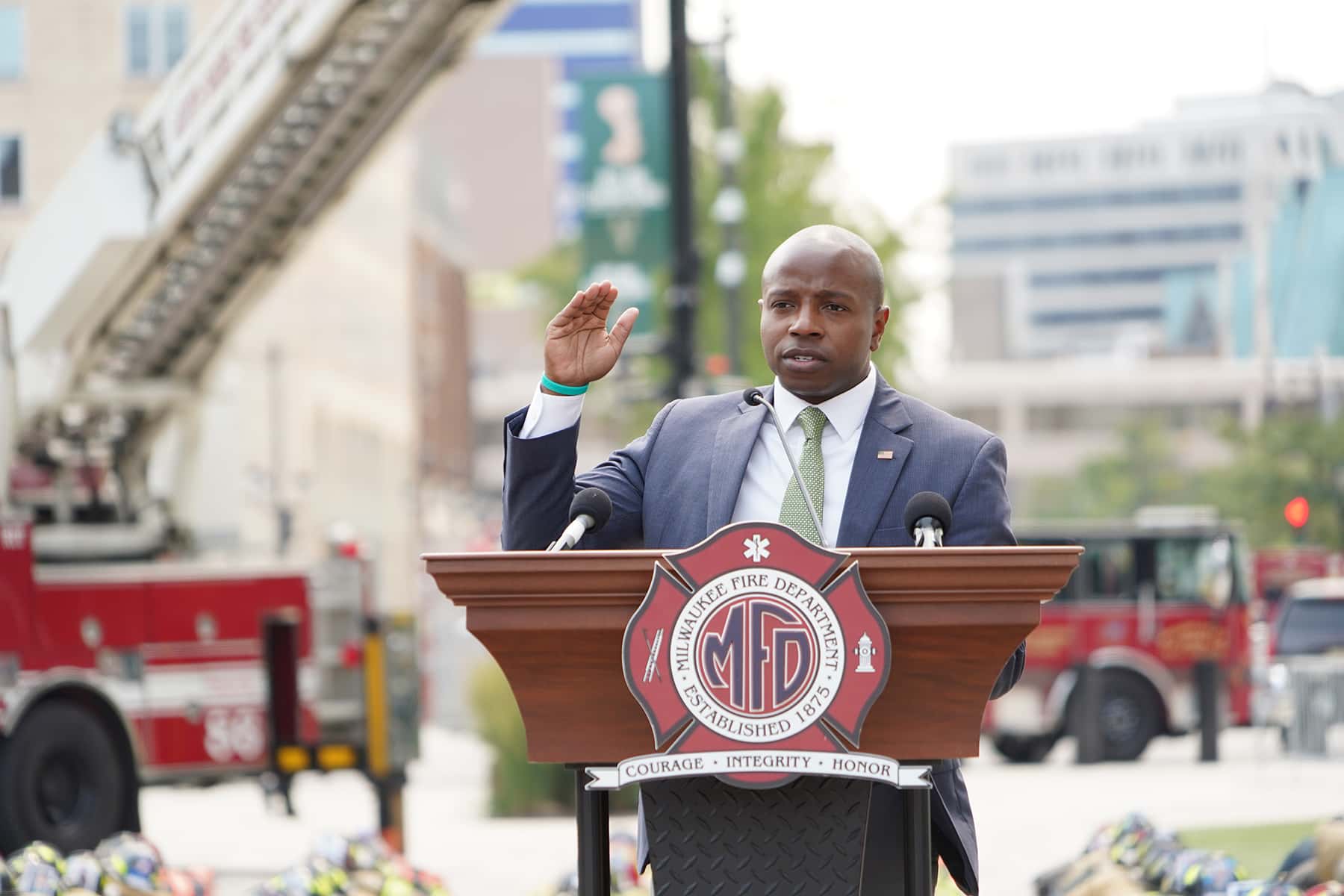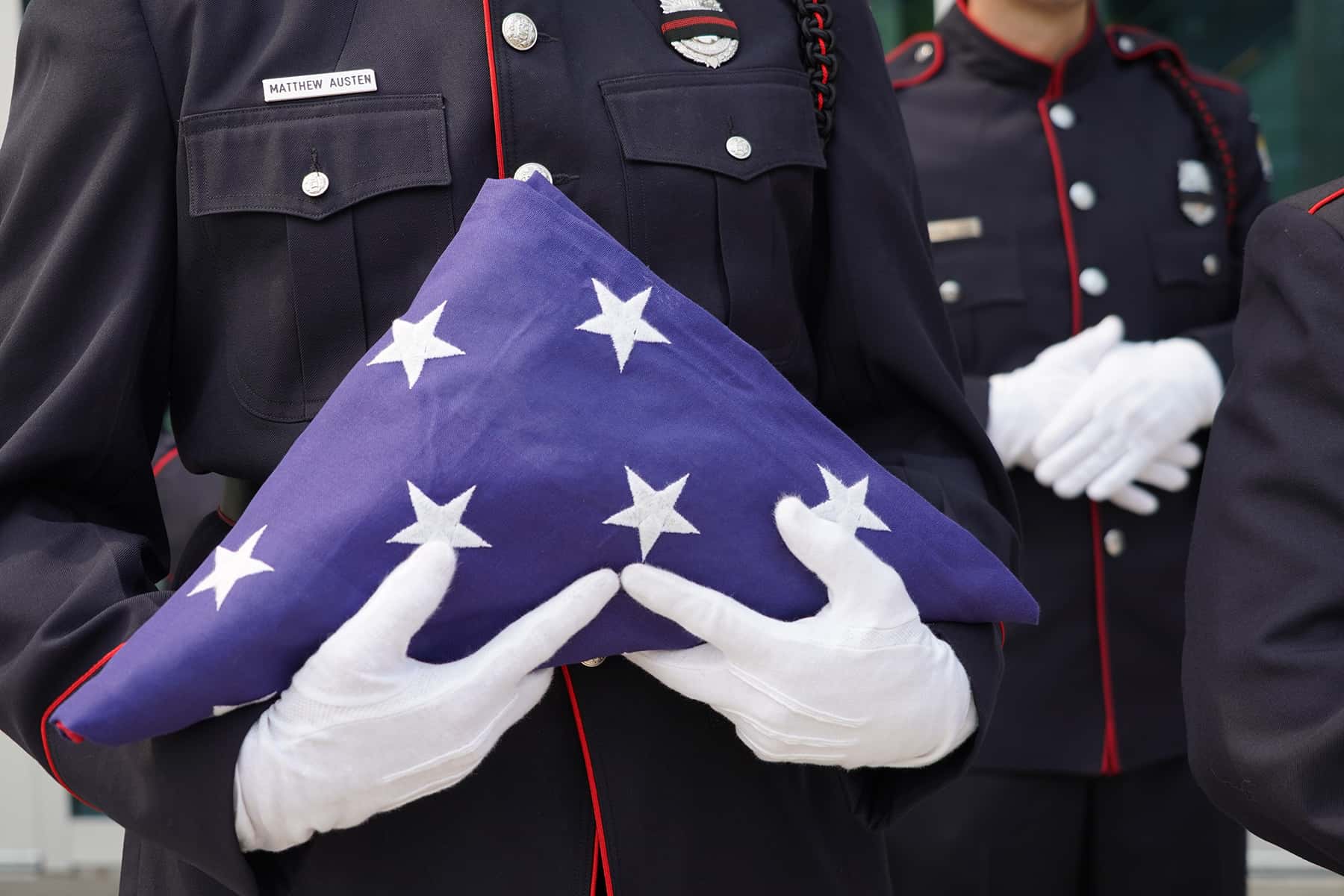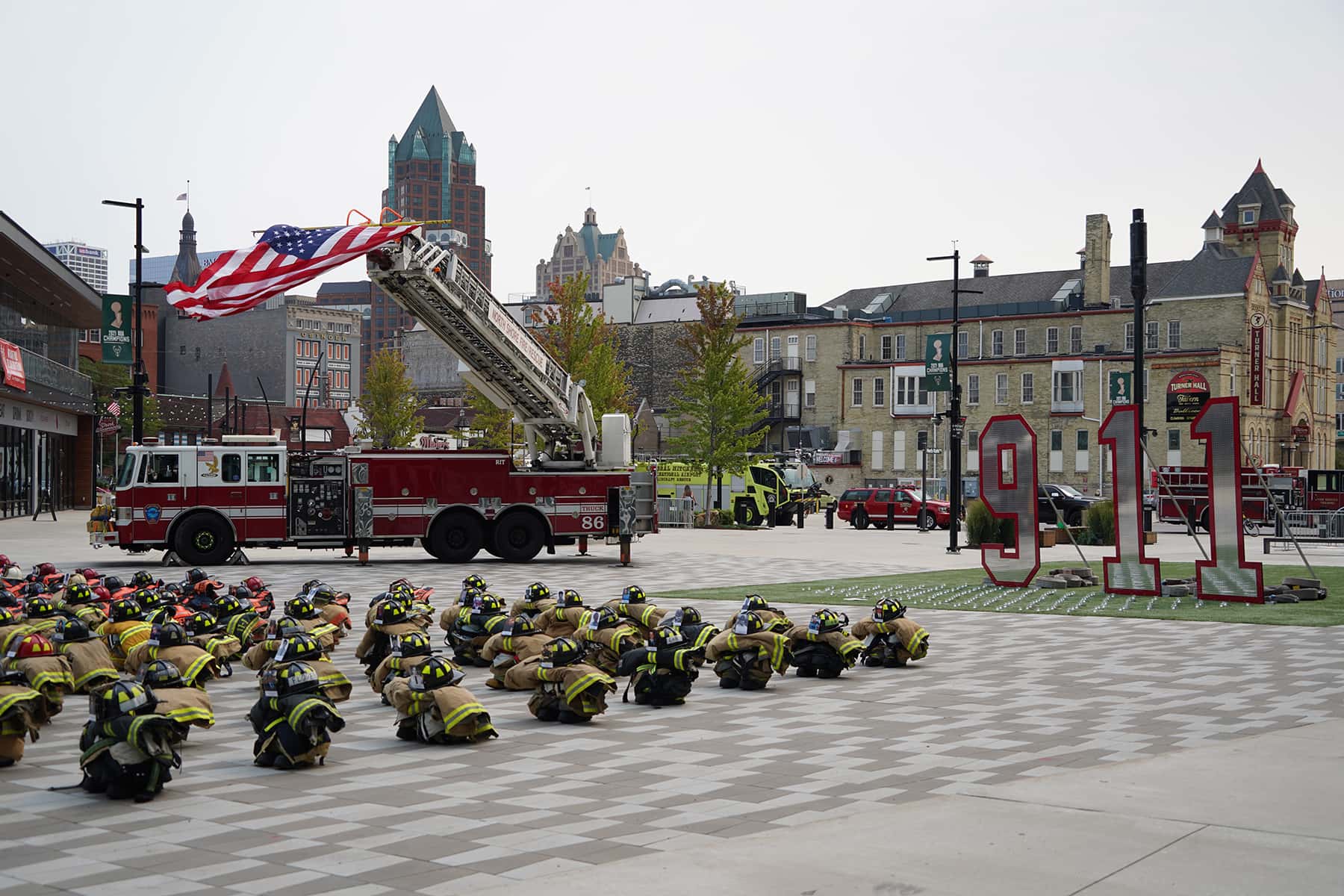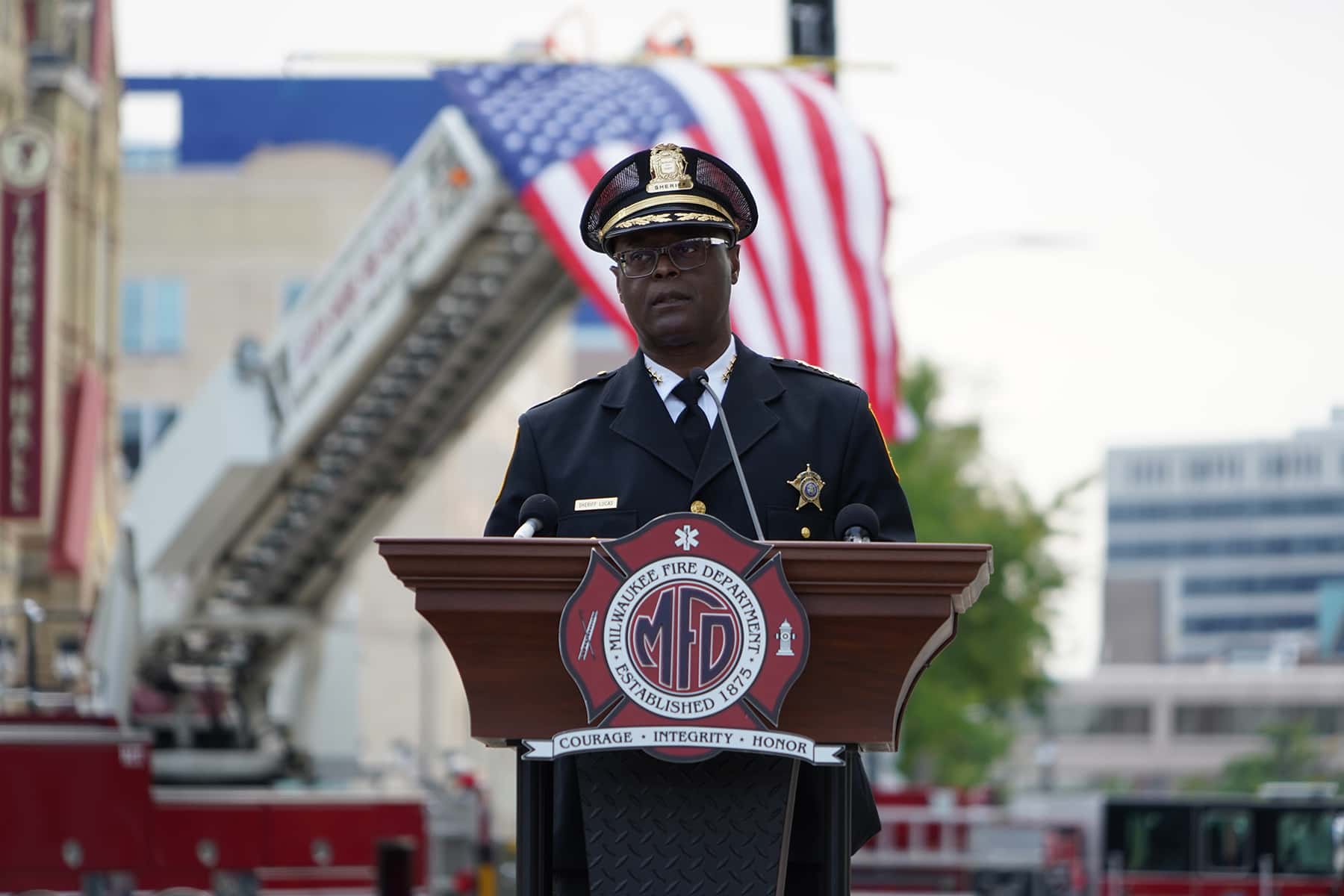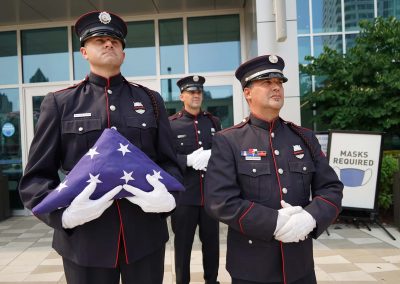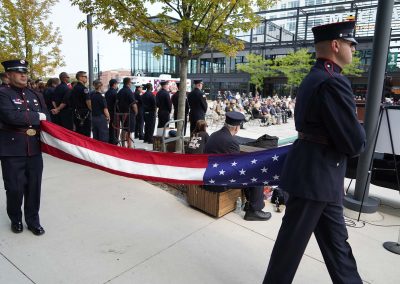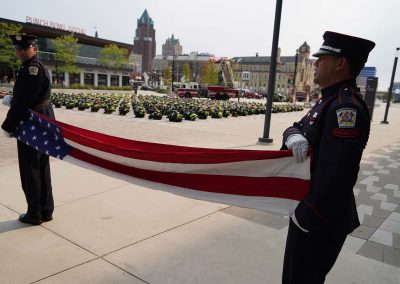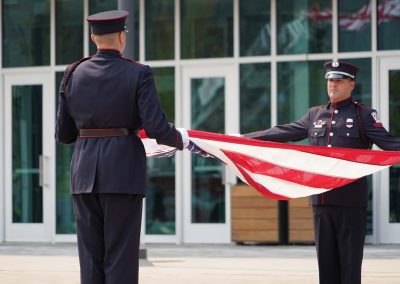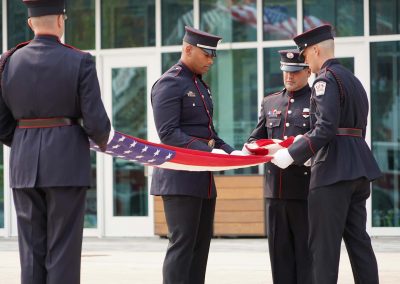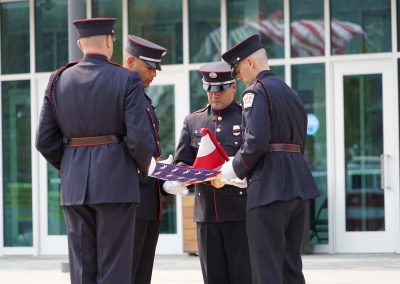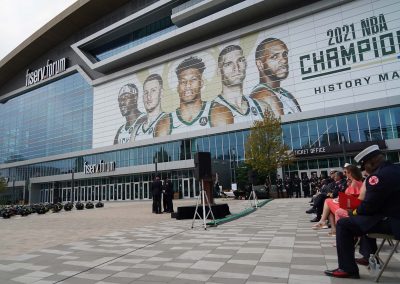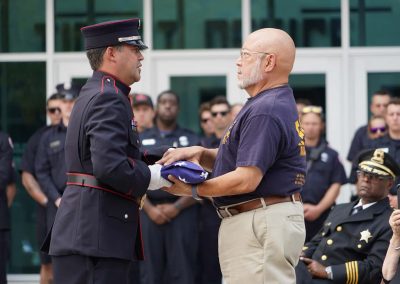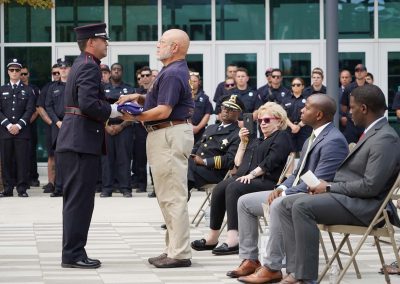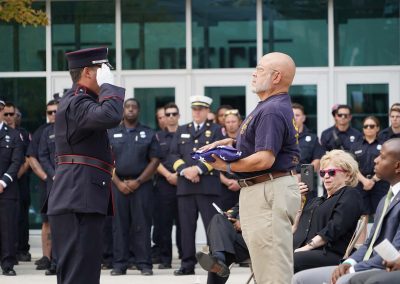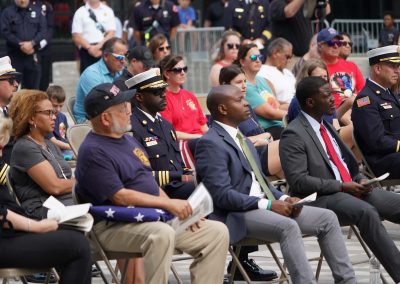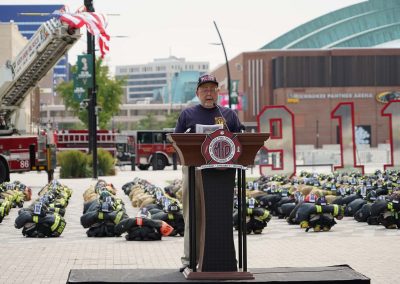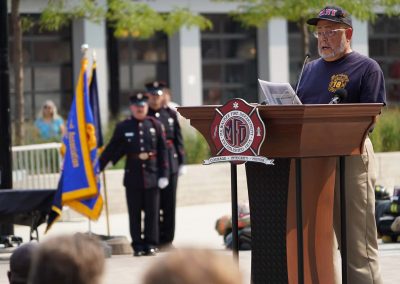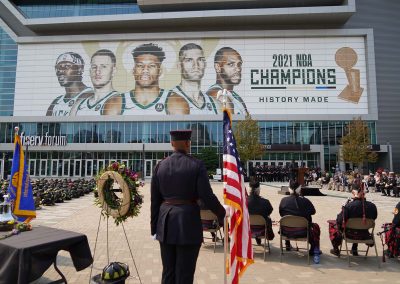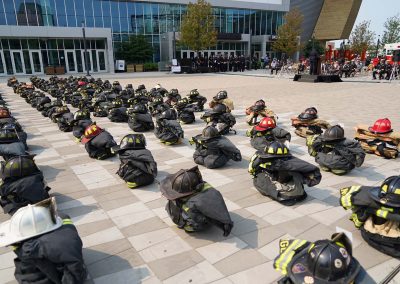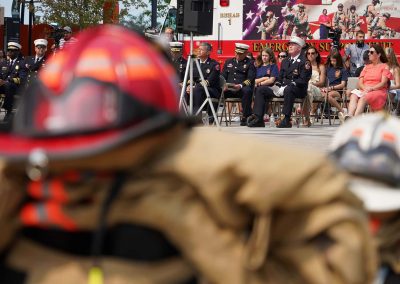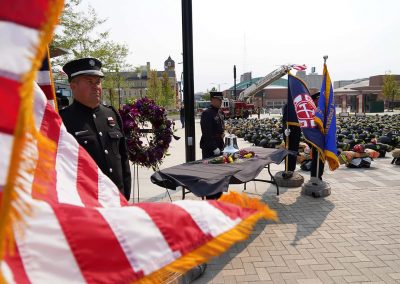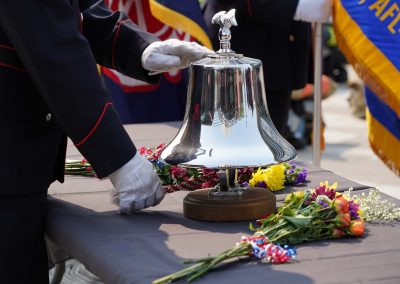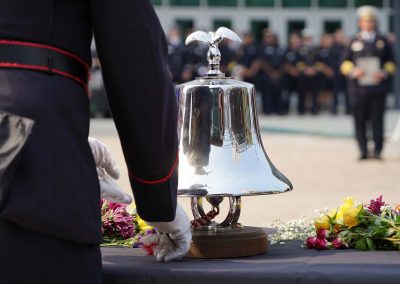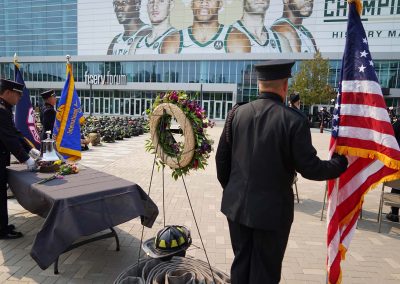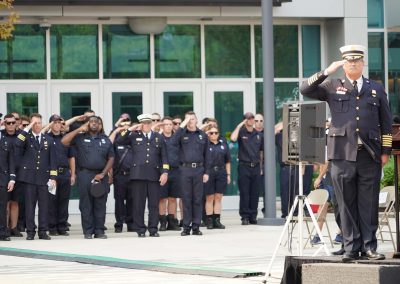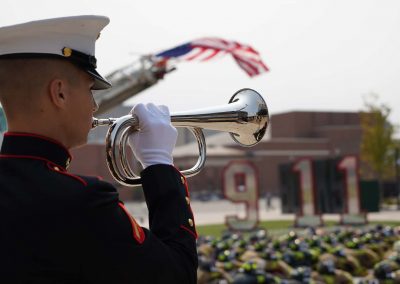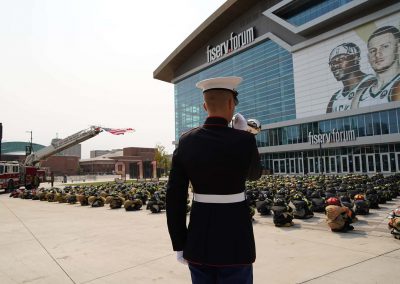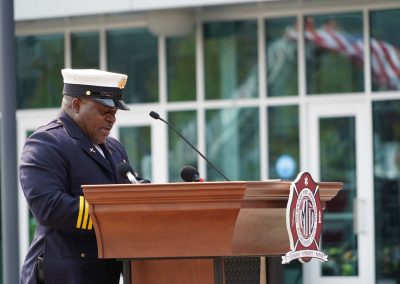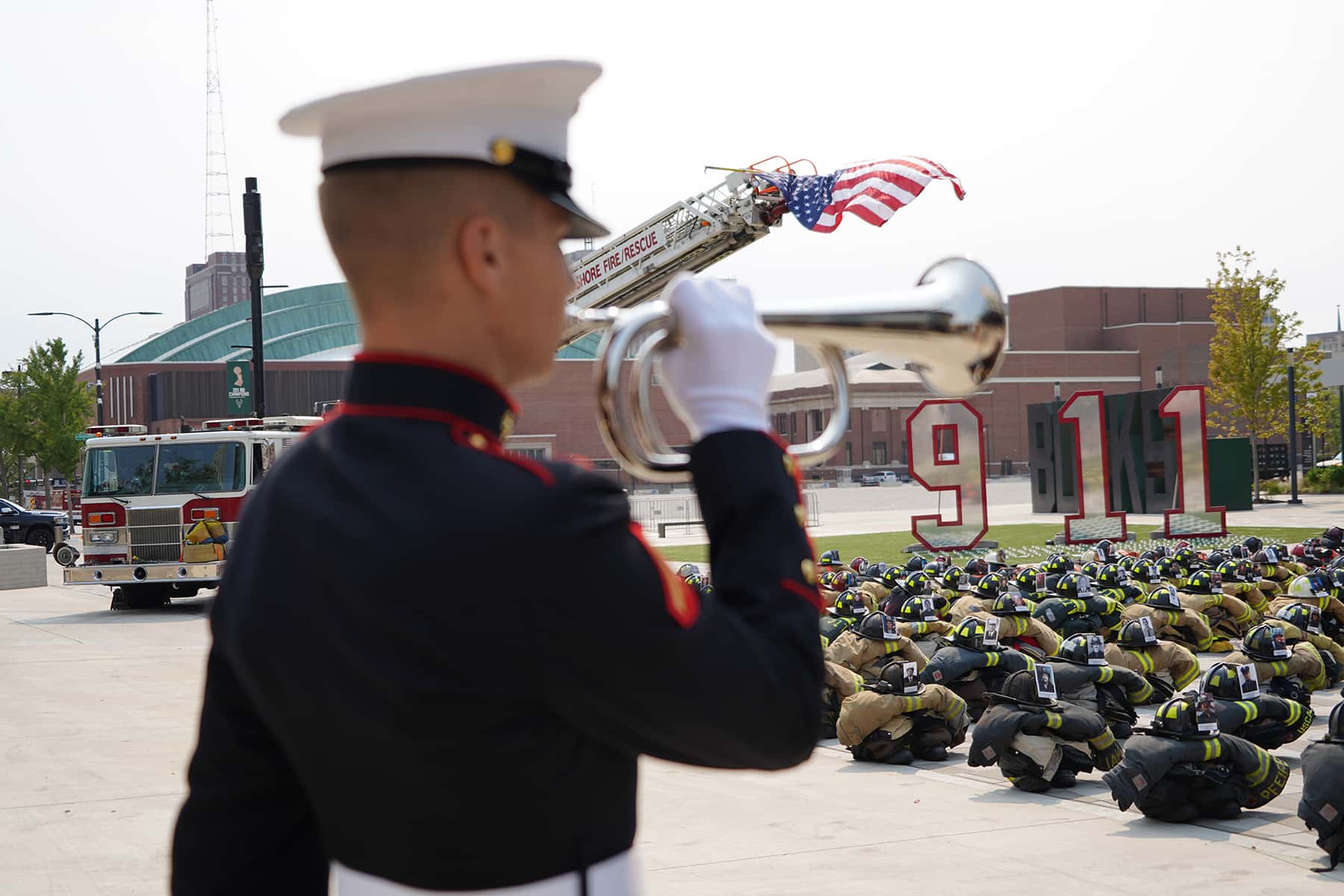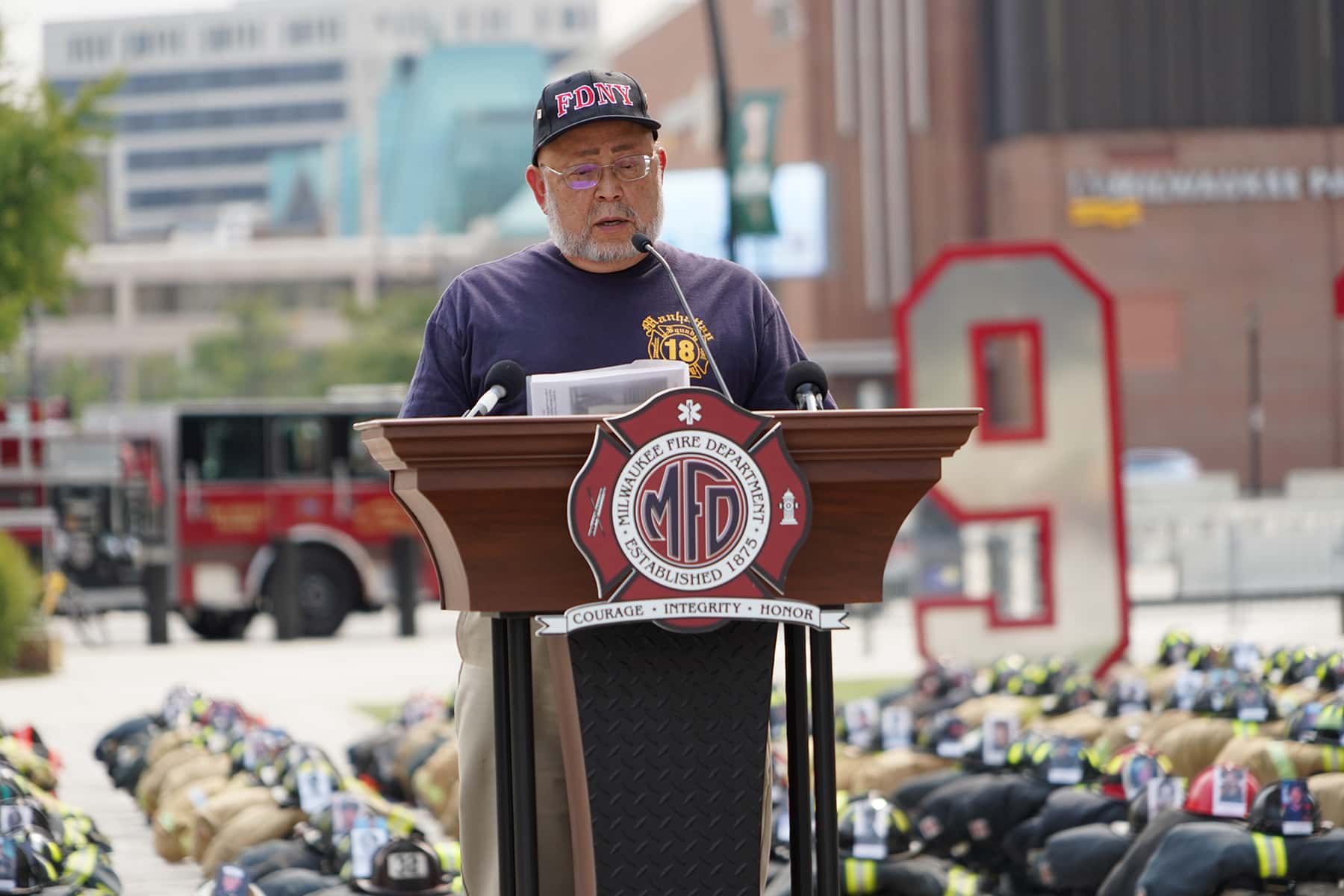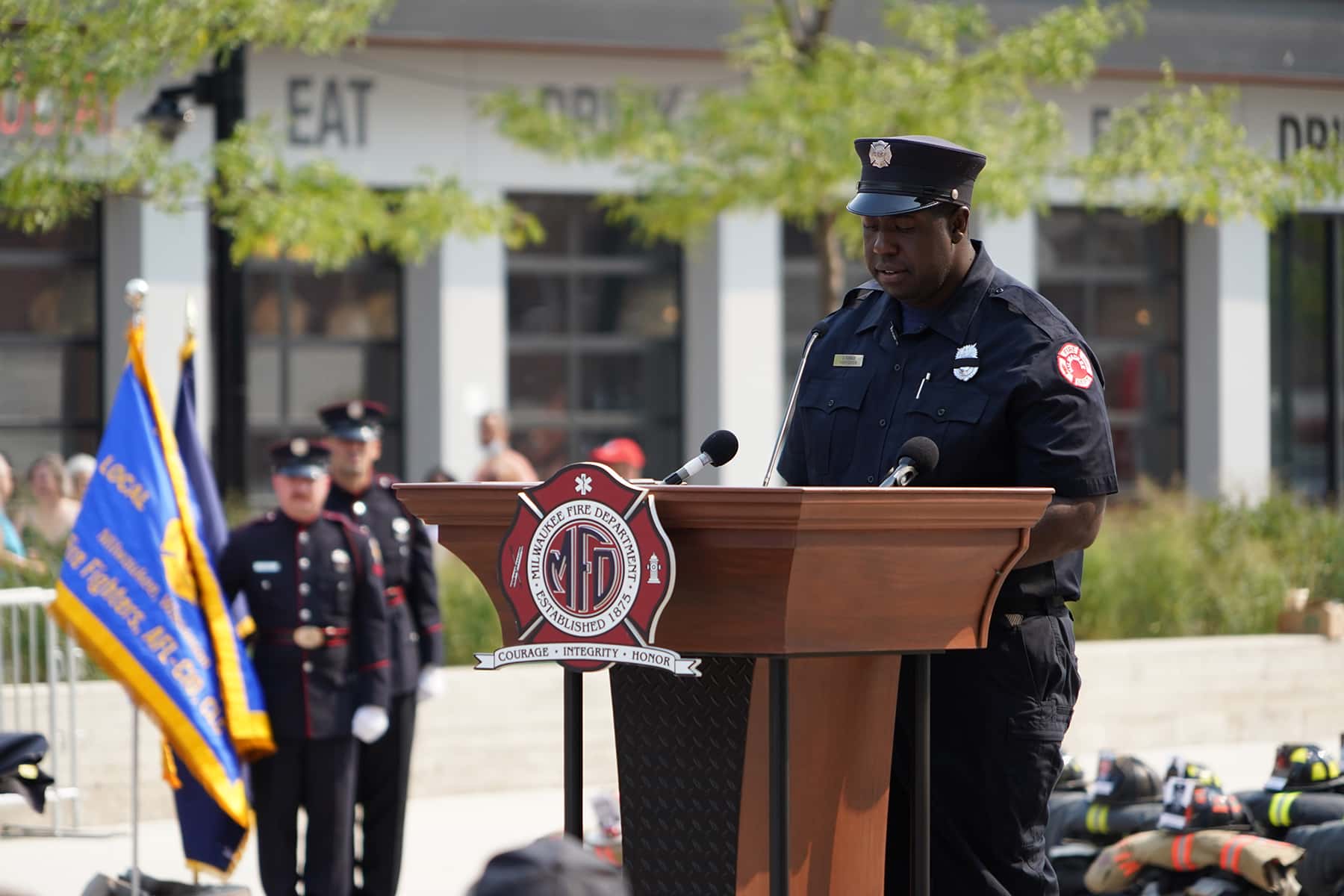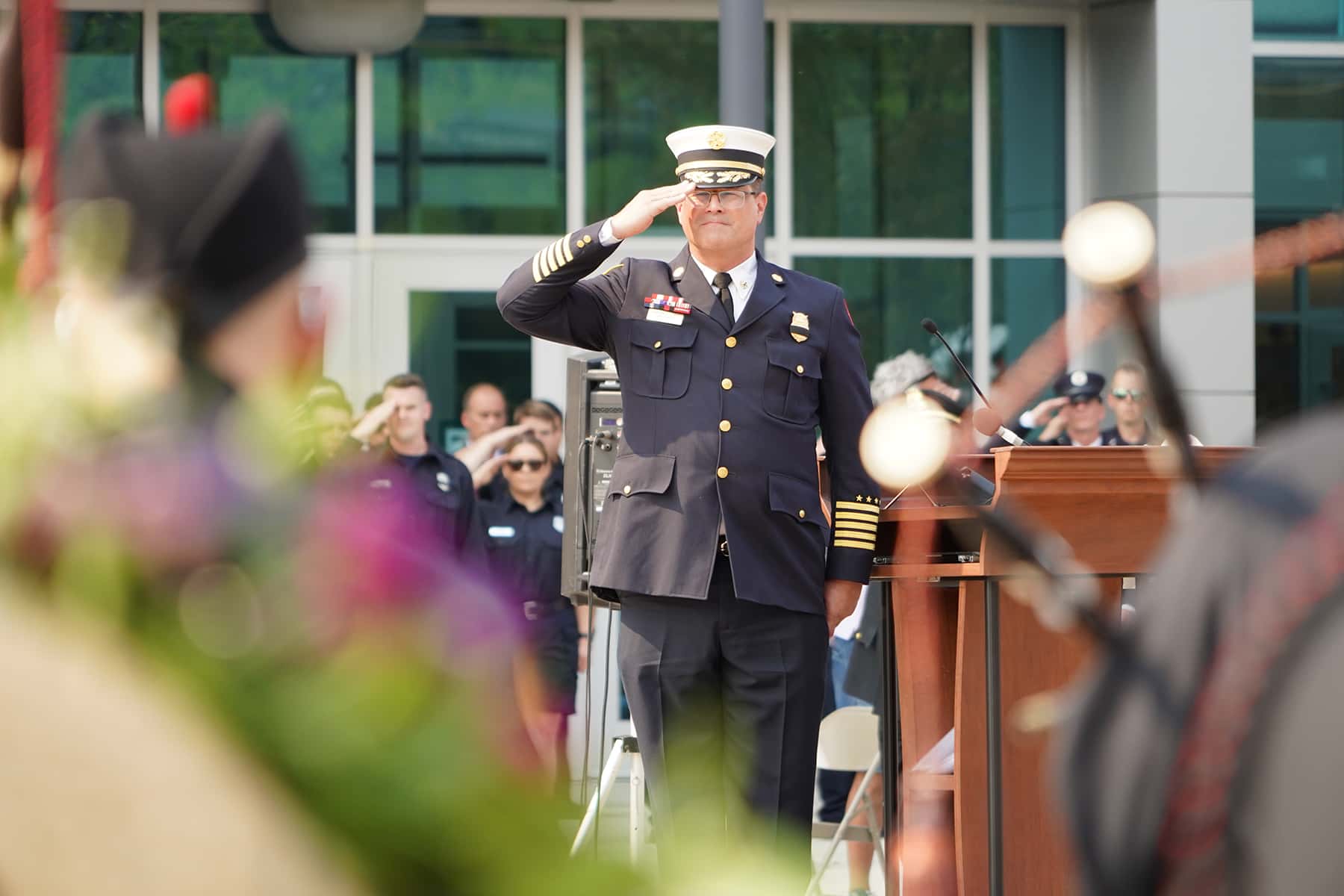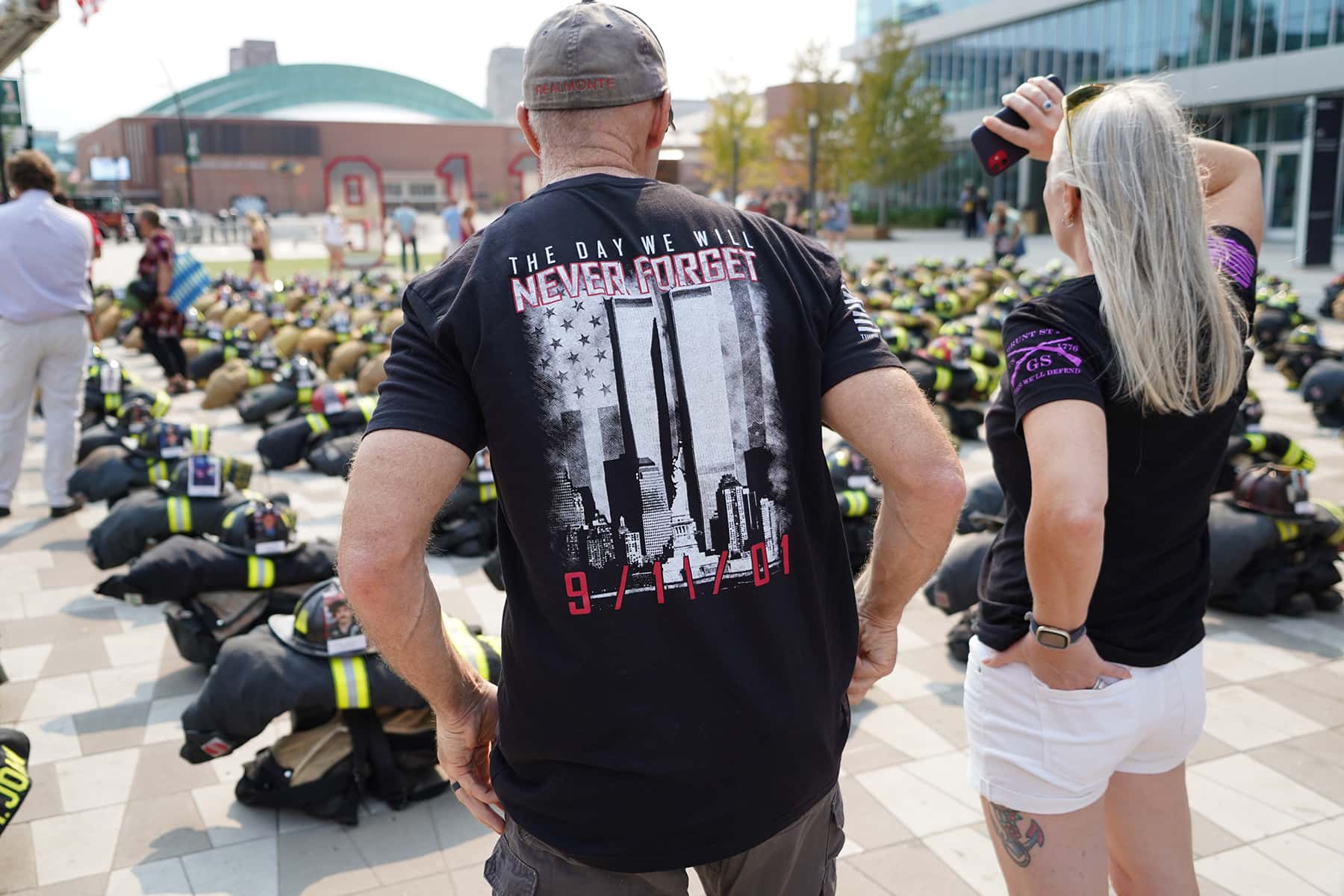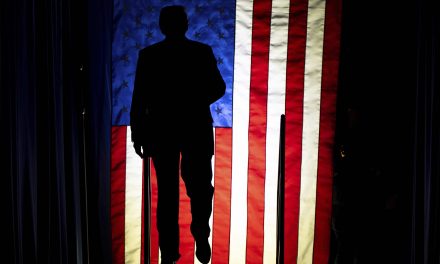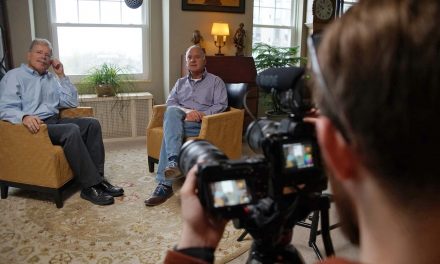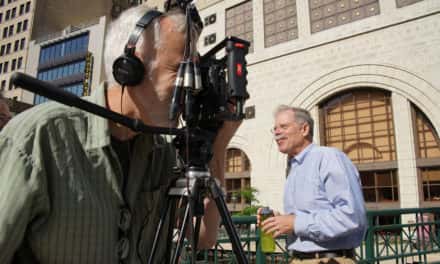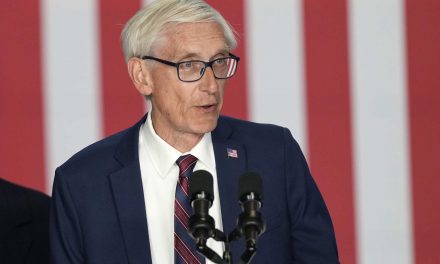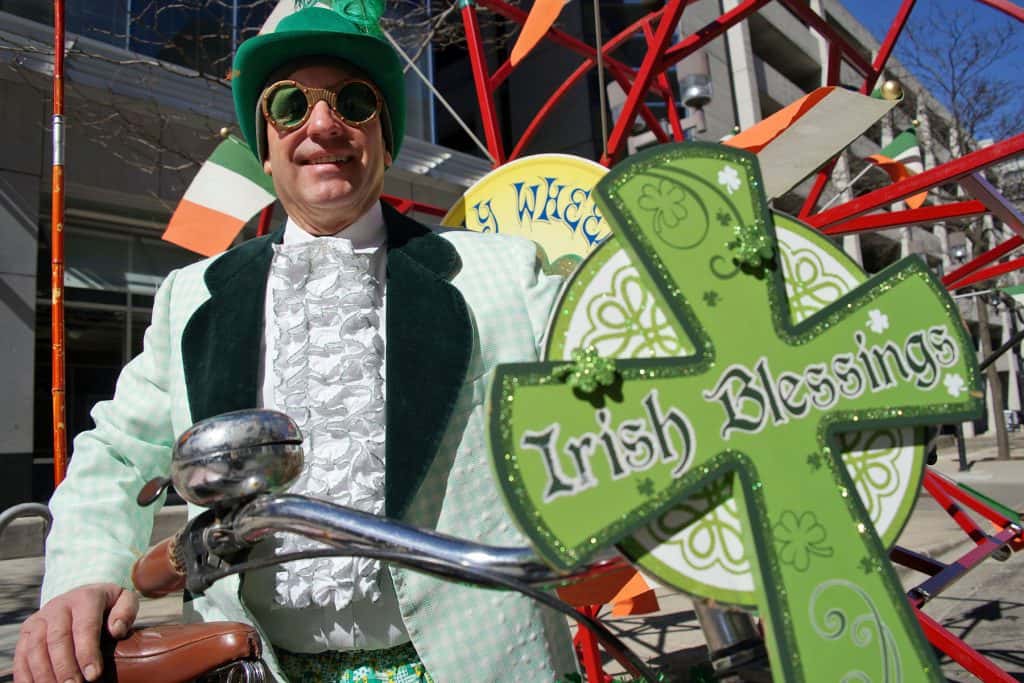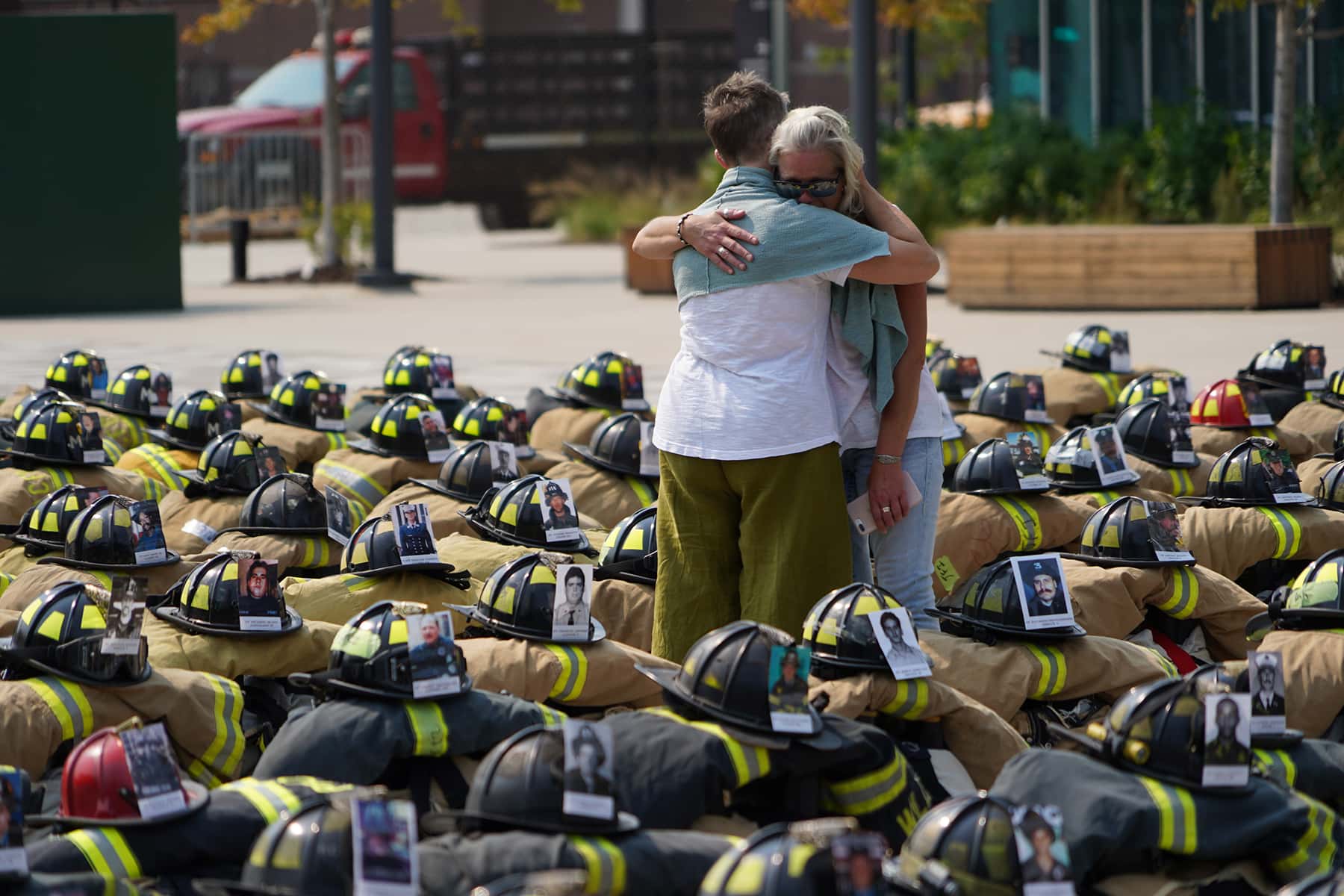
The attacks of September 11, 2001 took place 20 years ago, and the Milwaukee community gathered for several events to commemorate that tragic day.
“Milwaukee County Remembers 9/11” memorial ceremony was held in the morning at the War Memorial Center, featuring a “Never Forget 9/11” exhibit and a commemorative ride with Medal of Honor recipient Gary Wetzel. Members of the Greater Milwaukee community attended the somber event in-person, after COVID-19 forced the event to take place virtually in 2020. The ceremony was co-organized by the city and county, with remarks delivered by Mayor Tom Barrett and Milwaukee County Executive David Crowley.
The Deer District hosted the “20th Anniversary of 9/11: Memorial Tribute” in the afternoon, as a remembrance of the firefighters who lost their lives on September 11. A total of 343 spots in the plaza area were marked with helmets, fire suits, boots, and a firefighter’s photo with their name. Speakers at the ceremony included Milwaukee Fire Chief Aaron Lipski, Milwaukee County Executive David Crowley, Milwaukee Common Council President Cavalier Johnson, Greenfield Fire Chief Jon Cohn, and Retired Captain Paul Smith of the New York Fire Department.
On the twentieth anniversary of the day terrorists from the al-Qaeda network used four civilian airplanes as weapons against the United States, the weather was eerily similar to the bright, clear blue sky of what has come to be known as 9/11. George W. Bush, who was president on that horrific day, spoke in Pennsylvania at a memorial for the passengers of United Airlines Flight 93 who, on September 11, 2001, stormed the cockpit and brought their airplane down in a field, killing everyone on board but denying the terrorists a fourth American trophy.
Former president Bush said: “Twenty years ago, terrorists chose a random group of Americans, on a routine flight, to be collateral damage in a spectacular act of terror. The 33 passengers and 7 crew of Flight 93 could have been any group of citizens selected by fate. In a sense, they stood in for us all.” And, Bush continued, “The terrorists soon discovered that a random group of Americans is an exceptional group of people. Facing an impossible circumstance, they comforted their loved ones by phone, braced each other for action, and defeated the designs of evil.”
Recalling his experience that day, Bush talked of “the America I know.”
“On America’s day of trial and grief, I saw millions of people instinctively grab for a neighbor’s hand and rally to the cause of one another…. At a time when religious bigotry might have flowed freely, I saw Americans reject prejudice and embrace people of Muslim faith…. At a time when nativism could have stirred hatred and violence against people perceived as outsiders, I saw Americans reaffirm their welcome to immigrants and refugees…. At a time when some viewed the rising generation as individualistic and decadent, I saw young people embrace an ethic of service and rise to selfless action.”
The commemorations of that tragic day almost a generation ago seemed to celebrate exactly what Bush did: the selfless heroism and care for others shown by those like Welles Crowther, the man in the red bandana, who helped others out of danger before succumbing himself; the airplane passengers who called their loved ones to say goodbye; neighbors; firefighters; law enforcement officers; the men and women who volunteered for military service after the attack.
That day, and our memories of it, show American democracy at its best: ordinary Americans putting in the work, even at its dirtiest and most dangerous, to take care of each other. It is this America we commemorate on September 11, 2021.
But even in 2001, that America was under siege by those who distrusted the same democracy today’s events commemorated. Those people, concentrated in the Republican Party, worried that permitting all Americans to have a say in their government would lead to “socialism”: minorities and women would demand government programs paid for with tax dollars collected from hardworking people—usually, white men. They wanted to slash taxes and government regulations, giving individuals the “freedom” to do as they wished.
In 1986, they had begun to talk about purifying the vote; when the Democrats in 1993 passed the so-called Motor Voter law permitting people to register to vote at certain government offices, they claimed that Democrats were buying votes. The next year, Republicans began to claim that Democrats won elections through fraud, and in 1998, the Florida legislature passed a voter ID law that led to a purge of as many as 100,000 voters from the system before the election of 2000, resulting in what the United States Commission on Civil Rights called “an extraordinarily high and inexcusable level of disenfranchisement,” particularly of African American voters.
It was that election that put George W. Bush in the White House, despite his losing the popular vote to Democrat Al Gore by more than a half a million votes. Bush had run on the promise he would be “a uniter, not a divider,” but as soon as he took office, he advanced the worldview of those who distrusted democracy. He slashed government programs and in June pushed a $1.3 trillion cut through Congress. These measures increased the deficit without spurring the economy, and voters were beginning to sour on a presidency that had been precarious since its controversial beginnings.
On the morning of September 11, 2001, hours before the planes hit the Twin Towers, a New York Times editorial announced: “There is a whiff of panic in the air.” And then the planes hit.
“In our grief and anger we have found our mission and our moment,” Bush said. America had seemed to drift since the Cold War had ended twelve years before, but now the country was in a new death struggle, against an even more implacable foe. To defeat the nation’s enemies, America must defend free enterprise and Christianity at all costs.
In the wake of the attacks, Bush’s popularity soared to 90 percent. He and his advisers saw that popularity as a mandate to change America, and the world, according to their own ideology. “Either you are with us, or you are with the terrorists,” he announced.
Immediately, the administration focused on strengthening business. It shored up the airline industry and, at the advice of oil industry executives, deregulated the oil industry and increased drilling. By the end of the year, Congress had appropriated more than $350 billion for the military and homeland security, but that money would not go to established state and local organizations; it would go to new federal programs run by administration loyalists. Bush’s proposed $2.13 trillion 2003 budget increased military spending by $48 billion while slashing highway funding, environmental initiatives, job training, and other domestic spending. It would throw the budget $401 billion in the red. Republicans attacked any opposition as an attack on “the homeland.”
The military response to the attacks also turned ideological quickly. As soon as he heard about the attacks, Defense Secretary Donald Rumsfeld asked his aides to see if there was enough evidence to “hit” Iraqi president Saddam Hussein as well as al-Qaeda leader Osama bin Laden. In fact, Saddam had not been involved in the attack on America: the al-Qaeda terrorists of 9/11 were from Saudi Arabia, Egypt, and the United Arab Emirates.
Rumsfeld was trying to fit the events of 911 into the worldview of the so-called neocons who had come together in 1997 to complain that President Bill Clinton’s foreign policy was “incoherent” and to demand that the U.S. take international preeminence in the wake of the Cold War. They demanded significantly increased defense spending and American-backed “regime change” in countries that did not have “political and economic freedom.” They wanted to see a world order “friendly to our security, our prosperity, and our principles.”
After 9/11, Bush launched rocket attacks on the Taliban government of Afghanistan that had provided a safe haven for al-Qaeda, successfully overthrowing it before the end of the year. But then the administration undertook to reorder the Middle East in America’s image. In 2002, it announced that the U.S. would no longer simply try to contain our enemies as President Harry S. Truman had planned, or to fund their opponents as President Ronald Reagan had done, but to strike nations suspected of planning attacks on the U.S. preemptively: the so-called Bush Doctrine. In 2003, after setting up a pro-American government in Afghanistan, the administration invaded Iraq.
By 2004, the administration was so deeply entrenched in its own ideology that a senior adviser to Bush told journalist Ron Suskind that people like him — Suskind — were in “the reality-based community.” They believed people could find solutions based on their observations and careful study of discernible reality. But, the aide continued, such a worldview was obsolete.
“That’s not the way the world really works anymore.… We are an empire now, and when we act, we create our own reality. And while you’re studying that reality — judiciously, as you will — we’ll act again, creating other new realities, which you can study too, and that’s how things will sort out. We’re history’s actors… and you, all of you, will be left to just study what we do.”
The 9/11 attacks enabled Republicans to tar those who questioned the administration’s economic or foreign policies as un-American: either socialists or traitors making the nation vulnerable to terrorist attacks. Surely, such people should not have a voice at the polls. Republican gerrymandering and voter suppression began to shut Democratic voices out of our government, aided by a series of Supreme Court decisions. In 2010, the court opened the floodgates of corporate money into our elections to sway voters; in 2013, it gutted the 1965 Voting Rights Act; in 2021, it said that election laws that affected different groups of voters unevenly were not unconstitutional.
And now we grapple with the logical extension of that argument as a former Republican president claims he won the 2020 election because, all evidence to the contrary, Democratic votes were fraudulent.
Former president Bush called out the similarities between today’s domestic terrorists who attacked our Capitol to overthrow our government on January 6 and the terrorists of 9/11. “There is little cultural overlap between violent extremists abroad and violent extremists at home, “he said. “But in their disdain for pluralism, in their disregard for human life, in their determination to defile national symbols, they are children of the same foul spirit. And it is our continuing duty to confront them.”
In doing so, we can take guidance from the passengers on Flight 93, who demonstrated as profoundly as it is possible to do what confronting such an ideology means. While we cannot know for certain what happened on that plane on that fateful day, investigators believe that before the passengers of Flight 93 stormed the cockpit, throwing themselves between the terrorists and our government, and downed the plane, they all took a vote.
“On the 20th anniversary, we reflect on the significance of this day and the effects that the attacks on 9/11 have had on our nation over the last two decades. We honor and remember those who lost their lives, those whose lives were forever changed, and those heroic first responders who ran toward danger without second thought. I know that Wisconsinites will come together today, as they have each year, to mourn and remember the friends, family members, and neighbors lost, and reflect on this tragedy while calling upon our spirit of service, resilience, and community to let this day forever be defined not by terror but by our commitment to helping each other in times of great need.” – Governor Tony Evers
“9/11 defined a generation. As a 14 year old boy on September 11th, 2001 — a freshman at Bay View High School, I couldn’t have known how profound an impact the events of that day would have on my life. Living on 6th and Clarke at the time, it took 50 minutes to ride the county bus to the south side for school. I never saw the images of the attacks on the televisions rolled into classrooms because during the time that they were occurring, I felt sick to the point that I had to leave school, taking another 50 minute bus ride back to the north side. I’ll never forget walking into the house and seeing my mother — always so strong and steady, but now with hand over face in disbelief about what she was seeing out east. Having been involved for several months at that point in community service projects put on by a YMCA youth program called Sponsor-A-Scholar, I fell in love with helping people and being of service in our community but after seeing the events of 9/11 — including President George W. Bush going to the rubble left of the World Trade Center and inspiring Americans to come together to show national unity in that time of crisis, a light bulb went off and I knew what I had to do. I knew that by going into government service, I could serve my community and help people every day. In a strange way, those months of community service, the selflessness of those first responders, and the impression left on me by a president had a lasting mark that propelled me on my way in life. Each year on September 11th I reflect on the day like each of us does but I never look back and I never forget.” – Milwaukee Common Council President Cavalier Johnson
“It has been twenty years since the attacks on September 11th, 2001. We’ll never forget the horrific images and sounds of that day which would change our nation forever. We honor the lives lost, the survivors, the friends and family members, the first responders, and all those who’ve dedicated their lives to serving us all since that tragic day. It was one of the worst days we have ever seen, but it brought out the best in all of us as we came together in a time of tragedy. The fear that gripped the nation did not win, instead Americans came together and helped one another grieve, mourn, cope, and ultimately move forward. When we lend a hand to one another, nothing is impossible. That is the lesson of 9/11 we must remember today as we continue to face challenges all around us. We’re still working every day to combat the pandemic. At the same time, we’re committed to our long-term goals of achieving racial equity and improving the health of county residents through our strategic plan. The lesson of one of the darkest days in our nation’s history is in the days that followed, when we realized that unity is our greatest strength and that when work together, anything is possible. We remember the lives lost on September 11, and we remember how our nation moved forward to re-build what was destroyed. We’ll never forget the sights and sounds of the attacks on that day, but it is just as important to remember the unity that transpired in the days that followed. We rebuilt in the wake of unprecedented tragedy, drawing on that strength and resilience is how we’ll move forward and build back better than ever before.” – Milwaukee County Executive David Crowley
- Milwaukee leaders hold virtual 9/11 remembrance on 19th anniversary amid staggering pandemic loss
- Never Forget: Milwaukee pays tribute to victims of 9/11 during 18th anniversary memorial ceremony
- Milwaukee honors 9/11 victims on 17th anniversary of the national tragedy
- Photo Essay: 9/11 tribute at Milwaukee War Memorial Center
- Alderwoman Chantia Lewis: Standing together on 9/11
- Op Ed: Wisconsin’s veterans at risk under 9/11 lawsuit bill
- Photo Essay: Milwaukee Remembers 9/11
- Pardeep Kaleka: Testimony on post 9/11 rhetoric
Heather Cox Richardson
Lee Matz

